#i love that the entire reason john develops ANY sense is the reality of losing her
Text
"i don't like abigail x john bc they're toxic and she yells at him" u fool. uve missed the entire point! that they're imperfect and john DESERVES TO BE YELLED AT
#john would be nothing without abigail#i love that they r so imperfect and struggle so deeply for so long but in the end their commitment pays off (a little)#i love that abigail is loyal to a fault to this man who doesn't deserve it and that her devotion is rewarded eventually#i love that the entire reason john develops ANY sense is the reality of losing her#HE BUILT HER A WHOLE RANCH#and she deserved it#anyway i love john and abi#john marston x abigail roberts#john marston x abigail marston#john marston#abigail marston#abigail roberts#rdr2#red dead redemption 2
838 notes
·
View notes
Text
FULL REVIEWS: “Enchanting Grom Fright”
The hype for this episode was unreal. We got the crew telling us that we weren’t ready on social media. It was a madhouse. To think that the little ship that could would have this big a leap in canon is unreal. Let’s just get to it.
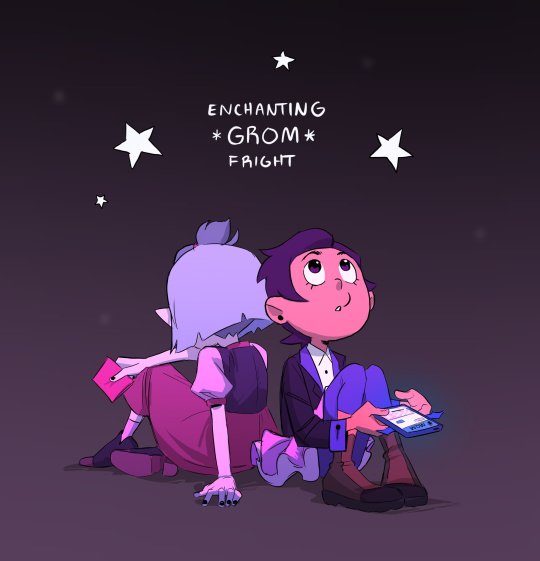
The cold open starts with Luz trying to find more glyphs in her off time. I thinks it really shows her development so far. Now she’s willing to do the work to figure out her kind of magic, as oppose to say episode two where she just wanted to be great because she was “chosen.”
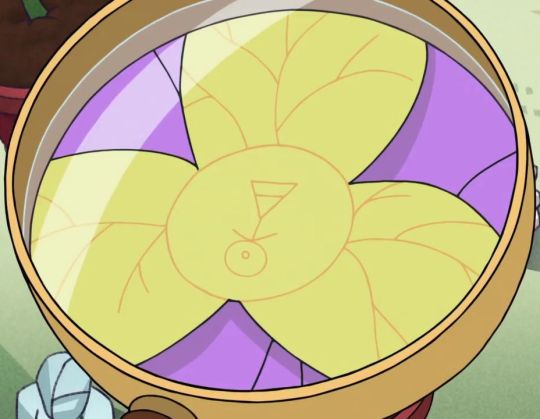
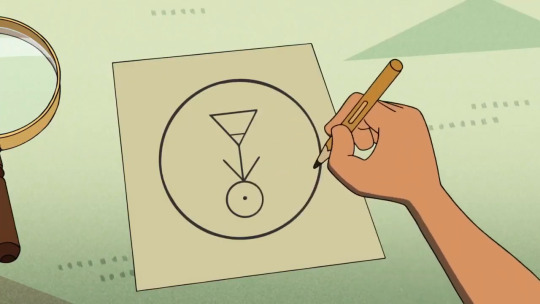
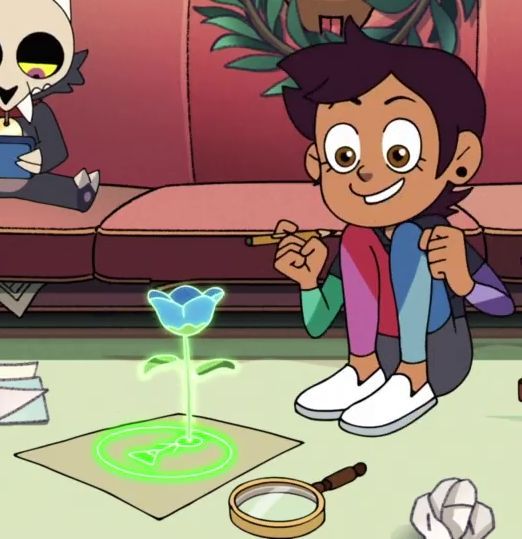
“My glyph skills are blossoming”
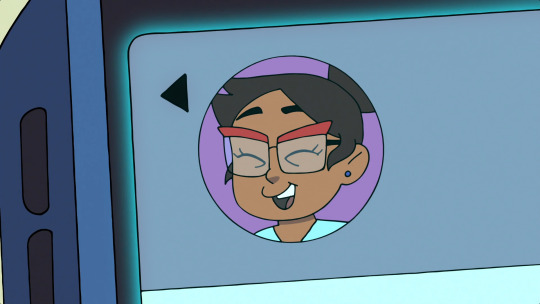
But then reality ensues...
Using the portal to let the wifi signal into The Owl House is not the dumbest reason I’ve heard to open an interdimensional portal between worlds but it is one of the most mundane. SOMEHOW, Luz can still receive texts from her mom FROM ANOTHER WORLD. Not that it makes too much of a difference since Luz barely answers them.
As much fun as it is to focus on the magic and the shipping and the friendship and the curse, Luz still knows that she’s still lying to her mom. The guilt is there, but luckily being a main character keeps her too busy to think about it.
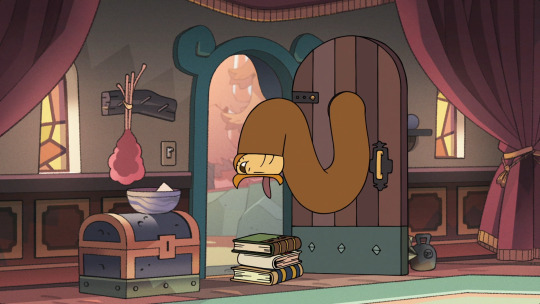
“Luz, time to fill that darling head of yours with...huuh huuh huuh HAKKK, mmm, mmm, mmh, delicious knowledge.”
Never change, Hooty.
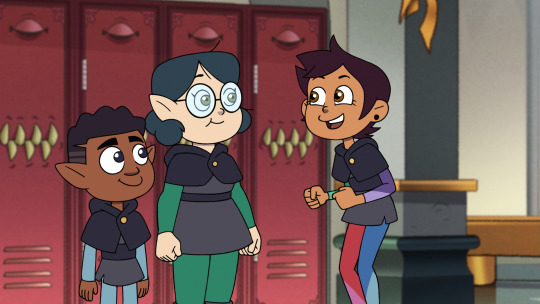
It’s that time of year again that Luz doesn’t know about yet, Grom: The Boiling Isles’ weird version of prom. Every fantasy world has one.
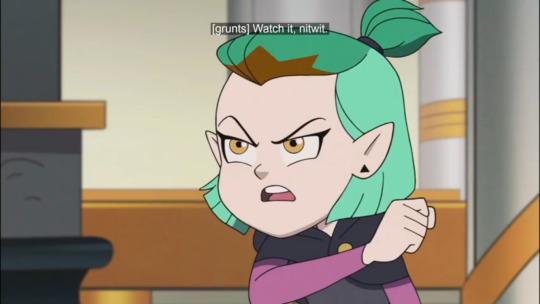
*hiss*
Amity bumps into Luz, and I know this is going to sound weird, but I really like Amity’s “Watch it, nitwit.” Amity’s character has changed and developed from our perspective which is the perspective of Luz and The Owl House fam. But she’s not a completely different character. Amity still has a bit of a temper and gets agitated easily. It makes sense to me and I’m glad I haven’t found anyone be like “Hey if Amity is nicer, why did she get mad when she bumped into someone?”
Amity is nicer to Luz and co. because she’s gotten to know Luz and co. You don’t treat everyone in your life the same. Amity is one of those people that you need to defrost with first. Belief is backed up by experience and so are people’s personas. (Not that persona. I’m being serious here.) Because of Amity’s experiences, she’s believed that in order to survive she has to put people at arm’s length, then when she gets to know you, she’ll decide if she wants to let you in or not. So I guess that means that based on her interactions with Luz, Amity has decided...
You know what? I’ll save that for my Lumity meta.
The popular theory is that Amity was going to put her note in Luz’s locker, hence why she bumped into them. But actually seeing Luz and being announced as grom queen probably made her lose her nerve.
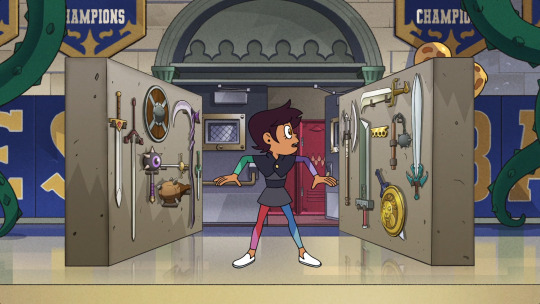
“Embrace your dreams...”
Amity is announced to be this year’s grom queen. Luz is happy for her before Amity runs in shock and embarrassment. Okay.
Luz discovers the gym’s weapons cache (not a thing I thought I would ever type) and Amity explains grom. Since Luz is from the human world and all that.
Grom is a monster that lives under the school and needs to be defeated every year so it doesn’t invade the town. It’s a classic shape-shifting fear monster. Odd are I have (and so have you) at least seen three or four of these in our lives already. Amity doesn’t want to show the entire school her greatest fear, especially since she already knows what it is. Luz suggest talking to Bump and Amity says she’ll try.
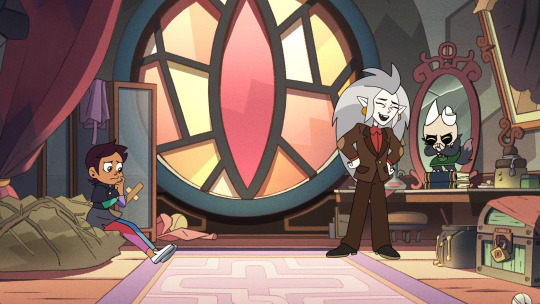
Another scene of Eda and King laughing and mocking Luz. Because I liked it so much the first time.
Eda gets dressed up herself because she’s volunteered to chaperone grom. Luz tells her that Amity is grom queen but wishes that she could take her place. We get...you know and Luz walks off.
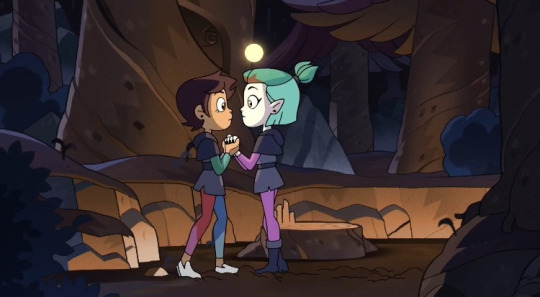
“I think we should kiss to ease the tension.”
Luz randomly meets up with Amity in the woods because I guess Amity had the same idea to take a walk to clear her head. Whatever. Amity tells Luz that Bump wasn’t going to change his mind unless Amity found a replacement. Luz volunteers because...she’s Luz, friend to all.
Except maybe that spider.
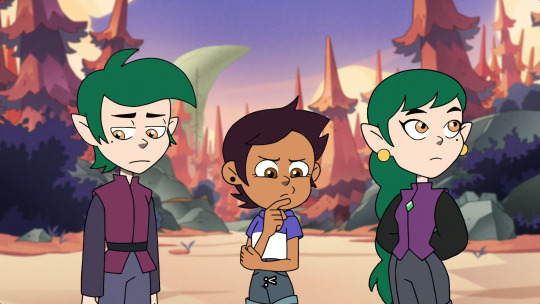
Top 10 Anime Betrayals
The Blight Siblings try to help Luz train against grom only for Eda to find out about their little plan. Here’s where we find out why Eda volunteered to chaperone a Hexside event even though she hates that place:
“What’s the fun in watching a kid get eaten by a monster if it’s my kid?”
That’s hilarious. To me.
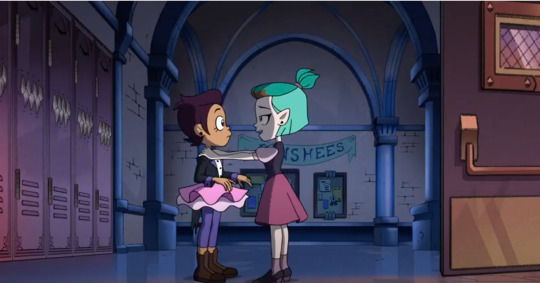
Luz and Amity have a moment before Luz’s debut and Amity thanks Luz for everything she’s done. They have more adorable banter before Luz takes the stage.
“Wish me luck.”
“Luck.”
I’m guessing that’s not an expression in The Boiling Isles.

Luz faces Grom and it seems to be going better than everyone predicted until...you know
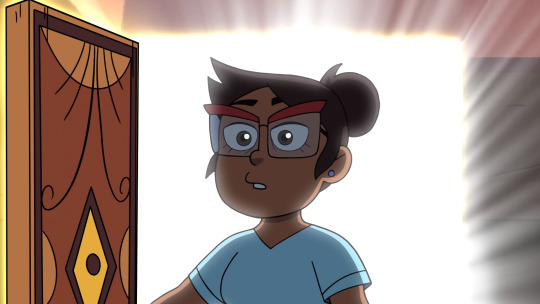
“Mija, this would be such a good shot for the trailer.”
Yup, we all predicted this. Luz’s greatest fear is her mom finding out that she’s been lying to her. Luz panics and takes off with Eda and Amity to chase after her.
Eda comes in for the save when Amity bursts in the scene saying “Boy let me tell you what.” She doesn’t really I just like saying that. You know, in my head. I mean, if you heard the way I was saying it out loud you’d probably think it was funny too but you know...text.
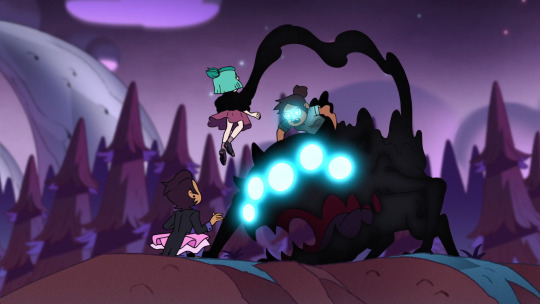
Grom gets a hold of Amity and transforms into her greatest fear. And we see why Amity didn’t want to face Grom in front of the whole school. She didn’t want everyone to see that Amity’s fear is very...emotional. Not physical. She’s not afraid of a giant spider or anything. It’s a little closer to the heart.

Amity clutching at her dress like a little kid is both the cutest and the saddest thing. This fear of hers is so bad it makes this fourteen year old feel like she’s four. I’m so sure she was about to cry right there. Or maybe that’s me. Could be both.
Luz picks up the note and discovers that Amity was trying to ask somebody out before she was announced as grom queen. Amity was afraid of being rejected. Luz tries to ease her fears by asking her out to grom.
Trying seeing it from Luz’s point of view. She has no idea who Amity wants to ask out. Luz doesn’t even consider that it could be her because again, belief is backed by experience. Luz was considered a weirdo with no friends in the human world. She even said earlier in the episode that she got kicked out of her last school dance for dressing like an otter. Luz has no reason to believe that someone would like her romantically. She would like to. It is a fantasy of hers, but her experience tells her that other people don’t see her that way so she doesn’t consider that Amity wanted to ask Luz out.
I’ll save the rest for another blog post, although I did talk about this last year too.
But since Amity did want to ask Luz out and Luz asked her out instead, Amity’s fears are eased. Grom does what every fear monster does when their target overcomes their fears and says “Screw it, I’m just going to kick your ass!”
And then this happens:
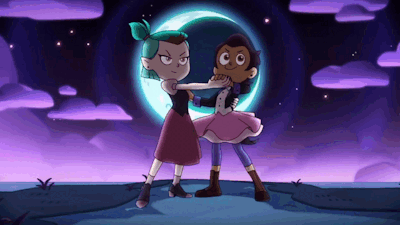
As a Star vs the Forces of Evil fan, let me just say this is our Blood Moon Ball moment. The moment that the show tells the audience in John Oliver’s voice, “Yup this is the ship we’re doing so strap in folks.”
Luz and Amity work together to combine magic to take down Grom. It also helps that they eased each others’ fears. Luz can’t think about her mom if she’s focused on helping Amity.
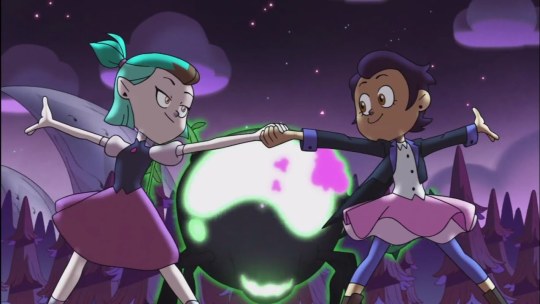
Luz and Amity defeat Grom in a blaze of glory. Luz being Luz, decides to ask Amity who she wanted to ask out just to see if she would tell you. Amity brushes it off.

“It doesn’t matter. After all, I already got to dance with the girl I like.”
Everyone celebrates but when Luz gets home she’s more tired than anything.
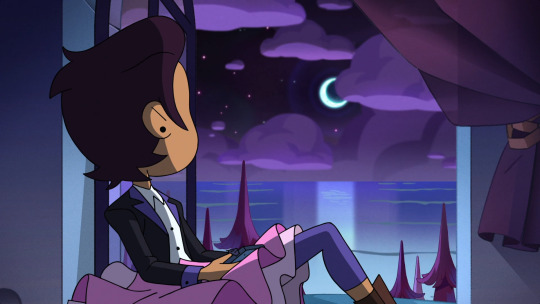

Maybe it was Grom, but Luz decides to give her mom a real answer. It’s been tough but it’s also been fun. There are good and bad days. Sometimes she feels like she doesn’t belong. But she has friends. They care about her, she cares about them, and that’s more than enough reason to stay.
THEN THIS SHIT HAPPENS!
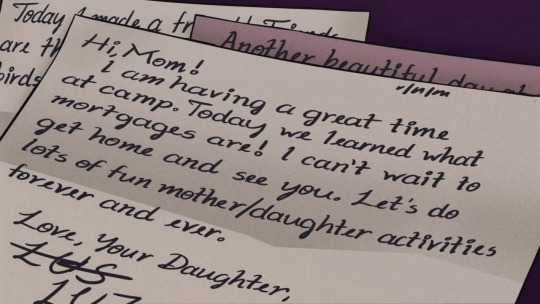
Yeah, the Meteora moment in Star vs the Forces of Evil. The moment where the show went “Never mind that shit. Here comes a complete change in the status quo.”
Someone or something is sending Luz’s mom letters. It’s Luz’s handwriting, but it’s clearly not Luz since she can’t spell her name right. Season one already finished and we still have no idea what this is.
I was all happy a second ago. Now I’m nervous as all hell. It’s a madhouse I tells ya. A madhouse!
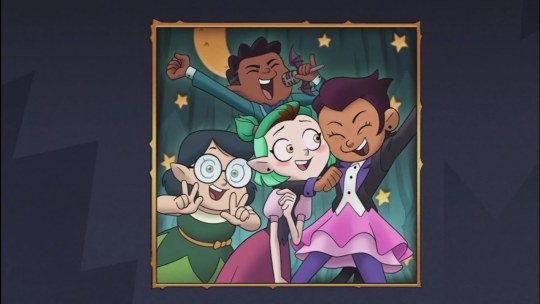
FINAL SCORE: 5 - LOVED IT!
Wow. Just wow. This episode had everything. Jokes, plot, romance, character development, cameos, dancing, girls, MOM(?), crashing on your couch because technically I’m homeless.

I shipped Lumity before this, but this was the episode that told me that yes it was going to happen. We’re all in.
But it’s not perfect.
Yeah, did any of you noticed that I didn’t even mention the B-plot? I’m going to be honest. The reason is...
I hate it.
I hate the B-plot so much that I skip it every time I watch this episode. I still don’t think Gus is that funny or interesting. Hell, Skara’s mini plot with her date and/or boyfriend was funnier.
But everything else about the episode more than outshines the B-plot so I still give it a five.
Next time we finish up the lumity trilogy next time.

Dammit I said next time twice.
128 notes
·
View notes
Text
the official ranking of RA photoshoot outfits (pt. 1)
as @dykethorin said when I first proposed doing this particular ranking, “Some real Decisions™️ were made” with these shoots y’all
all photoshoot outfits (for part one) under the cut
the official ranking of Daniel Miller outfits here
the official ranking of Adam Price outfits here
the official ranking of Claude Becker outfits here
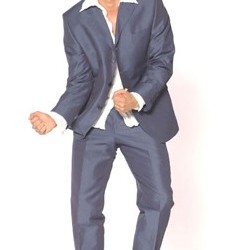
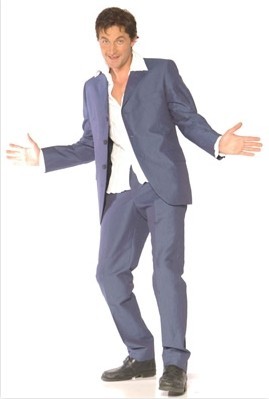
guys, I’m crying with laughter
hey quick question: what the fuck was this photoshoot??? (and also I need current RA in these poses)
it’s real nice to see a fun, loosey-goosey RA (before he established himself in the broody-character archetype) but there are so many questionable fashion choices here
when I started this list I had two options:
1) allow some leeway to the older photoshoots because, let’s be real, the early 2000s were an atrocious time for fashion that a lot of us would most rather forget we participated in
2) judge them by today’s standards, which is harsh but some of these outfits deserve it
naturally, I chose option #2
It’s so hard to even pick where to start. the too-loose pants? the ill-fitting suit jacket? The untucked dress shirt that is for some god-forsaken reason undone in two separate directions??
I have chosen one thing that sums the outfit up as a whole: what monster decided to put the shirt collar over the suit jacket????
the jazz hands scream “hey I’m a FUN guy” but the suit screams “I’m the yo-pro asshole at the office who is so unreliable you’re pretty sure some nepotism must surely have had an influence during the hiring process”
I originally said ‘I guess we should be glad there’s no surfer necklace’ but then I had the horrifying realisation that it’s a 50/50 shot as to whether that would improve this outfit or make it worse. and you know when there’s even slimmest chance a surfer necklace could improve an outfit somehow that it’s time to take a good hard look at yourself
1/10 just because this photoshoot made me genuinely laugh out loud
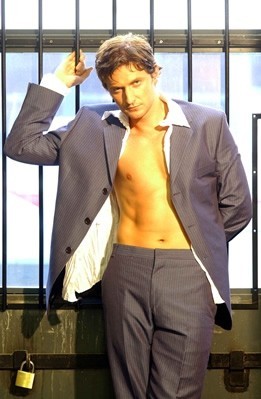
wait I’m sorry, what-
how on god’s green earth is this the same photoshoot (?) as guys, I’m crying with laughter????
the great thing about these lists is that you are getting my genuine reactions as I progress down the images. I had no idea this was the same photoshoot (?) until approximately 10 seconds after writing guys, I’m crying with laughter
this perfectly encapsulates the duality of man – one moment it’s all goofy jazz hands and the next it’s a hunk-of-the-week moment
this man and guys, I’m crying with laughter are the equivalent of looking at pictures of yourself in high school vs. in your 20s/30s/at your prime. the whiplash is insane
and why is he in front of barred windows?? it appears they were afraid of what would happen if this hunk escaped into the general population
I still can’t believe they kept the collar over the suit jacket though
I’m so conflicted guys, the urge to numerically rank this terrible outfit is strong but uh… as per usual shirtless ones aren’t fair/10
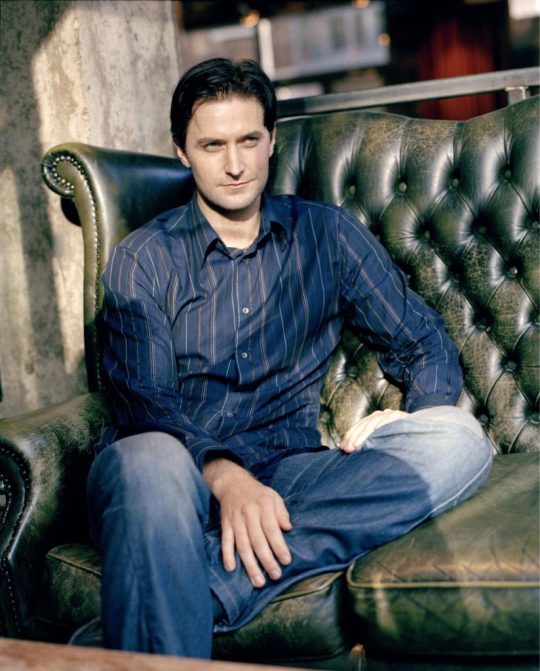
revenge of the killer surfer necklace
do you ever look back at a specific moment in time and are so thankful that someone took one tiny action? one small thing they did in the heat of the moment that probably seemed innocuous at the time but had far-reaching consequences? for example, it might something as simple as deciding to take a umbrella on a bright sunny day only for it to be extremely useful on the way home when the weather turns
this is how I feel about the person who decided RA could leave that top button closed for this shoot
if you squint, you can see the surfer necklace under that top button. and thank god you have to squint
this is such an early 2000s look though. that shirt by itself is fine and would actually look killer with a properly fitted suit nowadays. it’s the shirt dress and loose denim look with makes no sense to me
2/10 for a pretty uninspiring early 2000s outfit
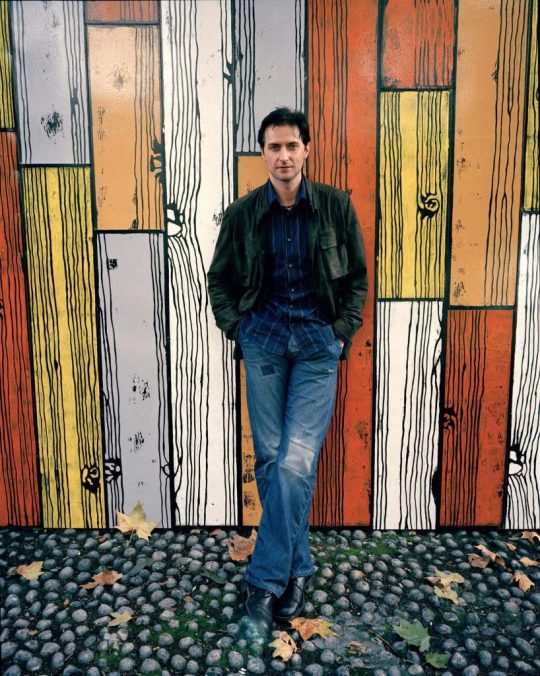
revenge of the uh…
from the same shoot as revenge of the killer surfer necklace this loses .1 of a mark for adding a jacket, while pretty innocuous, to an already busy outfit
1.9/10

were we really that afraid of legs?
why were we, as a society, so obsessed with loose, ill-fitting pants? why were we so desperate to conceal legs from the general population? what secrets were we trying to hide? I understand the comfort factor on the hand, but on the other did anyone actually have eyes
the sneakers/suit combo I can definitely live with. but those pants (that I’m convinced must be pyjama pants in another life) turns it all into a sloppy, blurry mess
2.7/10
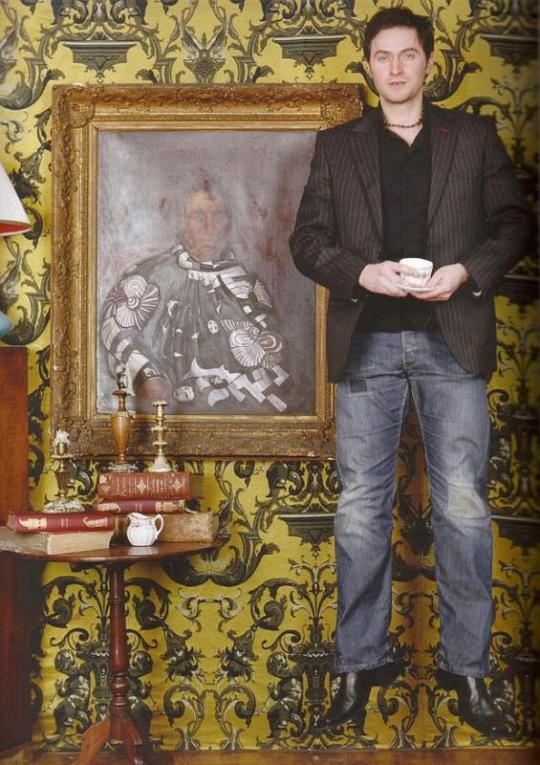
is it a bird? is it a plane? no, it’s… a floating RA?
what is it about photoshoots in the early 2000s where they just make no damn sense. it’s my opinion that the theme/concept of a shoot should not overshadow the subject, and that’s the correct opinion (as well as being the exact opposite as to what’s happening here)
maybe there was a hint or reason as to why floating wizard RA exists in the article that this shoot presumably came with, but I don’t get it. clearly I’m far too literal of a person and need to embrace my inner artist
looks pretty, still weird
moving on the entire point of this post, the outfit, I uh,… oh god
I’m pretty sure this the same (and similar, if not) outfit RA wore in the North & South behind-the-scenes, and how we as a society went from John Thornton’s stiff collar and top hat to this is amazing
maybe we were so obsessed with period dramas back then because it was a nice alternative to indulge our eyes in when we had to face the harsh, cold reality of modern fashion at the time
anyway – trust me, while I am all for a man in a necklace, let’s pray surfer necklaces never come back 2.9/10
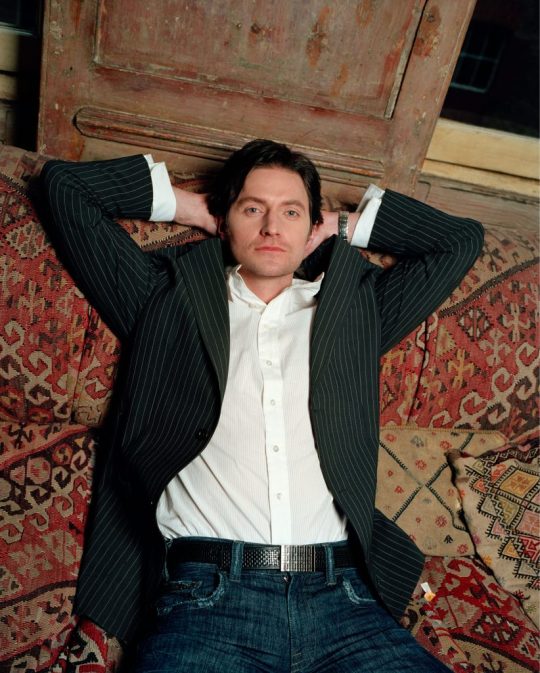
I genuinely was looking up “pinstriped jacket jokes” because I couldn’t think of anything off the top of my head but then I realised I don’t need a joke here because pinstriped jackets are a joke all by themselves
I feel like there may be a situation where pinstriped suit jackets might grow on me, but this is not that situation
also I don’t really know where I stand on the belt, but I certainly think I’m leaning towards the ‘why’ part of the scale. if you’re gonna make a belt that prominent in a photoshoot, at least make it a fun belt
3/10
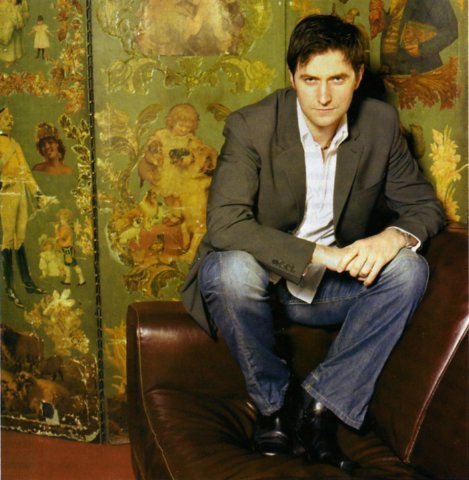
I’m noticing a trend in these photoshoots and it’s these horrific backgrounds
I will admit that the non-patterned suit jacket is going with the jeans a lot better here. but now that my attention isn’t focused on that, all I can see are the dress shoes. WHY DID YOU PUT DRESS SHOES WITH STRAIGHT-LEGGED JEANS???
please someone I am begging you, can we as a society get to tapered jeans already
3.3/10
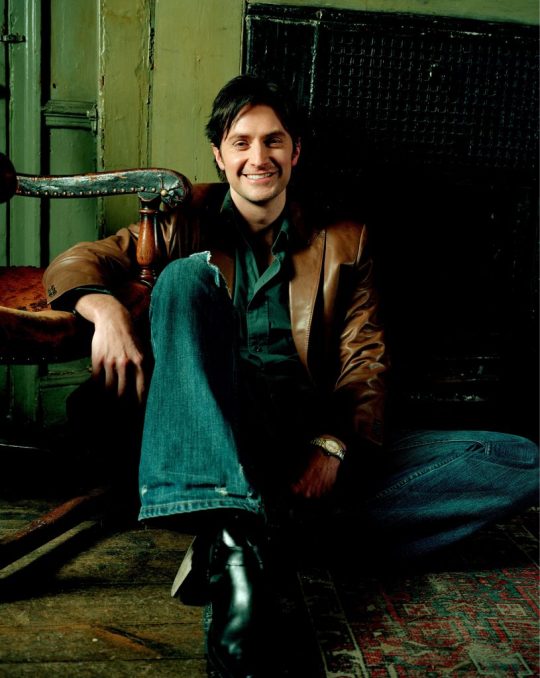
did RA genuinely ever get put into any clothes that actually fitted him properly at this point in time?
look, I know I’ve been picking on the bootcut jeans & loose attire that plagued us in the early 2000s (or 2006, to be specific to this photoshoot). what can I say, it’s the low-hanging fruit. or loose-hanging, as the case may be
I do appreciate that rich brown leather jacket and that smile. but that’s where it stops. someone take dress shirts and dress shoes away from bootcut denim PLEASE
3.5/10
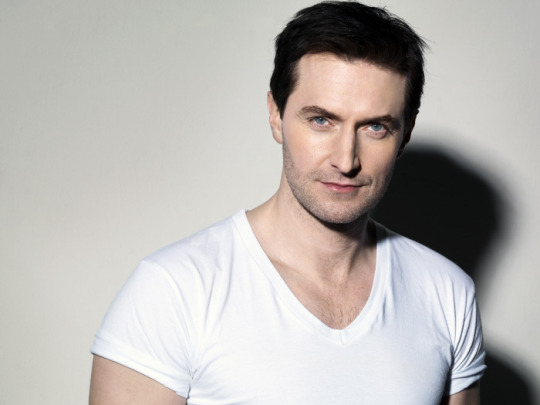
this is the bad-boy from your hometown in every rom-com ever
as with well this in an interesting development that I can’t say I disapprove of below, the lower rating is simply because from what we can see, it’s just a plain shirt. however, that dipped v-neck? mm-mmm
look at that smirk. this man knows what he’s doing to us, dammit.
why do you persist in hurting us this way 4/10
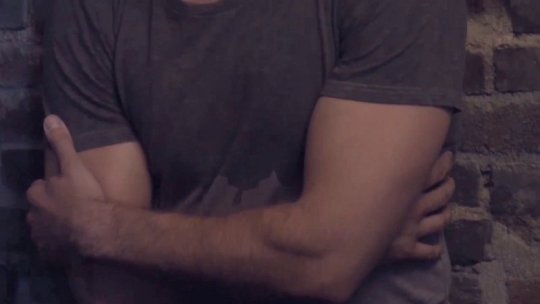
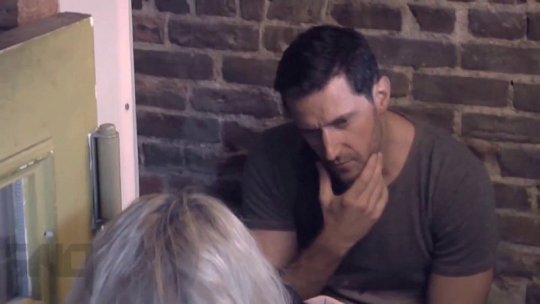
well this in an interesting development that I can’t say I disapprove of
god bless the person who said we need this shirt wet and clinging and only half-soaked
I’m so sad that I have to give this such a low ranking because uh… we’ve established I have a weakness for those biceps
this does also get bonus points for the creativity of “only this portion of your shirt needs to be wet for your close-up” but at the end of the day it is a solitary grey t-shirt even if it is floating in an attractive sea of muscles
4.5/10
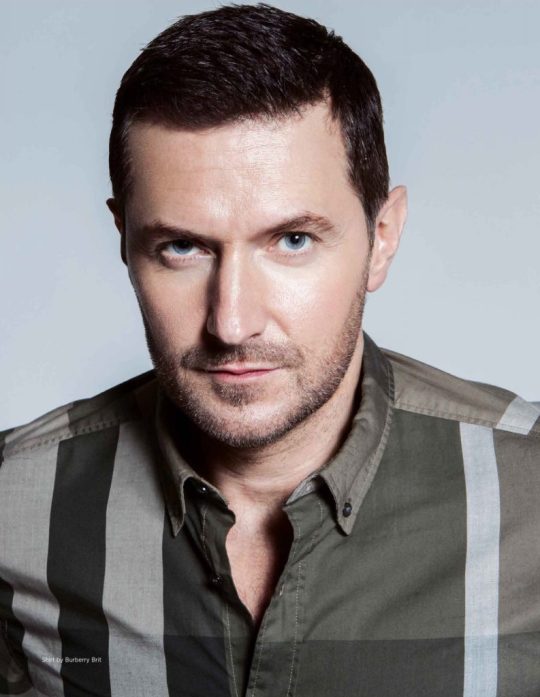
the photographer really said ‘who gives a crap about the clothes’, huh?
an interesting shirt! but as much as I love RA’s face, we should be able to see more of the shirt (and the outfit) because uh… it’s hard to make a judgement call on a photoshoot outfit without that
also, it’s just so hard to concentrate on some of these with RA staring into my soul like that
*sigh* 4.6/10
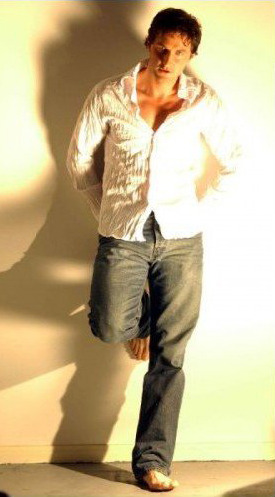
hello sir, are you as kinky as your shirt?
this is one of the few occasions on which I will give the bootleg baggy jeans a pass. interesting choice to go shoeless for all outfits in this shoot – but the way the shirt is all crumpled is annoying me an incessant amount. I am begging you, someone pass this stylist an ironing board PLEASE
4.7/10 for a crinkle-cut RA
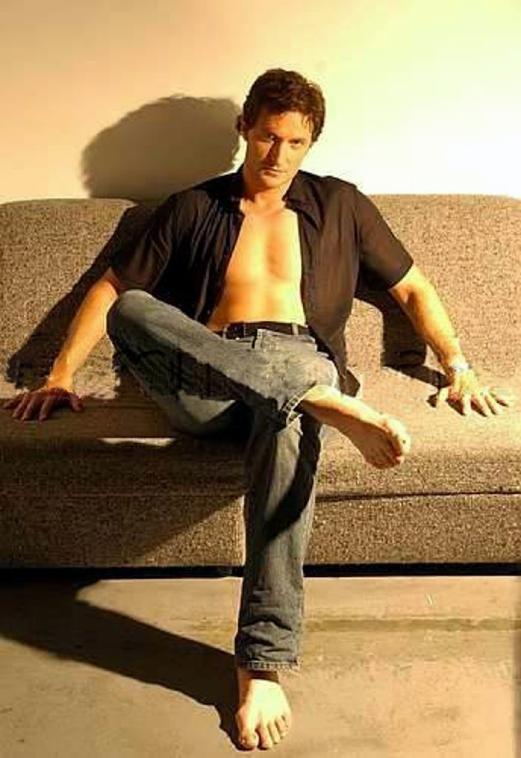
all that’s missing is the beer cans
I’m not sure of the short sleeves here. I think with the shirt open as well my brain doesn’t know where to look
HOWEVER, this is an RA from the early 2000s that I can get behind – largely because he’s not drowning in his denim
the nice, plain belt which matches with the shirt? excellent
interesting choice to go with the bare feet – this entire look (and the quality of that concrete floor) screams ‘we’re chilling at a summer party in your parent’s basement in the early 2000s’ if not for one thing – that couch is way too nice looking. am I being too pedantic about this? no. If you’re gonna go for the whole basement party look, you need a couch that’s falling apart and has at least one questionable stain on it
that being said, I would hang out in this man’s basement
it’s a shirtless one so once again, I cannot give a numerical answer/10
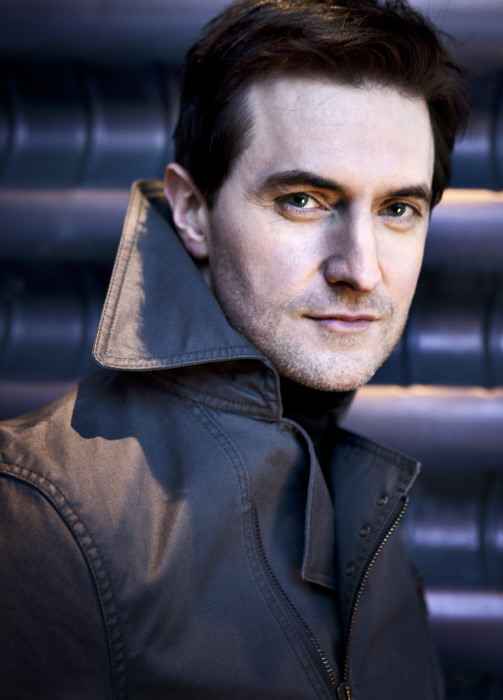
I’m not sure if this man is dangerous or is just an idiot
they may have been wanting RA to embrace his inner Daniel Miller here but that is NOT a jacket that should have its collar popped or if it is, it definitely should not be popped that much. just turn the intensity of that pop down by… at least 35%
this look is telling me to embrace my inner lacy, ruffled collar that men in England used to wear around the 1500 - 1600s. I hate it and refute it with every part of my soul
this is what happens when you embrace your inner Daniel a little bit too much 5.6/10
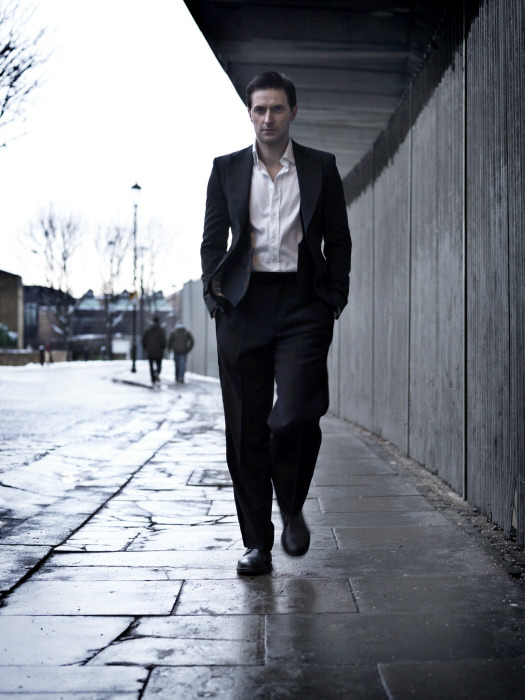
the return of the leg monster
not much to say about this except once again we are terrified to put RA’s legs into well-fitted pants. what secrets are hiding underneath those voluminous billows? will we ever know?
5.8/10
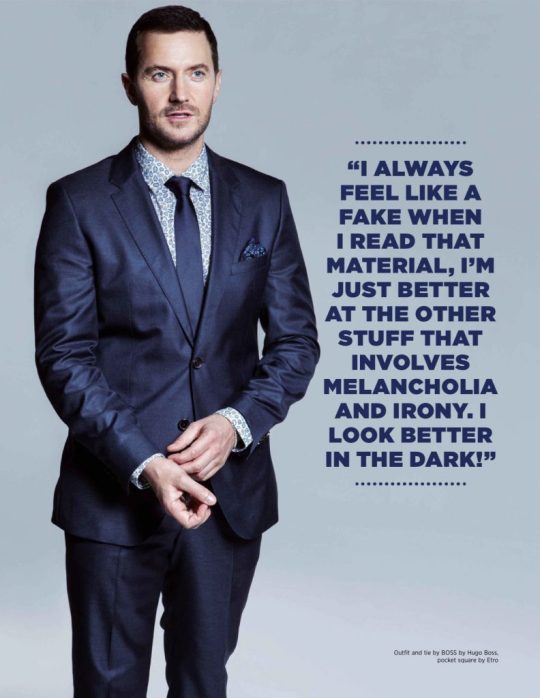
the one that crushed my hopes and dreams and then spat on my corpse
so I admit it, I got really excited because I thought that this was a leopard print shirt and I was like “this is something I did NOT know that I needed until right now”, even if I would argue that it could have been nice in a little bit of a brighter colour. no matter, I thought it was a nice subtle addition to this plain suit and was just very excited at the prospect of RA rocking leopard print even though I almost always hate leopard print in single every form it comes in
and then. upon zooming. a disappointing paisley. sorry, paisley lovers. I hate it
I would also argue here that the pocket square would have been nice in a plain, bright colour rather than another patterned item thrown into the mix. come on stylists, stop letting me down with your pocket squares
also if there is a point where a suit can be too shiny, I think we’ve found it. I could wax floors with that fabric and I’d rather be thinking about RA’s talent & good looks rather than imagining him being used as a human mop
the hand porn is uh… strong with this one 6/10
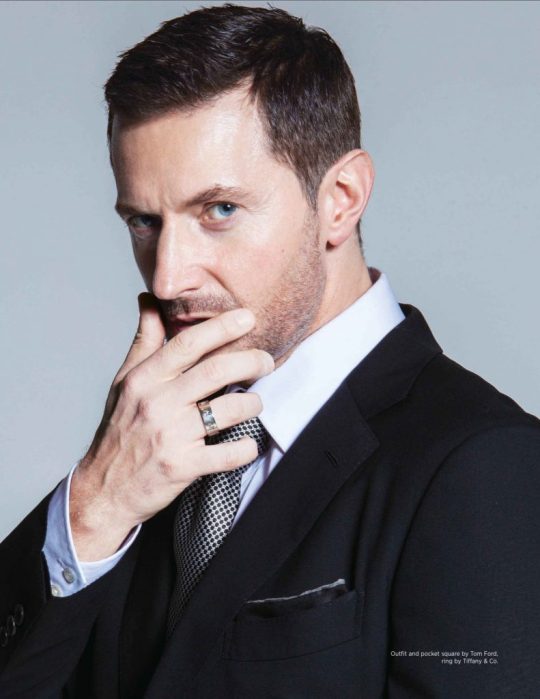
the hand porn one
the ring is a nice subtle touch but I can’t decide where I stand on this tie. for me, the checks are just a *wee* tad too small. so small that it I’m scared it will turn into one of those optical illusions with a number in it if I stare at it the tie for too long
the pocket square could also have not tried so hard to blend in with the rest of the suit jacket. give me some colour, baby!
Richard really needs to put his hand down so I can actually concentrate on the clothes 6.5/10

I’m just dotty for this one (I’m so sorry y’all)
so suave. so shiny. I wanna stroke that fabric so bad, it looks so soft
the dots bring a nice yet understated touch to a monotone outfit and GOOD LORD those thighs
they just had to pose him like this to torture us, I’m convinced. also they call him a “commanding gentleman” in the subtitle which is really just unnecessary to verbalise when he’s sitting like this
Someone put me in a rom-com with this man 7.2/10
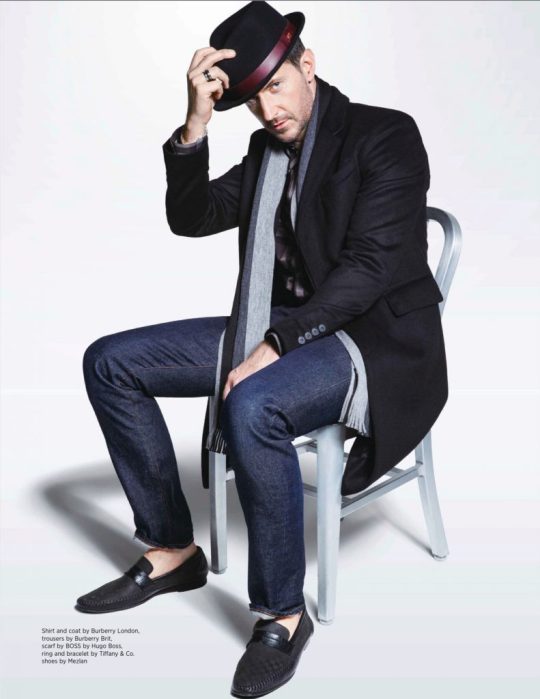
the modern magician (at least he ain’t floating this time)
I know that the hat should be the focus of this shoot but I can’t get over those shoes
tangentially related, I have never understood why they make men’s dress shoes so excessively long and pointed. these certainly aren’t a good example of this but uh… I don’t understand why men’s dress shoes are clown shoes
I think part of what’s throwing me off is the sockless look. normally I can handle (and even love) it with some shoes but there’s something about the hem of those jeans and those shoes that turn them into slippers when worn sockless
I love the two-tone scarf but what really excites me is the plaid shirt that we can barely see. I’m eternally sad that they had RA hid it in this pose. and also, come one. you could’ve at least gotten a chair with an actual back to it. that can’t be good for his back at all
the one bonus of this outfit is the hat because when do we ever get RA in hats?? and hats that aren’t baseball caps?? a nice, rare touch. but also one which hides most of that face so…
can we talk about the fact that my gut tells me those jean cuffs have been deliberately turned up at the front and all I want in life is to reach into this image and flip them down 7.5/10
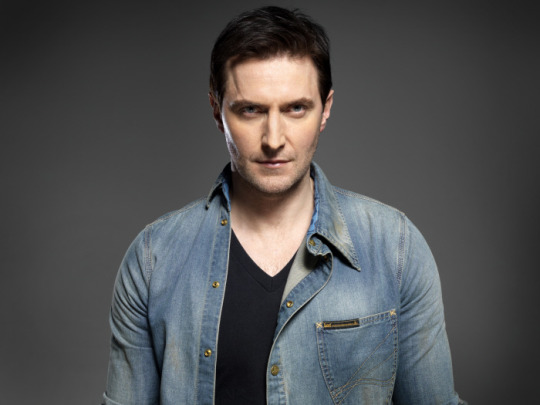
*pterodactyl noises*
holy macaroni. that demin shirt. and this shirt’s even a nice lighter denim colour??? and the v-neck?? SIR
I know he’s worn some faux-denim shirts in the last few years (see: Uncle Vanya rehearsal pics) but as outerwear? knocked it out of the park in this one
also I know this is a shirt not a jacket, but this shirt made me think about how I never realised how much I needed RA in jean jackets until today
It could be argued that a nice crew neck cut would work slightly better than the v-neck but that’s really a personal choice
a lovely respite for my weary eyes 7.7/10
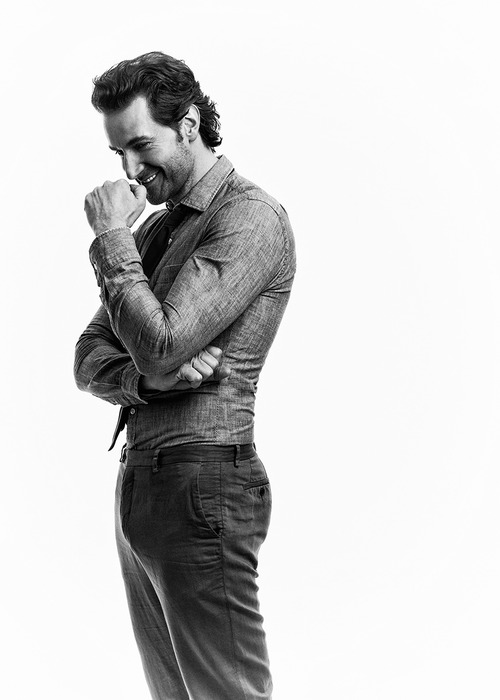
a truly, truly blessed image. the sort of image that would bring you endless good luck
I know I’ve given a lot of pants crap on this list but these. these are the ones. these are doing the lord’s work for sure. and god bless the person who decided to shoot from this particular side angle.
and then the shirt?? I’m honestly afraid it may rip if he moves. I could leave or take the tie though. it’s not adding a whole lot to this outfit and I would much rather that shirt be uh… open at the top for a glimpse of uh… well. you know.
this RA outfit laughs in the face of all those early 2000s RA outfits 8.1/10
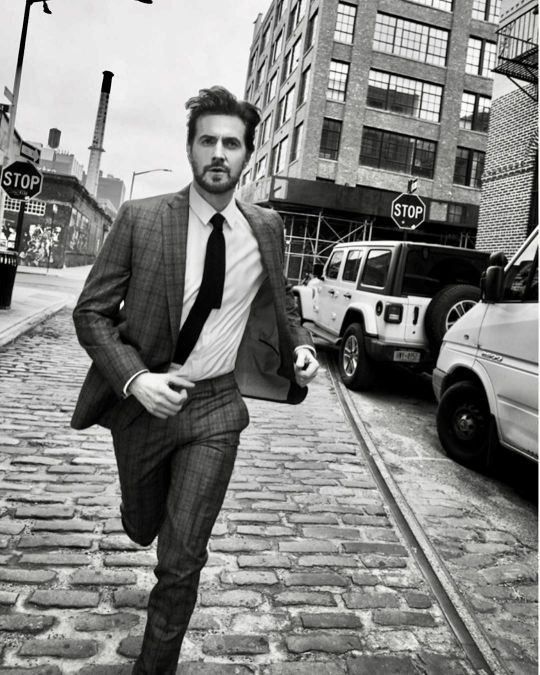
me running to open my phone every time an RA-related notification pops up
my only sadness is that this shoot was in black & white. we need more action-shot RA shoots!
also the subtle plaid?? *chef’s kiss*
well, I said ‘my only sadness’ but is it also me or are both ends of that tie strangely square? that is throwing me off from an otherwise spectacular photoshoot outfit, I won’t lie
8.5/10 for a man of action
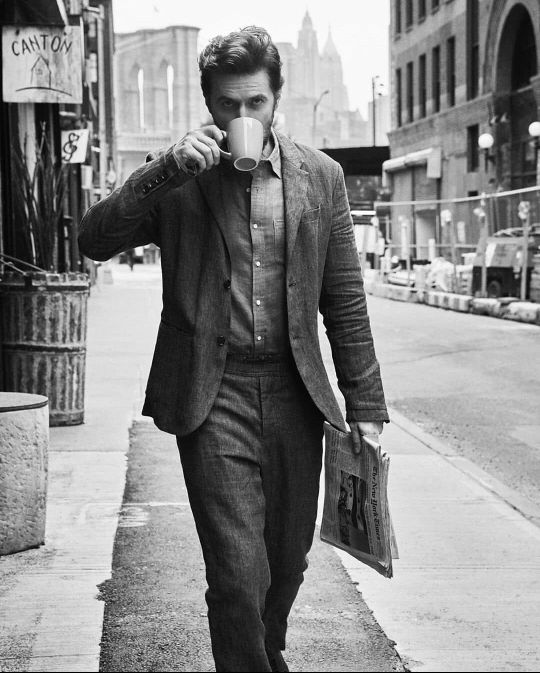
this is what we all like to think we look on the way to work. hate to break it to ya - we don’t
god, that wind-ruffled hair. the rustic look provided by both the suit material & the photo editing. that stare over the top of that coffee mug. the casual ‘I just picked up the paper on my way out this morning’
words fail me
would it be weird if I said I would pay money to be able to run my hands through anyone’s hair that looks as soft and wind-swept as that 8.9/10
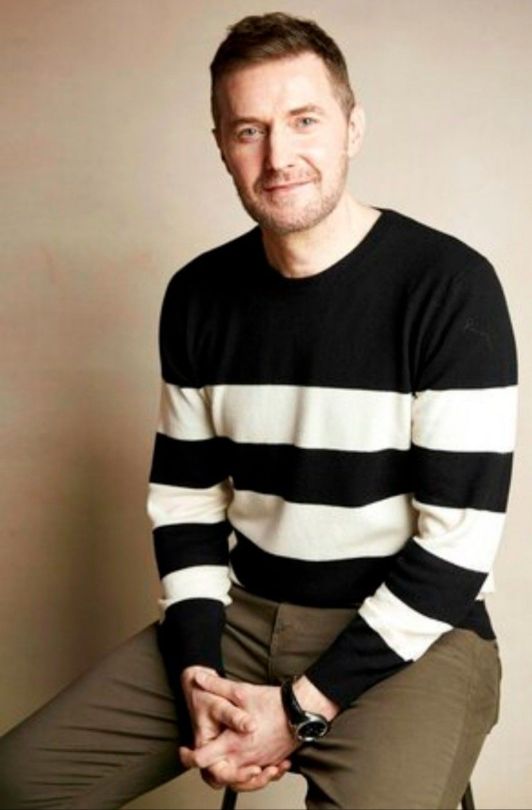
the comfiest RA
I love. love. love this outfit, especially the sweater. the pant colour goes extremely well with this one and I’m so glad they didn’t just stick him in jeans. the is the softest, comfiest RA and I love it. this is an RA who you can simultaneously share a beer and takeaway with at home, cuddling up on the sofa while you watch a film, as well as an RA who will take you out to eat fancy pasta at an upscale restaurant.
the choice of sitting on a stool is also great. my only real gripe here is the watch (and even that’s a minor one, really). the watch isn’t THAT bad, but it’s chunky face reminds me slightly of the watches boys in my class would wear in middle school. the watch could be a *wee wee tad* slicker, but really, I’m nitpicking here (and this is the only time I will admit to it)
the more I look at it, the more this becomes one of my fav RA pics. the slight smile. the relaxed pose. the hint of hand porn
weirdly, for some reason this picture gives me the exact same comfy and ‘just chilling out’ feeling as when I hear the song “Kiss Me” by Sixpence None the Richer 9.5/10
#richard armitage#yes this is a multi-part one because uh... there's a lot of photoshoots guys#also yes most of the early 2000s ones ended up at the bottom and I refuse to apologise for that
34 notes
·
View notes
Photo
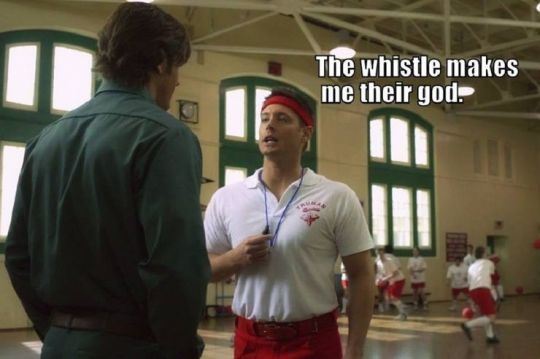
Heyoooo, it’s another episode of Holy Hell! This one is dedicated to the manchild himself, Dean Winchester.
Apple | Google | Spotify | Instagram | Patreon
Transcript below!
CW: discussions of child abuse, child death, suicide, alcoholism, family trauma, mental health
[Music]
Dean Winchester is, in a word, my soulmate. I started kinning him when the show aired in Australia on Fox8 and I have not been the same since. From his devil-may-care attitude to his undying love for his family that pierces the veil of death to save the day, he really is the most. I have to say at the beginning that this episode of Holy Hell will not include discussions of Dean’s sexuality and gender. I’m saving that for its own episode, so stay tuned my pals.
What we know of Dean as he develops over the course of the first episode is: he’s been hunting, and hunting alone, he’s 26 years old, he drives a sweet ‘67 Impala, he wears an old leather jacket, he listens to 1980s metal, and he has an arsenal of weapons and supernatural fighting talismans in his trunk. He’s also a smartarse, one of his most endearing qualities. He gets defensive about their mother and her death, and he defends their father over and over. He’s a loyal son and brother. The impetus to bring Sam back into the hunting life, after Sam decided for good that he was going to leave, is to bring his fambily back together.
The quality that defines Dean Winchester is how much he loves he loves his fambily. In the first episode, he is so worried about his father that he recruits Sam to help look for him, even though Sam and Dean haven’t spoken in two years, and Sam ran away to college rather than continue to live with their father. He spends most of the first season defending their father, but when John comes back and starts arguing with Sam, Dean protects his brother from John. It’s one of the most significant examples of character growth Dean undergoes throughout the entire series, and it’s where his loyalty shifts from John to Sam.
In the episode of season 2, “Croatoan,” Dean decides not to shoot Sam when Sam contracts the Croatoan virus which turns people rabid and makes them kill. In the next episode, “Hunted”, Dean reveals that John told him to kill Sam if Dean couldn’t save him. But Dean doesn’t. He says that John begged Dean not to tell Sam, but it’s not John’s words that keep Dean silent. It’s his love for Sam and Sam’s wellbeing. And this brotherly love slash codependency is used by characters throughout the entire series, from the demons in season 1 to the literal character of God in season 15, to manipulate Dean and Sam. As many characters have pointed out, including Dean and Sam themselves, they are each other’s weak points.
At the end of season two, when Sam dies from a stab wound in his spine, Dean trades his own life for Sam’s. He makes a deal with a crossroads demon—his soul for Sam’s life—and subsequently dies and goes to hell at the end of season 3. Dean literally dies a gruesome death and spends forty years being tortured in hell because he couldn’t live without Sam. At the end of Season 8, Sam is dying from the effects of the trials, which he undergoes in order to close the gates of hell, and Dean convinces him to stop because, again, he can’t live without Sam. Sidenote: this is where I stopped being interested in their brotherly dynamic to the point of losing interest in the show. It became clear to me that the showrunners were more concerned with rehashing the same tired storylines between Sam and Dean than focus on characters who could expand the world and make the show better. In fact, they killed a lot of the interesting side characters in order to keep the show solely focused on the brothers. The exception to this is Castiel, and the reason they kept Cas around is because when he died in season 7 the ratings tanked. If that wasn’t a clear enough sign that the showrunners needed to open up the show to more than just Sam and Dean’s caustic dynamic in which they die and kill for and then betray and lie to each other over and over, then I just don’t know what the fans could have done to convince them. Nothing, apparently, because they ended the show with just Sam and Dean.
Dean’s relationship with John is fraught with insecurity and codependency. Dean has so little sense of self that what he does consider to be his carefully curated list of likes and dislikes were inherited directly from John: his car, his leather jacket, his hunting abilities, and his music taste. He also throws himself into hunts without any regard for his own safety, because he doesn’t believe that he is worth saving, or that his life is worth living. His personality is crafted from both John’s reliance on him as a son, hunter and partner in crime, and the woman he assumes Mary to be. Dean’s sense of self-worth relies on how many people he can save. This is why, in season 2 episode “What is and what should never be,” Dean’s dream reality is one in which he’s a low life loser who disappoints his family—because without John pushing him to be a hunter, Dean doesn’t save people, and because he doesn’t save people, he isn’t worth anything. Bear in mind that this is the best reality Dean’s mind could conjure for him: one in which his father is dead, and he himself is not worth saving.
In one of the most famous exchanges, he asks Cas why an angel would rescue him from hell, and Cas replies, “What’s the matter? You don’t think you deserve to be saved.” Twenty-nine years of bluster, insouciance, and a give-em-hell attitude crumbles in two sentences, wrought by a being Dean refuses to believe exists because, again, he doesn’t think that he deserves to be saved by them. He says, “[Why me? I don’t like getting singled out at birthday parties, let alone by God].” He thinks of himself so lowly that he accepted a one-year deal in exchange for Sam being alive. Dean cares so much about his family he lets it kill him.
But it’s not just Sam, Mary and John. Dean’s family grows to encompass a number of side characters: most notably Bobby their surrogate father, Charlie Bradbury the hacker, Claire Novak, Jack Kline, and Lisa and Ben Braeden. Even Mary makes another appearance in seasons 12 to 14. Unfortunately, because the show is the way it is, Dean puts Sam above all of these side characters, and then these characters are written out of the show. I should specify that Cas is not a side character; in most seasons, Misha Collins is billed as a main cast member, with his name appearing after Jensen Ackles in the credits. But he still dies in the third-last episode in order to have the show stay about the brothers. Even Jack, inarguably Cas and Dean’s son, is written out of the show in the second-last episode after dying multiple times. I say inarguably because I am not gonna argue with anyone about this. Claire and Jack are Dean and Cas’s kids. Dean and Cas are great parents who chaperone Jack’s prom and buy Claire her first hunting bow. They’re all one big happy, queer, neurodivergent family.
Dean loves the people in his life with reckless abandon. The times he’s excused Cas’s behaviour after Cas has done something ridiculous or foolish are too many to count. He grieves Cas’s multiple deaths, often succumbing to his alcoholism and entropy whenever Cas leaves him for more than a day. In a truly beautiful scene, Dean wraps Cas’s corpse in a curtain and watches, utterly and completely devastated, as his body burns. By this point, they have done so much for each other that it’s impossible to even envision the show without Cas, and indeed imagine Dean without his love for Cas. And we don’t have to for very long, as he always comes back a few episodes later. Even knowing this, the episodes where Dean mourns Cas are so heartbreaking and haunting that I cried for days after watching them.
Dean is great with kids, and every time he’s not is completely the fault of whoever is writing him in any given episode. We see him bonding with Lisa’s son Ben in season 3 and 6, Jesse in the season 5 episode “I Believe The Children Are Our Future,” and Lucas in the season one episode “Dead in the water”. With every child he meets, Dean gets on their level, empathising with them in a way most adults can’t. Like Claire and Jack, Dean has a complicated relationship with his father, who dies in the beginning of season 2 after bargaining his soul for Dean’s life to the demon that took their mother. Just like anyone else’s life, right? Must be Tuesday. This means Dean can relate to most children with traumatic backgrounds involving their parents, as a victim of parental abuse and having his mother die at age 4. I can’t find any sources to back this up, but a theory that rolled around in fandom was that Dean became mute after Mary died, which is what happens to Lucas after his father drowns. He says in “Dead In the Water” that he loves kids, and it’s true. As one tumblr user put it, Dean wanted to be baby trapped.
Dean carries the deaths and pain of his loved ones with him like Atlas carrying the world on his shoulders. When Claire is bitten by a werewolf, the characters administer blood of the sire wolf that bit her in order to cure her of her lycanthropy. Dean has to leave the room while she’s in pain, because he can’t bear to watch her die. The same goes for when Jack dies. Thankfully, Claire lives and Jack comes back a few episodes later.
When thinking about Dean being a father, I’m reminded of that scene from Scrubs when Dr Cox says he’s worried about being a father because his own dad was an abusive alcoholic. The difference between Dr Cox and Dean is that Dean doesn’t have his reservations about raising kids. He fits into Lisa and Ben’s life easily, at least for the first year, and we see a montage which includes him teaching Ben how to fix cars. When Claire lets her guard down enough to hug Dean, he hugs back just as hard. When he finally deals with the trauma of Cas dying in season 13, he accepts Jack into his life, and even grieves Jack when he dies. Dean escapes the intergenerational trauma that plagues his family by being a fantastic dad to the random kids who happen into his life by chance. He was born to be a father, and the fact that this show took that away from him and us as the audience makes me want to kick the showrunners into the sun.
Until season 6, Dean’s family only included men. The concept of the nuclear family—two sons, a husband and a wife—was ripped apart in the prologue of the first episode when Mary dies. Dean doesn’t know family for the first 5 seasons of the show outside Sam, John, Cas and Bobby. I do consider Ellen and Jo to be important to the story, but they’re only in a handful of episodes and die in season 5 for a reason that is plainly ridiculous. Did the Winchesters have to lose every single person in their lives to the fight? Clearly Kripke thought they were going to be cancelled after the fifth season, because it shows. And honestly? Maybe they should have. Let’s retroactively cancel the whole show. It can’t hold power over us anymore, because it’s dead and we cremated it.
But when Dean moves in with Lisa and Ben, he discovers a new type of family he didn’t have before, and new family dynamics. Instead of the 28-year-old son that Sam is to him, he takes the opportunity to teach Ben about cars and spend time with him and Lisa without the need to hunt. He gets a job, he makes some friends, and he lives the safe, apple pie life he begrudged Sam for in the pilot episode. It’s only when Sam reappears in his life that Dean’s codependency strikes again and he realises that he can’t live half in the normal world with Lisa and Ben and half in the hunting world with Sam. Sam says this himself in the first episode of Season 6, “Exile On Main Street”. Despite the ways Dean tried to settle down throughout the rest of the 9 seasons, the showrunners ultimately decided a man who was healing from trauma and alcoholism, who had adopted two kids as his own, and was learning how to bake cakes for his son’s birthday, deserved to die at the ripe age of 40, a week or so after he’d learned that his best friend was in love with him. You gotta laugh. Instead of getting the ending both Dean and we deserved—which was Dean settling down, opening a bar, and living the next forty years in relative gay peace while he got fat and watched Cheers reruns—well, we got something else. And I will always be bitter about that.
While it’s clear from the first season that he has reckless and suicidal tendencies, he doesn’t stop fighting to the bitter end. Even when faced with his own impending death in the season 2 premiere, “In my time of dying,” he fights to stay alive for Sam and John, while working the mystery that is overcoming his own death. Devastated as he is by Sam diving into hell at the end of season 5 and seemingly gone for good, Dean still gets up everyday and makes a life for himself in Lisa’s home. While season 6 was overall a bummer of a season, just god-awful in every aspect, saved from my complete vitriol only by “The French Mistake,” it did show us how great a dad Dean can be, and readied us for what was to come—being Claire and Jack’s dad. The lengths he goes to for his family are immense and all-consuming. As Cas says in “Despair”, Dean is a being of love. He loves everyone else, even when he can’t find it in him to love himself. He really thinks that he’s just a killer, not a father or a husband.
I’ve never subscribed to the idea that we have to love ourselves before we can love anyone else, or before anyone else can love us. Sorry Rupaul, you old bitch. We are all deserving of love, because love sustains us and helps us grow. And when we don’t know how to, it’s through loving others that we can learn to love ourselves. If Dean knew what a great father and friend and husband and brother he is, if he could see himself the way others, in the show and out of it, see him, I think he’d burst. You don’t like getting singled out at birthday parties? Well tough shit, Dean Winchester, because I’m gonna devote an entire podcast to you.
I talked about Dean’s carefully curated list of likes and dislikes before but I’ll go into more detail now. Things he likes: guns; rock and roll; nice cars; women; fighting; scamming people at pool; back alley blowjobs, probably; pie; driving across the country; Ozzy concerts; cowboy movies; being in control of every little thing in his life. His dislikes are: flying on planes; hair metal; angels and demons; anyone who harms his brother, his best friend or his kids; boredom; and being jerked around.
Okay I literally cannot talk about the cowboy movies without mentioning that he makes Cas watch them with him, in his Deancave, and the implications of that make my head roll off my body and into the dirt. Like they literally have gay little movie nights and watch their gay little cowboy movies together and Dean says all the gay little lines. I said I wasn’t going to talk about his sexuality, but mentioning cowboy movies leads to Cas wearing a cowboy hat and saying “I’m your Huckleberry.” This makes me insane. Excuse me, I must have my daily scream.
Okay, I’ve collected myself. Have I? Let’s just move on. In the Winchester tradition of inherited family trauma, Dean gets all of John’s interests, and Sam gets all of John’s mistakes. Dean’s personality throughout the show is basically quippy remarks, pop culture references, laughing with food in his mouth, and grouchiness. In case you haven’t realised, he is amazing to me. Every time he fires a rifle or pistol? Couldn’t be better. Eating a burger made of out donuts? Fucking incredible. Even when faced with beings with untold power, he doesn’t lose his cool. One of my favourite exchanges is when Zachariah comes to Chuck’s house in the first episode of season 5, “Sympathy For The Devil,” and starts soliloquising at him, Dean tells him to “cram it with walnuts, ugly.” Cram it with walnuts, ugly. It’s been ten years and that still makes me laugh. Top ten Dean lines for sure. Like all of my main characters throughout the years of writing original fiction are just “Dean Winchester but girl,” and I’m a good writer, but I can never come close to the level of hilarity that he achieves. And every single writer on the show seems to get that. The only times I can think of where Dean’s characterisation has irked me on a writing level are in season 6—basically the entire thing—and the way he treats Jack in the later seasons, specifically late season 15. But it’s really rare for me to watch an episode and not enjoy Dean. Even throughout the Mark Of Cain era, which I loved, when things were very serious, he had such style and panache and held himself so confidently that I was like, wait maybe he made some points? Maybe he should kill everyone?
Dean is a hunter and a killer, but that’s not all he is. He’s very skilled in hand to hand combat, weaponry, and tactical manoeuvres. Even when something doesn’t go exactly to plan, he’s usually able to improvise something to end up with a win. Because he is the main character, his choices and reactions, while sometimes extremely problematic, are never questioned, and that’s to his detriment. In the last episode of season 14, “Moriah,” Dean is unable to kill Jack, but in early season 15, he treats Jack’s betrayal as Cas’s fault, because he can’t take it out on Jack. Cas leaves, but it’s framed as a good thing because Cas is Jack’s father, and has to take responsibility for what Jack has done. In this instance, I don’t blame Cas at all. Okay I rarely blame Cas for anything, including the things he’s done wrong, because no he didn’t and you can’t prove it. But he especially didn’t do anything wrong when Jack killed Mary, and he didn’t do anything wrong by killing Belphagor. But by the middle of the season, in the episode “The Trap,” Dean admits his wrongdoing in taking his anger out on Cas, one of the only people who loves him without conditions. You’d think this would be a defining moment of character progression, but then Dean chooses to act exactly the same way by throwing Jack under the bus. Like, throwing him harder, under a bigger bus. So what was the point.
Anyway, those are choices the writers made, and not Dean.
Going back to what I was saying about being neurodivergent, Dean has adhd. I know this because I have adhd, and I’m Dean-coded. He’s wildly creative, impulsive, has a touch of OCD, and he has a hard time making long-lasting friends, although this is mostly due to how all his friends die. His best friend is an autistic angel and the only reason they’re still friends is because they’re obsessed with each other, in like a really unhealthy way. One of the funny things about his and Cas’s relationship is that every time you see them in the same shot, Cas is standing perfectly still and Dean is constantly moving. They are almost complete opposites, aside from their queerness and neurodivergence. But then, I haven’t met a single queer person in my entire life who isn’t neurodivergent or disabled in some way. That doesn’t mean we can’t live perfectly functional and normal lives, it just means we’re better than everyone else.
Dean also exhibits black and white thinking—to him all felons are redeemable and all monsters should be killed. Felons are redeemable because he himself is a felon, and monsters should be killed because they all do monstrous things. When faced with the possibility of angels being real, he refuses to believe it for the first two episodes, because, as he says, “he’s never seen one.” Eventually he learns how to see in shades of grey and not kill every monster he meets, but this is because of his time in purgatory with Benny, his Cajun vampire boyfriend.
Another sign of Dean’s ADHD is physical sensitivity. In the season one episode “Bugs,” he comments on the shower’s water pressure. Like it’s a big deal to him, when he’s only ever used 1-star motel room showers. In the later seasons, he’s also seen to wear a fluffy robe and soft pajamas with hotdogs on them and socks that say “Send Noods” but noods spelt like noodles. And so he should! Dean deserves comfort! He’s a special boy.
ADHDers often have problems with executive function—remembering appointments, cleaning up after ourselves, showering, eating, even going to the toilet when we need to pee. The hunting life excludes Dean from the normal functions of usual life, such as dentist appointments, dropping the kids off at school, meal prepping for the week, or turning up to a job on time. These were only factors in Dean’s life during the gap between seasons 5 and 6 when he lived with Lisa and Ben, and it’s not shown how his executive dysfunction impacted his suburban, settled life, but Lisa does mention that Dean drinks a lot. It’s another thing he inherited from John, much as I did my alcoholism from my father, and my adhd too. But Sam doesn’t drink to excess more than a handful of times over the entire 15 seasons, whereas Dean subsists on alcohol to get through the day. At one point in season 11, I’m pretty sure, don’t fact check me, he is shown to be drinking a beer at about 10 in the morning, because, as he says to Sam, “You drank all the coffee. What do you want me to do? Drink water?” Dean your liver must be quaking.
Excess is a common problem for people with ADHD. We have problems with limiting ourselves—because our dopamine machine broke, anything that gives us a little bit of high—such as sugar, sex, alcohol, stimulants, any kind of food that is bad for us but tastes real good—we usually have it in excess because we can’t help ourselves. In the season 4 episode “It’s the Great Pumpkin, Sam Winchester,” Dean eats the entirety of the candy in the Impala. The only reasons I don’t eat everything in my fridge every day is because, one, I don’t have the money, and two, it’s all ingredients I have to prepare and not ready-made food. Whereas Dean has only known fast food for the first 10 or so seasons until he starts cooking and baking and settling into domesticity. Like anyone who gets UberEats every day instead of cooking for themselves knows how expensive that is. He also engages in meaningless sex, although people have pointed that Sam actually gets more on screen action than Dean. But I know a lot of amab people who engage in casual sex with randos because it satisfies a base need. Dean could be classified as hypersexual in some regards, but I know what hypersexuality feels like and it’s like this overwhelming miasma where you can’t think about anything except how horny you are, and I don’t think Dean has that normally. Maybe when he was a demon in season 10, but generally I think he can control himself.
His settled life in the men of letters Bunker is a far cry from his flashbacks in season 8 to Purgatory. From what we know of purgatory, the land of gods and monsters, it was a year-long monster hunt, but without any of the boring paperwork. Dean got to fight and kill as many vampires, ghouls, leviathan, etc as came his way, which is why it’s absolutely ridiculous that he died by rebar in a vampire fight. He spent an entire year spilling blood and chopping off heads, day and night, and he dies by metal bar to the spine? And he’s not even coughing up blood? Andrew Dabb, I’m coming for you. Of course purgatory is the perfect place for Dean because it’s constant adrenaline, constant excitement, constant stimulation, which is what every day life lacks. Even Dean’s every day life is like, 20% monster killing and the rest is leg work. They go weeks or months between cases, and sometimes don’t find the monster at all. So I’m not surprised he gets bored easily and drinks. Would if I could too, my pal.
Which leads me onto Dwelling. Dean dwells on the horrors of his life in a way I do and my carefree older brothers don’t. In the season 4 episode “Heaven and Hell,” he reveals to Sam that he remembers his entire forty years in hell, and there are flashes of his memory littered throughout the season in creepy, split-second increments. He dwells on the people who die, doing his thousand-yard stare into the funeral pyre of everyone they cremate. In the most egregious display of dwelling, he rewrites history TWICE to deal with his grief — in season 8 he makes himself believe that it was his fault Cas didn’t come back from purgatory with him, and again in season 13 he invents the story of Jack controlling Cas to deal with his grief over Cas’s death. His PTSD twists the truth until it becomes another way to torture himself, because if someone gets hurt it’s on him; everyone who loves him is just one more person to disappoint.
On a lighter note, Hyperfixations, equivalent to Autism special interests, are a common trait of ADHD. Some of Dean’s hyperfixations include: hunting in general; cowboys and cowboy movies; the musical Rent; the movie Braveheart; larping. He loves dressing up and acting, and what is putting on a monkey suit and lying about being a Fed if not larping? Oh god the meta of that coupled with the season 4 episode “The Monster At The End Of This Book” is making my head hurt. And actually, the next episode of Holy Hell is on the subject of meta-textuality so stick around if that’s something you enjoy.
One of the amazing things about ADHD is creativity. Since we’re easily bored and easily amused, we’re constantly pushing the boundaries of our curiosity. In season three episode “Bloodlust,” Dean decapitates a vampire with a miter saw, something that even veteran vampire hunter Gordon Walker comments is a thing of beauty. Dean creates a Ma’lak box in season 14 episode “Damaged Goods” as a way to contain Michael if he ever inhabits Dean’s body again. Dean is always making up words like “were-pire” and “Jefferson Starships,” and he has an almost encyclopaedic knowledge of pop culture, which he references in almost every line of dialogue. Like tv and movies raised me, but even I don’t understand a lot of his references. It’s almost like he’s a character in a tv show being written by dozens of people. But that’s not right. He’s a real person and my friend. My friend Dean Winchester, who shouts me burgers and passes out on my couch.
Also, I’m bragging now but as of the day of writing this I got my ADHD diagnosis and it feels so good to have a doctor, a psychiatrist in fact, confirm my belief. After about three or four years of figuring out I have adhd and then trying to make everyone else believe me when I say I do, it feels like a huge weight off. Dean deserved to feel that. He deserves to put a name to his differences and be in charge of his life instead of letting his anger, confusion and impulses control him. If anyone is worried that you might have something and don’t know whether to pursue a diagnosis, my two cents are that it has only improved my life. I was diagnosed with Bipolar Affective Disorder in 2014 and it allowed me to go on medication, which snapped me out of the worst period of anxiety I have ever gone through and also a psychotic episode that featured talking walls and a swarm of Christmas beetles. Trust me, we all need help sometimes, and some people like me need more help than others, but you can take control of the forces in your life that hold you back. As my mother used to say to me when I was a child, the world is your oyster. It really fucking does get better, and since I started on the right anti-depressants for me my life has improved so goddamn much. The world is fucked right now, and it’s impossible to even function on most levels. We all need therapy. I myself have a gp, a psychiatrist, and a psychologist and they keep me relatively sane. I would not be alive if I didn’t have years and years of ongoing therapy and good drugs. Plus I journal everyday and practice gratitude. I’m still crazy but the craziness is contained and doesn’t hurt me anymore.
Despite never going to therapy, Dean grows from being a loner with one friend (his own brother) to someone with a wealth of connections and family. He picks up new people to love like he’s velcro, and when he goes in he goes all in. He would die for the people he loves. He’s constantly putting himself in danger to protect his loved ones. In the Season 6 episode “Let It Bleed,” Dean captures and tortures demons in an effort to find out where Crowley took Lisa and Ben. He then has Cas wipe their memories so that they don’t remember him and can live their lives without him, at his own great distress. In season 5, he goes to Stull Cemetery to impinge on the fight between Lucifer and Michael, just to be there for Sam. As Dean says, he’s “not going to let him die alone.”
That being said, I do have to talk about Dean’s very few, but ultimately life-ruining, flaws. His emotional dysregulation makes his moods unpredictable at best. By virtue of his black and white thinking, he forces the people he loves to choose sides between him and other characters, such as Sam and Ruby, Cas and Crowley, Mary and the british men of letters, and Cas and Jack, and when they don’t choose him, he passively aggressively, and sometimes just aggressively, tortures them until something else usurps their betrayal. His anger issues are par to none, and often get him in a lot of trouble. But since he is the main character, he never really faces consequences for this, and neither does he mature. Even in the final season episode “The Trap,” while Dean admits how angry he is and how wrong he was for taking it out on Cas when Jack died, mere episodes later in “Unity” he turns Jack into a nuclear reactor to take out God, and Jack dies again. His characterisation in the last few seasons, especially in regards to Jack, is all over the place. I would have to start a murderboard to explain how Dean feels about Jack and how he reacts to what Jack does in every episode. Like, pictures and red string and everything. And even then I would not be able to comprehend exactly what the writers did and what they thought they were doing.
But unlike me, Dean always believes the best in people until proven otherwise, and he does always come around to the people who atone for their sins. Even when Sam refuses to get his soul back in season 6, Dean keeps trying until Sam is put right. Between seasons 7 and 8, He spends a year in Purgatory looking for Cas despite how Cas sent Sam insane, ingested billions of monster souls, and became God. When the people he loves choose him, he chooses them back.
But even when they betray him, lie to him, deceive him, and hurt the other people in his life, he can’t stop loving them. He never stops loving Sam or Cas or Jack or Mary or John or Bobby. He loves with everything he has. He is, as Cas says, a being of love.
Oof. That was a lot of words and I feel like I only just scratched the surface. Like realistically I just talked about fambily and ADHD. There is just so much to Dean Winchester that maybe I’ll make another episode sometime. But I am definitely making an episode purely about Dean’s gender presentation and sexuality in the future. You can find the show at holyhellpod on Tumblr where I post transcripts for the episodes and Instagram where I post memes.
I don’t see myself doing an episode about Sam any time soon, Not because I don’t like Sam, but because I can’t stand Jared Padalecki. He’s done some things that I can’t support, and I’m really bad at separating the art from the artist. Especially when it’s something like Supernatural, which is not art. Supernatural is an experiment. It’s not Johnny B. Goode by Chuck Berry. Like Jared Padalecki didn’t invent rock and roll, you know what I’m saying? However, if you really want me to do an episode about Sam, you can pay me 101 Australian dollars and 50 Australian cents at patreon.com/holyhellpod. I’ll talk to you next time.
Links
http://www.scififantasynetwork.com/dean-winchester-has-adhd/
17 notes
·
View notes
Text
Macro perspective on each Lymond book
I've been listening to the Lymond Chronicles audiobooks, which has given me a different perspective than reading them. With audiobooks, you’re less inclined to stop and dive into the details, to look up an interesting word or obscure historical fact; instead you get swept along with the larger arc of the book.
So, I thought it would be interesting to look at what each book is about from a macro perspective.
Spoilers for the entire series follow.
The Game of Kings
In genre, it's a mystery told in a historical adventure style; it asks the question "Who is Lymond?" and gives us a ton of contradictory clues, then finally reveals the truth - in a psychological sense by stripping away Lymond's defense mechanisms and revealing the human being underneath, as he breaks down in the dell, "the guard was down... every fluent line and practised shade of Lymond's face betrayed him explicitly"; and in a narrative sense via the trial, which examines each "clue" we received throughout the story and tells us what it really meant.
Thematically, it's mainly about "serving honesty in a crooked way" - that morality isn’t simple and that sometimes you need to break the rules to do the right thing. Nearly all Lymond’s acts are apparently bad things done for a goal that is actually good. We see the theme also in Will Scott (who learns that the world is more complicated than the "moral philosophy" he learned in school) and the various characters who help Lymond, breaking the rules of society by aiding a wanted outlaw (Christian, Sybilla, the Somerviles).
It is also about the balance of looking out for self vs the obligation to the greater society - Lymond is not completely selfless (after all, he is back in Scotland to clear his own name), but when forced to choose, he always chooses the greater good above his own goals. He is contrasted with Richard, whose great mistake is to put his obligations to Scotland at risk in pursuit of his personal vengeance, and Margaret Lennox, who is purely and grotesquely out only for herself.
The historical context is part of this theme, as we see the various border families playing both sides between England and Scotland, with the heroes being those who ultimately stand up for Scotland, even as we understand that some have no choice but to profess one thing while doing another.
Queens Play
In genre, it's a spy novel; thematically, it's about what Lymond will do with the rest of his life. The question is asked explicitly several times (most obviously, "You have all your life still before you." / "The popular question is, for what?") It's important that Lymond loses his title at the start of this book; he has to figure out who he will be without it.
The main characters all represent possible paths Lymond could take -
O'Liam Roe, who sits back and laughs at the world with detachment, while abdicating all responsibility to use his mind and position to change the world for the better.
Robin Stewart, who loses himself in bitterness about the ways the world has been unfair to him, and in fixating on how he deserved better, fails to take any action to improve himself.
Oonagh, who works passionately to change the world for the better, but whose ideals have become corrupted because she has attached herself to a leader who is more out for himself than for their cause.
And of course Thady Boy and Vervassal, two extremes of himself that Lymond tries on, and (by the end of the series) must learn to reconcile.
The recurring imagery of the first half is the carnival, the masks, the music, the parties, and our hero in danger of losing himself amidst the debauchery. In the second half the imagery every time Lymond appears is of ice, the ultra-controlled, hyper-competent version of Lymond at risk of losing himself by denying his artistic soul. (There’s a wonderful essay here that explores these motifs.)
In the end, Lymond comes to the conclusion that he must not withdraw into detachment or bitterness, that he must find a way to make a positive difference in the world, but that he also must not attach himself to a powerful figure who may be more out for themselves than for Scotland (ie, his refusal to attach himself to Marie de Guise). This sets up the creation of his mercenary army in the next books, as a way he can exercise independent influence in the world.
The Disorderly Knights
This book couldn't be more relevant to the world today. It's a portrait of cynical hypocrisy in pursuit of power; it lays out step by step the tactics of propaganda and manipulation used by despots to build up themselves and tear down their rivals: pretend to be pious, accuse of others of your own crimes, tear down straw men instead of engaging in real debate. It tells us to "look at his hands"; what matters is what a leader actually does, not what he professes to believe.
It shows us how leaders use charisma to manipulate, and, in showing the battle between Gabriel and Lymond for Jerott's loyalty, shows how Lymond takes the harder and more ethical path, by refusing to use his charisma to seduce (a lesson learned from his experience with Robin Stewart) and instead guiding Jerott to come to his own conclusions by means of rational thought instead of hero worship.
At every level the novel advocates for tolerance and internationalism, and against petty sectarianism, as Lymond questions whether the Knights of St John are really any better than the Turks, and as he tries to get the Scottish border families to abandon their feuds in favor of the greater good of the country.
In terms of genre, it’s a pure adventure novel. I never get bored of the masterful action sequences with the battles in Malta and Tripoli, and the extraordinary duel at St Giles in the end. (Also in terms of thematic imagery, there is some crazy S&M shit going on in this book, with Gabriel and Joleta's sadism and Lymond's self-sacrificial masochism.)
I love Disorderly Knights so much. It is nearly perfect - well structured, thematically coherent, witty, fun, breathtaking, and heartbreaking.
Pawn in Frankincense
In genre, this is a quest novel. In several places it explicitly parallels The Odyssey.
In theme, it explores -
Do the ends justify the means? How much sacrifice is too much? Lymond gives up his fortune, his body, and his health; Philippa gives up her freedom and her future; we are asked often consider, which goal is more important, stopping Gabriel or saving the child? We even see this theme in Marthe's subplot, as she gives up the treasure, her dream to "be a person," to save her companions. Perhaps the most telling moment is right after Lymond kills Gabriel; despite all his claims that Gabriel’s death mattered more than the fate of the child, he’s already forgotten it, instead playing over and over in his mind the death of Khaireddin. If you do what is intellectually right but it destroys your soul, was it really right?
The other big theme is “nature vs nurture.” What is the impact of upbringing on how people turn out? In its comparisons of Kuzum vs Khaireddin, and Lymond vs Marthe, it seems to fall firmly on the side of nurture.
It’s also a kaleidoscope of views on love, with its Pilgrims of Love and their poetry, and the contrasting images of selfless, sacrificial love (Philippa and Evangelista for Kuzum, Salablanca for Lymond, Lymond for Khaireddin, perhaps Marthe for Lymond as she helps him in the end) with possessive, needy “love” (Marthe for Guzel, Jerott for Marthe or Lymond, arguably even the Aga for Lymond).
This novel is also a tragedy. Its imagery and the historical background complement the themes by creating an atmosphere lush, beautiful, labyrinthine, overwhelming, and suffocating.
The Ringed Castle
I have to confess this is my least favorite, in large part because I find the historical sequences (in Russia and in Mary Tudor's court in England) go on way too long and have only tangential relationships to the themes and characters.
It seems to be primarily about self-delusion as a response to trauma. Lymond spends the entire novel trying to be someone he isn't, in a place he doesn't belong, because he is too damaged to face reality. (His physical blindness as a manifestation of his psychological blindness; the sequences at John Dee's, surrounded by mirrors, forcing him to see himself.)
Lymond convinces himself he can build a wall around his heart to block out all human connection, that he can be a “machine,” but despite his best efforts, he cares for Adam Blacklock and develops a true friendship with Diccon Chancellor. And of course, by far the most important moment is after the Hall of Revels, when Lymond's heart unfreezes and he suddenly sees one thing VERY clearly. (And then tries, desperately, to escape it.)
The only reason I can think of that the book lingers so long on Mary Tudor (so boring omg) is the parallel with Lymond, her false pregnancies as a manifestation of her desire to see the world as she wants it to be, and her failure to see reality as it is. Ivan of Russia also is a parallel: delusional, unable to trust, and dangerous. Their failures, and the failure of Lymond's Russia adventure and relationship with Guzel, tell us that you cannot hide from reality forever.
The book spends so long painting the backdrop of 16th century Russia that it makes me think that Dunnett got too caught up in her research and needed a stronger editor, although there is also a parallel with Lymond in the idea of Russia as a traumatized nation struggling to establish itself, and of course, Lymond subsuming his need to deal with his own issues into a goal of building a nation.
It's also about exploration, about the intellectual wonder of discovering that there is more to the world, as we learn about Diccon Chancellor and the Muscovy Company. It’s wonderful imagery, but I struggle to how this fits coherently into the overall theme of the novel, and am curious how others reconcile it.
I like the idea of this book more than the reality. If you’re going to do to your hero what Dunnett did to Lymond in “Pawn,” there has to be consequences. But hundreds of pages of our hero in such a frozen state is difficult to read.
That said, the Hall of Revels is one of the best things in the series, and I’ll always love this book for that.
Checkmate
Checkmate is about reconciliation of self and recovery from trauma, as Lymond is forced (kicking and screaming) to accept who is and what he's done, and to allow himself to love and be loved. Philippa is his guide, as she discovers the secrets of his birth, understands his childhood, hears his tales of all the terrible things he's done, and loves him anyway. As far as genre, this is definitely a romance.
There are villains in this book (Leonard Bailey, Margaret Lennox, Austin Grey) but they're all fairly weak; the true antagonist is Lymond himself. From the beginning, he could have everything he needs to be happy (he's married to the woman he loves, and she loves him back!); his true struggle is to stop running from it (by escaping to Russia or committing suicide) and to break through his own psychological barriers enough to allow himself to accept it.
The primary parallel is with Jerott and Marthe, who also have happiness almost in their grasp, but never manage to achieve it.
The heritage plot looms large and is (IMO) tedious; it's so melodramatic that it takes some mental gymnastics to get it to make thematic sense to me. It ultimately comes down to Lymond's identity crisis and childhood trauma. His “father” rejected and abused him, so he based his identity on his relationship to his mother, but his suspicion that he is a bastard means he lives in terror that he doesn’t really belong in his family and that, if his mother isn’t perfect, he is rotten. (I love him but, my god, it is juvenile. The only way I can reconcile it is that his fear about the circumstances of his birth is really just a stand-in for his self-hatred caused by his traumas.) He also continues to struggle with his envy that Richard was born into a position with power and influence that Lymond has spent the past six books struggling to obtain, and that Lymond’s terrible traumas (starting with the galleys) would not have happened if he had been the heir. The discovery that he actually IS the legitimate heir is what finally snaps him out of it, since his reaction is to want to protect Richard, and this also reconciles him to Sybilla since protecting Richard was her goal too.
There are some other parts of this book that I struggle to reconcile (Lymond's inability to live if he can't have sex with Philippa; the way the focus on heritage seems to undercut the nature vs nurture themes; that no one but Jerott is bothered by Marthe's death, which undercuts some of the most moving moments in "Pawn”; and I mostly just pretend the predestination and telepathy stuff didn’t happen). On the other hand, I do sort of love the way this book wholeheartedly embraces the idea that there is no human being on earth who will ever be as melodramatic as Francis Crawford.
In terms of the historical elements, in addition to providing the narrative grounding for the character stuff to play out, it sets up the idea that Scotland has troubles coming up (the religious wars, the betrayal of the de Guises) and that Lymond needs to go home, let go of France and Russia, and focus on Scotland where he belongs. I’m sure there is also some political nuance in the fact that our Scottish hero, after spending so much time and energy in France, ends up with an English wife.
The conclusion in the music room is perfect - it brings us back to the amnesiac Lymond who innocently played music with Christian Stewart, to Thady Boy whose songs made the cynical French court weep, and fills the “void” Lymond described to Jerott where there was no prospect of music. The aspects of himself are finally reconciled and he has a partner to share his life with.
I am curious what others see as the macro / thematic big picture meanings of these books. :) And if anyone can find the key to make “Ringed Castle” and “Checkmate” make more sense to me...
59 notes
·
View notes
Note
Hi. I need ur help. Is Dean mad at Cas, at God for making Cas "responsible for a failed mission that ended with a sad brother/kind of kid to Dean, bc he questions reality and his love for Cas ... or rather both? I'm a little bit confused after having read so much meta all at once.
Hi! I think you are confused because... it’s everything at once! I think Dean is feeling many things right now, and not all of those things have a good outlet or way to be dealt with, so they are directed somewhere else and become messy.
Dean is, at any given moment of his life since he was a child, angry at himself. That’s the inevitable result of a father that made him feel inadequate, by dropping responsibilities on his little shoulders that were too big for him and inevitably he couldn’t live up to. He has made important steps to deal with those issues--that’s the point of the scene with him saying that it wasn’t fair that he had to be mother and father to Sam--but a lifetime of being made feel inadequate don’t disappear with a snap of your fingers. Especially because it wasn’t just his father dropping huge responsibility after huge responsibility on him (remember when he literally dropped the responsibility of possibly having to kill Sam, the kid he raised as his own child, and then died?) but it was a much bigger game. God dropped the responsibility of the entire world on him over and over. Apocalypse after apocalypse, Lucifer, Eve, Leviathan, Michael, soulless Jack, but also the regular monsters, a never-ending string of situations where the responsibility for the lives of many other people, strangers and loved ones both (in fact sometimes it’s a Sophie’s choice!).
It’s not surprising that he developed feelings of inadequacy and self-loathing so big you can see them from space. The poor guy feels that he’s not good enough for anything, especially not good enough to be loved, not good enough for someone to stay with him. He feels that everyone will inevitably abandon him because why would they stick around? He’s trash. Even worse, he’s poison, he ruins everything he touches, everyone he gets close to.
The intensity of these feelings vary depending on how hard the circumstances are on his mental state, sometimes it’s better sometimes it’s worse. I think some fans expect him to “get better” in a linear fashion, but mental health does not work as a straight line; there are ups and downs, and when sometimes renews your trauma, you just fall back in the mechanisms of your trauma. It’s unreasonable to say things like “he should have learnt by now”--that’s not how trauma works. You get better when you are not actively exposed to trauma. Renewed trauma means going back.
So we have identified the first thing Dean is angry at, himself. Of course, hating yourself is very vexing on your mental health, and it is in fact healthier to transfer the anger and disappointment from yourself to someone else, as it prevent you from being crushed under the weight of self-loathing and guilt.
Then there’s the figures in position of power that have dropped the various responsibilities on Dean’s shoulders. First, John and Mary. Mary is a particular case because of course Dean never actually blamed her for dying, and even when he learnt about her deal with Azazel he knew that she was just a pawn in a cosmic-level game, and of course it’s not like she decided to make the deal and die for fun. But when Mary returned and her behavior shattered Dean’s life-long image of her, feeding his feelings of inadequacy and self-loathing because it felt like he wasn’t even worth for his own mother to stay with him, that fused together with an irrational sense of abandonment that came with the loss and forever left a mark in his little four-year-old brain.
I think the scene where Dean confronted Mary at the end of the season was about this: a need to outsource the blame and self-hatred, and Mary was the figure that catalyzed so many emotions since his early childhood, love and loss and joy that was robbed away from him and such profound pain that came with her disappearance from his life, to the point that when she returned and shattered his image of her, he found himself with so many extreme emotions about her.
And now John. Alright, I’m digressing big time so I’ll keep John short, everyone and their grandmother have written essays on Dean’s relationship with John and it’s not particularly relevant here, save for the fact that John is dead and Dean has never really had the chance to confront him. Even when he temporarily came back thanks to the magic pearl, circumstances were... suspiciously too apt for Dean to approach the father figure in a positive way (I’m convinced that it was all a very precise machination by Chuck to make Dean well-disposed towards him, basically). Dean was in a high, and he was in a mental state where he did not need to make that emotional outsourcing on John. Mary and John met again, then trouble happened, that they had to say goodbye and it was highly emotional and obviously left no space for emotional outsourcing. Result, Dean has no way to really bounce all that negative stuff back on John. John was just a ghost from the past, really, and ghosts from the past don’t really serve any substantial purpose.
And now to the juicy part--Chuck. Dean started out his journey believing that God didn’t exist. His reasoning was a classic argument of atheism: a lot of terrible evil exists, and if God exists he either isn’t omnipotent (then what kind of God is he??) or doesn’t care, or he’s malevolent, and those options don’t go well with the idea of God Dean would have been exposed to as a person growing in a primarily Christian environment like the US.
Then he learns that God exists, but he doesn’t care. He’s left, and now everyone else--angels, humans, demons--is supposedly left dealing with a godless world. That doesn’t really come as a shock to Dean; for Cas it’s shocking, because he believed that God cared. For Dean, the jump is just from a non-existing God to an absent God, and that doesn’t change much for him. Furthermore, he’s not exactly foreign to the concept of shitty father figures who dump you on your own in a shitty world.
The shock comes now. For Cas, ironically, there’s no shock now, because he experienced that shock of being angry and disappointed towards God years ago. Now he makes the jump from a shitty disappointing God to... a shitty disappointing God, just in a different way.
Dean goes from a God that isn’t around, that leaves you alone dealing with the shittiness of the world... to a God that has been there all along, manipulating everything. Dean could deal with a God that is what Chuck pretended to be when he reappeared in season 11, when Chuck gave him the speech about leaving his creatures find their own way, parenting-versus-enabling; that was a painful perspective but it made sense, and Dean could accept it. But when Chuck revealed himself to be the mastermind behind everything, an actual capricious author who uses them as pawns for his entertainment... that’s a blow. A very, very big blow.
Chuck had played a very specific game on Dean. He presented himself as a father who did the right thing for his “baby”, albeit the difficult one. He explained that he realized that a hands-off parenting was healthier for his creatures, that being present in their lives wasn’t parenting but enabling... He sold Dean a picture where being an absent father does the child good. (And later had Dean briefly meet John again to feed him a romanticized impression of his figure and his relationship with his family... talk about yikes!)
Dean had fought tooth-and-nail to affirm his free will against the machinations of angels, he strongly believed in that against the idea of destiny. And Chuck presented himself as the good guy, who gave them their free will, while his bad, bad sister Amara wanted to take that away from them. And now the truth comes out. Chuck was never the hands-off parent that distanced himself for the good of his creatures. He was an author (authors lie...) who just played with them for his selfish reasons.
Dean’s own sense of what reality is has shattered. That is generally not good on a person’s mental health. So, yeah, Dean is not in a good mental place.
So Dean now is angry at God. Rightly so. But God, by definition, is not there to confront. (Dean thought he had confronted him once and God just fed him manipulative lies, so it’s not like he hopes to have a nice honest chat with him). Furthermore, Dean, Sam and Cas currently believe that Chuck has actually left the building this time. They think that Chuck’s “welcome to the end” meant that he just slapped an ending on this iteration of the story and fucked off to write another one, create another universe. They are convinced that they are actually living in a post-Chuck world, like the apocalyptic wasteland universe.
I also think that Dean hasn’t realized that Chuck’s ending isn’t really the ghostpocalypse, but also, and especially, ruining their relationships, and their mental health basically. The ghostpocalypse is just the smokescreen (c’mon, like the Winchesters would perish against a bunch of ghosts and demons from hell, been there done that) and the true ending he’s orchestrated out of pettiness and spite is breaking them, breaking their relationships. Sam loses Rowena; Jack’s death and all that jazz definitively drives Cas and Dean apart.
But let’s go back to Dean’s anger and shock and frustration. He could drive it all towards himself, and just get crushed under the weight of it all; he can’t drive it all at God, because he bailed; so he directs it towards the one person closest to him that he truly feels like an equal.
Dean has been directing anger towards Cas since Mary’s death, in my opinion, because Cas is the safest outlet for the horrifying vortex of guilt, self-loathing and abysmal self-worth that something as traumatic as losing Mary (again--remember what I said about renewed trauma not being something you learn to deal with but something that reopens wounds and possibly makes them worse?) and seeing Jack no longer himself, essentially losing him to an even more terrifying destiny than mere death, must have caused.
It’s like Dean trusts Cas so much that he subconsciously feels safe using him as an emotional outlet/scapegoat... and now that safety gets shattered again because Cas rightly puts some distance between them (as I believe it’s a healthy choice given the situation, although not dictated by the right motivations in Cas--I guess it’s something like using the wrong formula but getting the right result, because right now staying together is not healthy... like, the healthiest thing would be getting a fuckton of therapy, but that’s not in the cards I guess) but Dean’s traumatized psyche will register it as a confirmation of that lifetime-long conviction that he’s not worth to be loved, that he’s not worth for anyone to stay.
Cas’ biggest fear is that Dean won’t ask him to stay with him, Dean’s biggest fear is that Cas will leave him--ta-da, their worst fears just became true! Of course, Dean doesn’t insist Cas stays not because he doesn’t care but basically because he cares too much, and Cas leaves because he thinks Dean doesn’t care...
But let’s get back on track. Is Dean angry at Cas? Yes. Is Dean really angry at Cas? Eh. What is this anger really? It’s a defense mechanism. It’s pretty much the alternative to just shatter. It’s a survival mechanism, shattering would be really bad for his survival perspectives. So he uses a trusted, close figure as a scapegoat for what is a huge mess of emotions. (Not Sam, he goes into parental mode with Sam, it’s known, it’s safe, it works.)
Rowena’s death just adds more meat to the fire, because she meant something to Dean himself and also because Sam is truly heartbroken about it. I don’t think that Dean doesn’t understand the circumstances of Cas’ choices, but rationality here has very little grip. It’s been just a few days since Mary’s death, and not really much longer since Michael escaped and Jack sacrificed his soul, and let’s not forget that Dean has basically been in a state of severe ongoing trauma ever since Michael possessed him, tricked him into believing he was free (Chuck mirror alert!) and violated his mind repeatedly, completely manipulated his perceptions, and then pretty much destroyed his family.
Dean’s mind has been tortured by Michael and immediately next, with zero time to breathe, tortured again by Chuck’s manipulations and revelation that shattered Dean’s sense of reality--a sense of reality that had already been shaken because of Michael’s tricks, and now he just finds out that the reality he anchored himself to... is also a manipulation. There’s no reality he can anchor himself to, or at least that is how he feels right now. His psyche has suffered some heavy blows, and no speech from Cas about them being “real” can currently heal the damage. For Dean, this isn’t a matter of what Chuck has done or not; it’s just an aggravation of a state of attack his mind was already in.
This post has gotten a bit long XD I hope it could help you get a better idea of Dean’s mental state (granted that this is merely the way I see what the show is doing, no one is forced to agree with me!) and feel free to ask for any further clarification or argument!
#my spn thoughts#spn meta#dean and trauma#dean and anger#dean and god#dean and mary#dean and john#destiel#dean and michael#spn 15x02#spn 15x03#spn#anon
107 notes
·
View notes
Note
What do you think Homestuck believes in?
g, i love you, your interest in me infodumping is honestly such a delight. i can sometimes feel like i’m talking way too much, but you always make me feel special, it’s lovely!
this is long, so i’m going to use a cut. i’m so sorry, mobile users. blame tumblr. tl;dr? i think homestuck believes in love, hope, and fighting even when the stakes seem insurmountable.
so there’s a lot of like “core themes” in homestuck, but “what homestuck believes in” is such a lovely and specific way to phrase it, so i’m gonna go with what i think the most important ones are.
firstly: love. and more specifically, all love.
look, there are romantic parts of homestuck. and they’re often show-stopping.
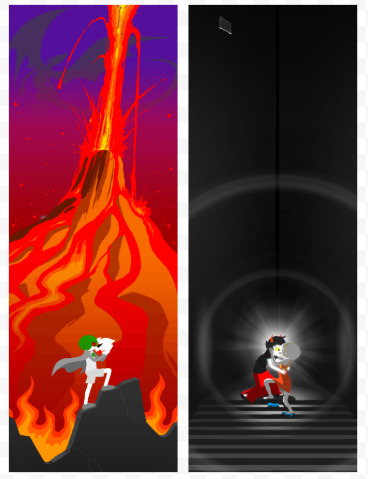
(also homestuck does visual callbacks very well, there’s a reason that these two scenes are composed the same way.)
but the core of the story is these four kids, all of them starting from a state of isolation. they don't have "real friends", they feel disconnected from their guardians, they feel disconnected from everyone in the world they walk around in, but they go online and they have each other. and they're constantly joking and making fun of each other, but they're also checking in almost every time they achieve something, as if grounding their friends in their real life.
the story keeps progressing and getting more and more complicated, but it can never quite overshadow the beauty of the pesterlog conversations between friends.

i think that's a large part of what the audience of homestuck connects with—that feeling of connection online and the support that the characters give each other.
i also think that a lot of the time, the friendships and familial relationships in homestuck were given the same—if not more—importance as the romantic relationships, which is fucking uncommon to see in media! almost every character has to come to terms with how their upbringing shaped them, and you know what? that's the same of almost every person.
the conversation between dirk and dave before the final battle is one of the most important and touching moments of the whole story! two of the characters most concerned with their adherence to masculinity and appearing Too Cool For Emotions talk about their feelings and trauma before hugging it out. and it doesn't further the plot, it isn't part of the hero's romantic arc, but it's vital.
the second big thing i think homestuck believes in is the importance of doing what is right. in being a hero.
homestuck positions john and his friends as the main characters selected by the universe to play sburb and literally ascends them to god status.
they're empowered by destiny! they're going to beat the game, conquer the worst villain ever and bring humanity and trollkind back from extinction AND their new world isn't going to be under the tyranny of a genocidal fish alien!
but that empowerment is also a disempowerment.
look at how frequently dave falls into the reluctant hero trope. fate fucking kicks them around. when they are so destined to do all that stuff, can they really be said to have free will? and when they do seem to make a wrong choice in relation to their destiny, it's either something that furthers the plot OR it creates a doomed timeline and they're usually killed horribly.
and it's a story that is constantly reminding us that it's a story! you can definitely lose yourself in homestuck, you can zone into it and accept the rules and just read it as if it's a reasonable reality, but i don't think it was ever written that way, or when it is, i think that that's a result of hussie accidentally getting into the story as well!
like okay, we start off with this:

that's fucking bonkers. he's 13 and he doesn't have a name? but of course it's bullshit, it’s just a cool homestuck thing. because we never get a conversation that goes:
TG: so the big 13
TG: you get a name yet
EB: yup! let me formally introduce myself as john!
TG: i give that name 4/5 hats
no, dave just immediately calls john by his name. and likewise, until we're introduced to the other characters and learn their names, they're referred to by their handle abbreviations, but the second they're introduced it's first name basis time. because it's a story and our perception is what matters most.
then we have the ridiculous intermission, that starts out as what dave sees when he goes to mspa.com and which resembles problem sleuth enough that i almost thought it was just that, but then seemed to be an entirely new adventure, and then became a pretty vital subplot!
and then we have the author literally climbing into the story and we watch him type it. Don't Forget This Is All Written By Me!
the website changes format, there are the meta jokes, there's the way that caliborn raises the same complaints to hussie about the story being too long and confusing that some members of the fandom were. there's the way that pantskat happened! or they drastic changes in artstyle, often because someone else was drawing a panel!
so like, we've got these characters who seem to have goals that they've developed of their own volition and who seem to have their own ways of going about achieving them, who at times even act contrarily to how hussie says he wants them to act (remember how he attempted to propose to/revive vriska and how both she and caliborn at different times type into the narrative prompt "instead of" hussie) but of course ultimately! he wrote every word!
they don't have free will, they don't even exist! but on a different level, which any writer can understand, once you as an author have established a character, you trap yourself into writing them consistently, which can mean that while something might be best for the plot, the character metaphorically crosses their arms in your head and goes "i would literally never do that."
some characters of homestuck become aware that they are and we know they are, but most of them don't think that, they think that they're just living the life they have.
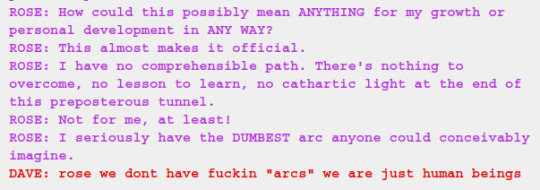
how the fuck are his characters supposed to go about their days when their author finds it funny to block their path with a giant bust of snoop dogg? and when they work for pages and pages and pages to get around whatever asinine thing andrew fucking hussie (or worse! his fans!) has come up with, there's another obstacle and maybe there's not even a point anyway!
how do you not just dismiss it as something like "hes just being weird/an asshole/etc”?
yeah, look, he might just be having a laugh. but so to might god.
sometimes you're walking along and something really stupid happens and it makes you for a second want to believe in god so that you can stare at the sky and say "really." :|
think about why detective stories are so popular. they give the illusion that if you're clever enough, if you collect the right data and link it together, you can trace back exactly what happened and solve impossible riddles and make sense of the world. you meet a man who has dust on his knees and you can deduce that he's been sneaking down to the basement of the shop he works at to tunnel into the bank next door. there's nothing magic about it, watson, it's just good detective work.
and we neeeeed that lie! but you know how it works in the real world? in the real world, police are baffled at a crime scene until a decade later someone discovers the fingerprints belonged to a fucking KOALA! that's more ridiculous than a snoop dogg bust in a hallway, or most of the other things hussie has written.
i think like that's a huge message behind the epilogues too, because john figures out he's in a story in candy and everything feels pointless.
but if that's the world he lives in, that's the world he fucking lives in. there's nothing pointless about living.
and i think that clicks for him towards the end when he talks to roxy and then rose. rose actually thanks him for choosing a path that allowed her to have the life she had, because she loves her wife and daughter. like it's insane, but she's happy, that's the life she lived and she doesn't want a more sensible one.
so what happens to us when we get that feeling like the world is pointless?
(which is A Major Fucking Side Effect Of Depression BTW and i still stand by my interpretation that ALL of john's shit can be put down to his depression, which is what makes it interesting)
for a generation with fucking terrifying levels of mental illness, when we start feeling like the world is too crazy and the odds are too high, and there's fucking war happening and our friends aren't even guaranteed to be on our side?
we just fucking fight anyway.
because we live in the world we live in and we just have to be grateful that we are who we are because of that.
every character in homestuck chooses this, again and again, so i have to read that as hopeful. alpha dave and rose knowing who hic is and that their kids are so far away? still gonna fucking fight and fight LOUDLY even though they know it won't change things. (on top of the fucking white house, in case the political allegory was too subtle lmao.)
there are so many messages in homestuck and honestly i feel like i’ve barely scraped the surface of them. but what does homestuck believe in? i feel that in my heart. homestuck believes in love and in doing what is right, even when it’s hard to figure out what right is, even when you might not make a difference.
homestuck is good, actually.
75 notes
·
View notes
Link

Photo by John Moore
I’m sorry. I’ve tried, but I can’t help it. I have a bad feeling about the upcoming election. A very bad feeling. I’ve tried to stifle it. Tried and tried. But it’s rising, like a failed harvest, by the day. Do you have that kind of feeling too? Or maybe you don’t at all. I can’t say.
Let me distill what this strange and terrible feeling — it feels like watching a sky turn black, or a horizon grow red — keeps whispering to me.
(I’m going to put the first two reasons in parentheses because you should skip them. They’re boring and we all know them. The first one is the most obvious: Trump’s trying to steal the election. And so far, he’s doing a pretty good job. The Postal Service has been captured, voting machines mysteriously, quietly shut down, and meanwhile, the Democrats have threatened to…hold hearings. He’s threatened to send armed troops into the streets on Election Day. Then there’s the fact that his side has an array of legal challenges lined up, which will cast doubt on whatever the results are, throwing politics into chaos. And the fact that he doesn’t plan to leave office peacefully at all. Need I go on? Suffice it to say that an aspiring authoritarian has a well-crafted plan to thwart a fair election — but the opposition, what little there is, doesn’t have a unified, careful, decisive plan to stop him.
Then there’s all the help that Trump is going to have stealing the election. You know what’s coming, and so do I. Everyone from the Kremlin to your local unfriendly billionaires are going to barrage Facebook with propaganda — and because there’s money to be made, Zuck is going to grin like a dork, and look the other way.)
But those are only the least urgent, most superficial things my bad feeling whispers at me, to tell you the truth. The economist in me and the survivor of authoritarianism in me — they’re whispering truer truths to me right about now, ones I can’t ignore, I can’t deny, things I don’t want to say or admit or even think much about — but have to anyways.
Here’s the first one.
America’s up against not just Trump and his cronies — but against the tides of history itself. And history is a mighty, mighty force, like a great river. The few who’ve swum across its tides and lived to tell the tale? Well, they barely exist. Let me explain what I mean by that.
There’s one single force that foretells the rise of authoritarian-fascism in a nation: fresh, growing poverty, which breeds discontentment, anger, and eventually, hate. That hate is channeled by demagogues, targeted at long-hated minorities, who are blamed for all a society’s ills — which, in truth, they have nothing to do with.
It’s an old, old story, as old as time. Weimar Germany became Nazi Germany by way of Hitler, who blamed the Jews. A once vibrant and liberal Muslim world became a fanatical hotbed of extremism, by way of mullahs, who blame everyone from women to gays to “heretics.” Even Athens, the birthplace of democracy itself, fell prey to this vicious cycle, and fell to the Thirty Tyrants, as poverty and insecurity grew.
The latest example of poverty and despair igniting fascist-authoritarian collapse? America. Let me outline how grave the situation is. Just a quarter of working age Americans now have what would be considered decent jobs in any other nation. Another 25% work go-nowhere McJobs, what economists politely call “ low-income service jobs,” jobs with no benefits, protections, upward mobility, raises, security, on which you can’t support a family. And the remaining 50% are either unemployed, underemployed, or “discouraged,” meaning they’ve given up entirely.
Let me say it again. Just 25% of working age Americans have decent jobs. Everyone else is trying to eke out a living. And mostly, they’re failing. That’s why suicide and depression are skyrocketing. It’s why millennials can’t afford to start families, and are so traumatized they barely have sex. It’s why the birthrate is plummeting. How the middle class became a minority, and the dream died with it. Why 80% of American households live paycheck to paycheck, 75% struggle to pay basic bills, and 70% can’t raise a few hundred dollars for an emergency.
This is one great tide of history. One almost inescapable mechanism of cause and effect. The impoverishment of a society leads almost always to authoritarian collapse.
Now, most people — especially Americans — think that’s the other way around. They think authoritarianism breeds poverty. That’s exactly backwards. Authoritarianism doesn’t make people poor so much as people being poor breeds authoritarianism first. You only have to look at history to understand that. Why did peasants and serfs submit to being under the thumbs of kings and nobles, who were mostly violent, idiotic men with swords and guns? Because they were too poor to ever muster the resources to do anything about it. They were exhausted, drained, uneducated, illiterate, broken in the mind, spirit, heart. That’s why it took human civilization millennia to ever really develop beyond the age of empire.
The impoverishment of a society almost always leads to authoritarian collapse. Weimar Germany, Stalinist Russia, Maoist China, Islam in the late 20th century — I could go on forever. The examples of societies who have resisted this tide of history are so few and far between that they’re almost nonexistent.
What tends to happen is the precise opposite: societies have to become achingly, grindingly poor, reach a point of total catastrophe and ruin — before they wake up, come to their senses, and finally change. That’s Europe’s story. Only after World War II — the absolute devastation of it — did it become the place that’s synonymous with modernity and civilization today. Mere upheaval, as in World War I — even that wasn’t enough. Almost nobody escapes this tide of history. Nobody, in fact, that I can think of at all.
That means that America would have to be something truly, well, exceptional, to brook the tide of impoverishment breeding authoritarianism. Is that really the case? I imagine we’ll find out. But like I said, I have a bad feeling. History tells me that this challenge is much, much greater than most Americans think it is.
That brings me to the second reason I have a bad feeling, which is, well…Americans.
For Trump to really lose this election — not even by a landslide, just to lose it by a slender margin — three groups need to vote against him like they mean it. Young people, minorities, and those now notorious suburban housewives, by which we mean “downwardly mobile white women.”
I hate to have to say it, but I see absolutely no evidence yet that such a thing is happening. We need some kind of tidal wave of feelings rising from these groups, and I don’t feel it at the magnitude that we need it.
Young people, it seems to me, are just as tuned out and apathetic as they’ve been for a decade or more now. I don’t blame them. Joe Biden isn’t exactly a millennial or gen Z heartthrob, and neither is Kamala Harris. What I mean by that is that young Americans lean left — because they understand viscerally that they lived in a failed capitalist society, that capitalism has failed them the way communism failed Soviets. To Americans pundits, their young are “far” left — but they’re not, they’re mostly just minor-league social democrats in global terms.
But that perspective isn’t represented at all in the Democratic Presidential and VP choices. You couldn’t have more sober and boring neoliberals than Biden and Harris at all, really. And even though Biden’s a good dude, like Kamala, he’s not exactly a revolutionary, or even a reformist. He’s just…the establishment, all over again. “Better than Trump!” you cry. Definitely. Without a doubt. But young people aren’t exactly whooping with excitement — and that’s the point.
The same is true for minorities. Sure, if all you read is the New York Times, you’d think Kamala Harris was the second coming of MLK. But if you actually talk to minorities, you’ll hear a more rounded, skeptical point of view. It goes something like this. Kamala had to act like a white dude to ascend to power — and what’s the point of that? It obviates being a minority in the first place. If you have to act like them to gain power…then you’ve become them…and nothing changes. Different actor, same game.
Now, if all you listen to is pundits, you’ll never quite hear that perspective. But I think it’s a little insulting to think minorities are, well, so dumb that they’ll vote for someone just because they’re one of their own, according to skin color. I’m brown — should I vote for Kamala just because she’s half brown? Come on now, that’s mildly offensive, not to mention hilariously illogical. The point of view about minorities being presented by American punditry — most of which is white, remember — is way, way too simplistic to accord with lived reality. But what else is new? The point is this: just as young people are apathetic, minorities are skeptical and wary, too.
That brings me to the third critical constituency: soccer moms. Listen, I love soccer moms. No, not that way. I mean something more like I basically am a soccer mom, if a brown dude can be one. Hey, I get to choose my own pronouns now, right? I take my puppy to the park and hang out with all the other moms.
Recent history has shown us something funny, dismal, and surreal. Who decided the vote for Trump? All those nice white ladies. Who said they’d never vote for Trump? You guessed it. Who ignored Trump’s horrific history of misogyny, as in ‘grab ’em by the pssy’? Who had some kind of weird, deep hatred for Hillary, and chose Donald Trump over her? All those nice, polite soccer moms.*
White dudes — much maligned — ended up, in the last election, being a little more honest. They’ll tell you the batshit crazy stuff Americans believe to your face. “Nobody should have healthcare!!” “Wait, Bob, not even…your kids?” “No! They have to learn to stand on their two feet!!” “But what if they get — ” “Hey, only the strong survive, brochacho!! There’s no room for the weak around here!!” So white dudes we have a reasonably good read on: most of them, as in the majority, are fairly terrible people (sorry, white dudes), who, despite living in the 21st century, believe that nobody in society deserves any form of basic human rights, except maybe guns and beer and possibly obligatory sex from women. That’s a fact, by the way, even though I’ve put it in a funny way: Trump leads among white dudes by close to ten points.
So what if white women feel the same way — but just won’t admit it? That’s exactly what happened in 2016. The secret hate vote emerged, as in, the polls were wrong, because lots of people who said “Oh my God! I’d never vote for that hateful bigot”…turned around and…did. And most of those people — the secret hate voters — were women. The much maligned downwardly mobile American white lady. Soccer moms. If white ladies feel the same way white dudes do — and just won’t admit it, like last time — then…bang!!…Trump wins all over again. Even if just half of them do, he wins. He doesn’t even have to contest the results. He just…wins.
Now. How much do you trust the white suburban moms of America? Like I said, I’m a fan of soccer moms. But do I trust them? That’s a very different question. I only have history to guide me. And history, like I said, tells us that American soccer moms may very well repeat what they did in 2016. Everyone makes mistakes. People grow and learn. But it’s also true that people don’t change, that they stay the same in deep ways, that growth and maturity are hard-won are rare and precious.
I have a bad feeling about all that. I think the soccer moms of America might just turn out to do an about-face in the voting booth, like last time, and put Trump right back into office. Adding fuel to that fire in my mind is the question of whether they’ll really vote for Harris. Half black, half brown, the embodiment of everything that the downwardly white American lady, possibly secretly embittered and resentful…hated…just four short years ago. Is that much growth and maturity in so short a time really possible?
So now you know why. Why I have a bad feeling about this election. America, standing against the great tides of history, trying to swim upstream — a poor country now, trying to undo authoritarianism. How many have managed that? Very, very few. Young people, who seem as alienated as ever — with good reason. Minorities, whose views aren’t being examined or even thought about very carefully at all. And the vexing possibility of the betrayal by the white lady, or even just the American lady who wants to be more white. The one who secretly decided the election for a misogynist, a bigot, a crook, a man so brutish and violent he’s the very embodiment of patriarchy. Do people change that much in four short years?
History says no, my friends, to all these things. It say America can’t swim upstream now. Look how feeble it is, a wounded thing. It says young people won’t vote much for a candidate and his pick who don’t represent their preferences much at all. That minorities aren’t as simple as majorities make them out to be, and pandering to them rarely works well. And that people don’t change nearly so fast as circumstance needs them to, that wisdom comes slower than opportunity, which is the true source of all human grief.
Maybe the truest and darkest truth of them all about time, people, and dust, is the only one left worth believing in, I think to myself sometimes. It took Europe becoming ruins, mass grave, flames, bones — before it grew up, into gentleness, and rebuilt itself as the paragon of civilization and modernity. The growth of our capacity to love comes to us only through seeing what might have been turn to ashes. To mature, to expand in grace, beauty, truth, goodness, first we must fall down.
Umair
August 2020
I Have a Bad Feeling About This Election
0 notes
Text
Black Sails: The Verdict
not to be obvious but this was a really good show
If I try to get into all the things I want to say about this show I’ll be writing this post for the rest of my life so I’m just gonna touch on the most important things.
I’m not sure there’s ever been a show that had this much of an emotional impact on me. I woke up in the middle of the night last night thinking about the show. I guess I must have been dreaming about it and dreamed so hard I woke myself up. I’m sincerely hoping that the day is not far off when I can think about this show more calmly. I think I’ll be able to enjoy it more when the very thought of it doesn’t make me drown in feelings. I’m grateful for the BS humor videos on youtube that are helping me take the show less seriously.
I’ve been looking at other people’s reactions to the finale and two things are clearer than ever (and they were already pretty clear): 1. This is a very complex show where no one is ever totally right or wrong. 2. My standards for TV are a lot lower than many TV fans’. I’m impressed by people who are able to be like “here’s why such-and-such episode didn’t make sense/was dissatisfying” and I sort of envy people who are that good at watching TV but I’m a lot more willing than some people to accept what a show gives me and that’s just the way it is. So I understand some people’s complaints about various things about how the show ended, and I also understand the people who have the complete opposite points of view because this show is wicked complex and there are no right answers to a lot of the big questions about it. Anyway, the following are just my onions.
Ultimately I think my favorite character was Silver. I’ve never seen a character with development like his. I know his actions in the finale are very controversial and I’m trying not to take too hard a stance on them in one direction or the other, but I think what he did was ultimately right. He prevented a war that would have been devastating (because it’s a war) and that England probably would have won anyway. It’s not like the fact that the war got cut short means people aren’t going to keep resisting the bad things about the British empire. As for what he did to Flint, I’ve seen some people get very angry with Silver for essentially selling Flint into slavery, which okay yes, but…what was he supposed to do? If he wants to end the war, he has to sacrifice Flint. Flint’s whole identity was built around fighting civilization. If Silver wanted to end the war, he had to end Flint, and the only ways to do that were to kill him or “unmake” him, and what’s the best way to do that latter? By forcibly removing Flint from his life of piracy and reuniting him with the very thing whose loss turned James McGraw into Captain Flint in the first place: Thomas Hamilton. Flint’s life was basically miserable and I can’t see any way Silver could have found happiness for Flint except by reuniting him with the man he loved. It sucks that Flint is basically trapped on the plantation, but he hates the world anyway, so I’m not sure he’d be all that devastated about being shut off from the world for the rest of his life. Plus, it was repeatedly stressed that this is place as humane as it could be while still being what it is—I mean, no one got mad at Thomas for stopping work and hugging and kissing his lover—so it’s not like he’ll be treated terribly. I’m not trying to pretend that what Silver did was totally fine, but he gave Flint the happiest ending realistically possible. What else was he supposed to do?
I know some people suspect that Silver actually killed Flint and made up the story about sending him to the plantation, but not only is that needlessly depressing when the show is throwing a much happier option at us, it doesn’t even make sense. I mean, I don’t understand the logic of literally seeing something happen and then being like “well what if that didn’t happen!” Like, it’s a show, none of it really happened, but there is still a reality at the fictional level and if the show is clearly telling us that an event is part of that reality I don’t understand the impulse to reject that event as real.
It’s striking—and pleasing—that for such an angsty show, the ending was relatively happy. The world changes, civilization wins out, but that doesn’t mean everyone’s lives are over, that there’s no room for them to be happy going forward. Flint gets to “walk away from the sea and find some peace” with his true love. (Also note that he and Thomas were separated for approximately ten years, which is, well, half the time Odysseus and Penelope were separated? So the parallel sort of works. Half works.) Silver and Madi have gone through a very rough patch, but Madi returns to Silver and I have to believe that that means she’s come to see that his point of view is legitimate, that the issue of the war was an impossibly complicated one and the fact that they had different opinions on it doesn’t make either of them wrong, and that he really loves her. I know Silver has a wife in the book (which I CANNOT WAIT TO READ), so I assume we’re supposed to think he and Madi worked it out and got married. I’m more than willing to think that. Jack and Anne are still together (till they put us in the fucking ground!), still doin’ piracy, and Jack got another lesbian for his collection. (Hi, Mary Read!!!) Max is still running Nassau, happy, powerful, able to make the world a better place, and on good terms with Anne and Jack. Featherstone is governor! I love it! Everything sucks for Woodes Rogers, which, while I didn’t really like him, is not entirely fair, to be honest. He was no more a one-dimensional villain than Flint. Billy is, uh, marooned on Skeleton Island, I guess? Well, I know he can’t die yet because he’s in the book. Actually, let me start a new paragraph about Billy.
I know a lot of people ended up straight-up hating Billy, but I didn’t. I don’t want to go into too much detail because quite honestly I’m afraid I’m going to end up saying things that are just factually incorrect but I think Billy had good intentions that led him astray. It’s sad, really. His hatred of Flint was honestly totally justified but it led him to do things he shouldn’t have done, like going through with the raid on that one plantation. I don’t know, maybe I’m going too easy on him because he was so wonderful in the first three seasons, but maybe it’s not a bad thing that I choose to remember who Billy used to be and try to see that person in who he became.
I have a ton more things I want to say but those things will have to wait for other posts. Some of them I won’t be able to articulate unless I rewatch, and god knows when I’ll have the strength to do that. I’m just so fascinated by the theme of stories (one of my favorite themes for any show to have) in particular as it relates to my dear boys Flint and Silver. Both of them take on identities they didn’t start with—civilized lieutenant James McGraw becomes “the bloodthirstiest buccaneer that sailed,” Captain Flint, and tiny precious happy John Silver becomes Terrifying Indestructible Pirate Long John Silver—and we see the stories that spring up around both of those characters but we also see these guys for who they truly are underneath all the legends and ahhhhh I’m becoming inarticulate so I’m gonna just stop that thought here. In fact, I think it’s time to wrap up this post because if I even try to say more I’m gonna be here forever. Oh, but let me just say bless Jack Rackham for that beautiful speech about stories. Whenever a character in a show or movie makes a grand speech on that topic I’m GUARANTEED to just lose it emotionally.
Last thing: the reasons I wanted to watch this show in the first place were simply that it was a period drama about pirates that had quality gay/bi representation. I built it up so much in my head that I was apprehensive about watching it but guess what, it totally met my expectations! The representation was beautiful (I want to say more words on that topic but I’ll save that for another post) and, like, there were pirates. If I may end on a shallow note (which I may because it’s my blog and I’m in charge) anything with pirates is guaranteed to be awesome.
9 notes
·
View notes
Text
Witch of Space==> Ascend : What is Jade Harley’s Story?

Alright here we go I finally get to write about Jade. My biggest Homestuck secret is that for how relatively little I talk about her, Jade is actually probably my favorite Beta kid.
I love the others and Rose and Dave in particular are intensely personal to me but Jade vibed with me in a way pretty much no character in fiction ever did because she’s an unabashed furry and that’s basically the subculture that raised my preteen catholic ass.
So Jade means a lot to me, and the way her narrative grows has always spoken to me as much as Dave’s narrative about overcoming toxic masculinity, or Rose’s struggle to find existential meaning. In a way, Jade’s struggle IS Rose’s struggle! Jade and Rose have narratives that lead us to twin conclusions about the nature of Homestuck’s reality.
That’s getting ahead of myself though, and I’m going to do this wild thing where I try to impose some structure on my approach so hopefully you can come away with a clear idea of what I think Homestuck is doing. (I want to give special thanks to @landofsomethingsomething for helping me out with the feedback that led me to striving to improve in this respect.)
So. This post has three thesis statements that I hope you come away with at least seriously considering, if not outright buying into.
1. Jade’s character arc was as thought out and deliberate as any of the kids’. She was not “shafted” by the story. The two reasons fans most likely seem to think she was were the Three Years trip she spent alone, and that she “didn’t do anything in Collide”. I believe both are misreadings of the canon.
2. Jade’s arc is meaningful both for herself and for the broader narrative, and builds to one of the most important revelations about Homestuck’s universe.
3. Jade and Davepeta are not only canon but deeply romantic, and Davepeta stands to improve one of the biggest reasons fans feel Jade got “shafted”--not to mention that some fans might take issue with Jade’s lack of a romantic arc, and Davepeta...well...is her romantic arc.
But before we can talk about where Jade’s arc succeeds, we need to talk about what it is, which means we need to talk about her title--Witch of Space. For the record, here’s my view on the mythological roles:
They aren’t a pasted on set of superpowers, and they aren’t given to the kids by Skaia. The titles describe the nature the kids had all along, and the way their patterns of thought reflect onto the world around them. They also foreshadow their narrative arcs and trajectories in their entireties--Just like the titles Hussie was inspired by in creating the system, the Hero of Time and Hero of the Winds structure from the Legend of Zelda.
I’ll begin by tracking Jade’s similarities to her fellow Witches and Space players. By pointing these out I believe I should be able to give you an idea of what I think Jade’s arc is about, exactly.
After that, I’ll expand my reading of Jade as a Witch of Space to include her later narrative turns, as well as explaining how I feel Davesprite--and later Davepeta--is inherently tangled up in her arc, as well as being a better romantic partner for Jade than basically anyone else in the story.
Let’s go. I’m hoping this is the beginning of something really excellent.

Where lies the Witch’s magic?
The first striking similarity between Witches is their bond with an outside force much more powerful than they are representing their Aspect. For Jade, this is Becquerel. For Feferi, it’s Gl’bolyb-who is about as Lifey an entity as it gets. It is, after all, defined by being unknowably massive, incomprehensible Living things, with conscious awareness of its own.
It is simply a completely alien kind of Life to our own, and thus the Cosmic Horror. Gl’bolyb also requires the consumption of vast quantities of Life that Feferi has to provide it, tying it to Life’s themes of edible consumption. More on Life stuff when I write about Jane soon, though.


Like Jade, Feferi has little direct power early in her life. But she’s able to accomplish stunning feats through her connection to her guardian--which functions effectively as a Witch’s familiar. Before ascension, a Witch’s power is linked to the symbol that identifies her as a Witch in the first place.
Feferi is also ambitious. Not only did Feferi originally aim to change the rules of Life in troll society imposed by the Condesce’s will, but through her connection to the Horrorterrors, she’s able to fundamentally change the rules of Life on a metaphysical level, allowing Ghosts to exist inside dream bubbles in an unnatural limbo.
Damara has an outside power figure linked to Time, too--Lord English, who she associates with and wishes to work for. She also changes her relationship with Time--turning it into a weapon to use against her friends as revenge as opposed to a tool and series of systems she needs to serve like Aradia and Dave do during their sessions. She’s quite willful and ambitious about both her relationship to her “Familiar” and her use of her Aspect.
Both witches are driven primarily by their own ambitions and desires, and both witches are also fundamentally Changed by their Aspects. Feferi loses her life and becomes a ghost, her will becoming almost indistinguishable from the Horrorterrors’. And Damara’s primary use of her Aspect coincides with a drastic change in outlook and personality, making her cynical, bitter, and willing to serve her Familiar over connecting with others.
Now--if Witches are ambitious about and defined by both changing and being changed by the domain of their Aspect, then what is Jade’s field of ambition in this regard? To answer this question, it’ll help to look at her fellow Space players.
The weight of Space

We don’t see Porrim pre-session, but from their introductions, Jade, Kanaya and Calliope are all defined by a unique passion for Sburb. This makes sense--Sburb, after all, is the construct that defines the Space they will exist in their entire lives.
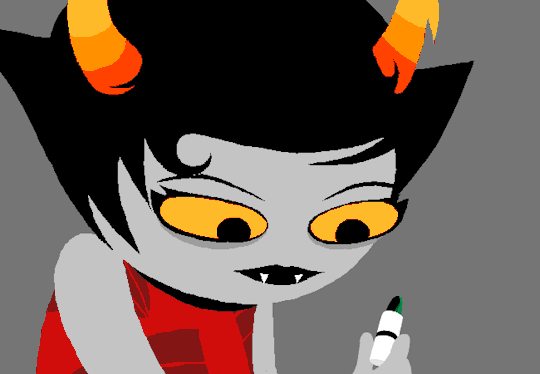
Waking early on Prospit also essentially makes them grow up in two environments--places--at once, meaning that they grow up influenced by the culture inherent to two different environments.
This is particularly notable with Kanaya, who is uniquely untouched by Troll culture compared to her friends. Her morals are much more aligned with Sburbs’ spirit of growth and cooperation, and she takes a passionate interest in fashion--which is to say, the expression of ideas about oneself through clothes.
This kind of self-expression is something Sburb encourages constantly, and is in fact it’s core philosophy. Kanaya internalizes it completely to such an extent her identity is created by her relationship to Sburb--and Space--much more than by her relationship to Troll culture. Calliope, too, is so inspired by Sburb’s philosophy of cooperation and possibility that it works against her Cherub sociology.

This connection also allows them to use the insight gained from one environment to influence the other. Space players tend to set the stage for their own sessions, laying the Setting for their games in their own unique ways.
Calliope--the Muse of Space--inspired Dirk and Roxy to set the stage for the Alpha session, and influenced Jake into setting the stage for the Beta session as well. Lord English’s particular exploitation of Trolls was also influenced by her, setting the grim stage for both the troll sessions as well. Kanaya used Rose’s guide and her visions to help set up her session, too.
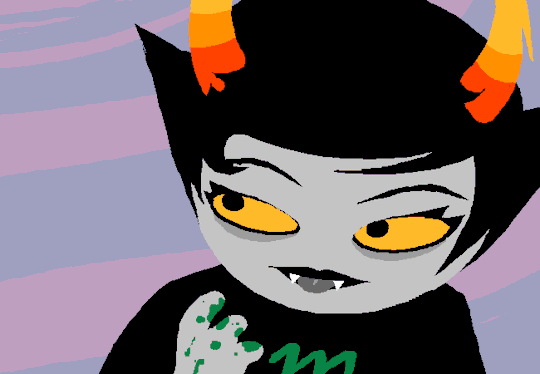
Finally, all Space players seem to end up somehow becoming entities they surround themselves with and are influenced by in life, in this sense being drastically affected by their own environments. Kanaya grew up influenced by troll rainbow drinker novels, and just so happened to develop an affinity for the Alternian sun.
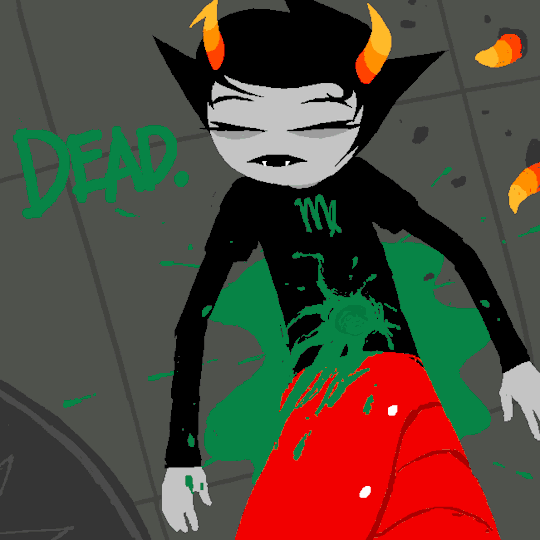
And once she died, she was outright reborn into one. Sylphs being the Passive Creation class, this makes sense--Kanaya heals and Re-Creates herself as her own ideal image. If her ability to do so is intrinsic to her being, that’s no surprise, since Sylphs are considered a kind of Fairy or Elemental, and so are intrinsically connected to and created by their Aspect.
Once she transforms, she gains super speed--ie: an increased ability to navigate space-- and the ability to fill her environment with Light, which she always found highly desirable. This pattern is repeated across Space players--Calliope is able to inspire others to see her as a Troll, while Jade is able to deliberately Change herself into a Furry. More on that later in this essay.
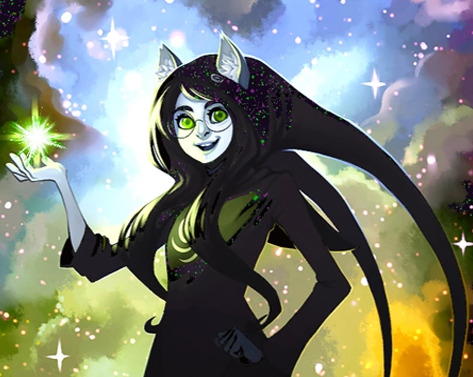
Now a picture begins to emerge.
The Witch is the Active Change class. One could parse the title as:
One who Changes X, or Changes through X.
With the corollary attribute of One who is Changed By X.
And as Sburb defines everything about the setting of Homestuck, and the enviroments of Space players growing up. And given Witch’s ambition and zeal, it makes perfect sense to think Jade’s ambition and execution would concern Changing not just Space, but Sburb itself.

Which is true! Among the main kids, Jade is uniquely passionate about actually playing the game. She sets up her session, gets Rose interested, and takes charge of orchestrating and executing the plan that leads to the Beta’s victory.
And she is uniquely changed by the environments the game exposes her to--the divide between Jade’s Dream Self and her Waking Self is by far the widest of any Player.
Dream Jade is relatively pampered and aloof, and while having access to a whole other world makes Waking Jade’s life far less distressing and lonely than it might otherwise have been, she still ends up more practical.
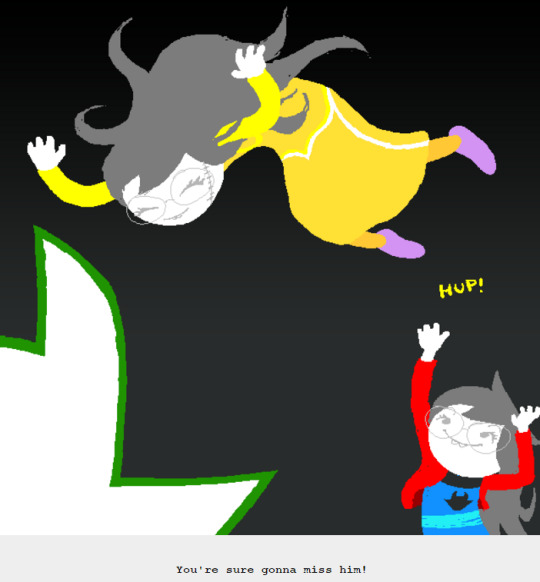
And once the game really gets going, also more demanding. In her desire to protect people and be an asset, Jade holds herself to a very high standard. As such, she actively tries to be strong and keep an upbeat attitude, and in execution Jade’s approach to this is quite similar to John’s--she ends up coming off as weirdly emotionally detached from the consequences of what she’s doing.
The difference is that Jade willfully uses that detachment for her own benefit, like Jake does. After all, reviving Dream Jade this way directly leads Jade to becoming a God Tier, and embodying Space as a First Guardian.

Dream Jade, meanwhile, dies, and is greatly changed by the stagnancy and fatalism inherent to the Dream Bubbles. Jade tries to comfort Jadesprite, but this also brings us to another core facet of Jade’s. Jade has a habit of bottling up her emotions in a big way, like Jane. Jade wants to be reliable and useful, and to her that parses as a focus on practicality and solution-oriented thinking.
So when Jadesprite--who’s another version of her--fails to live up to her standards, Jade tries to be caring... but tries to find practical solutions which go ignored as Jadesprite copes with the trauma of her circumstances. Jade’s frustration with the game, with Jadesprite’s defeatism, and with Jadesprite as a reflection of herself build until finally she gets fed up and...
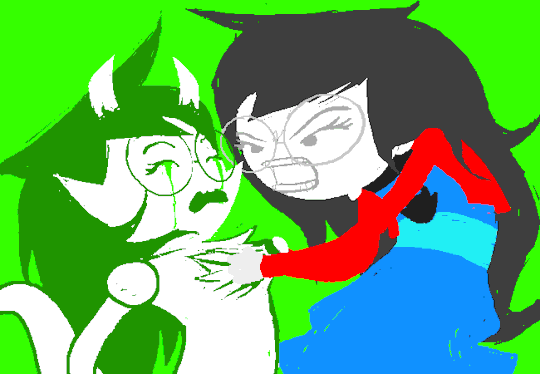

Blows a gasket. Jade’s got self-loathing issues just like anyone in Homestuck, and for her they manifest as being angry at what she could’ve become under different circumstances. She hates Jadesprite for being so malleable to her environment, and for being something she sees in herself--Selfish. Jade didn’t think too much about Becquerel before creating Jadesprite, after all, did she? Active classes are intrinsically self-motivated, and Jade is no exception.

Jadesprite is the only character Jade is quite this cruel to other than Karkat, who torments her for years and exhausts her with hyperemotional debates that distract her and waste her time. But this attitude is still something she carries across her relationships. She’s kind to Tavros, but his logic turns circular for long enough that she gets frustrated and turns their attention towards practical matters.


She extends much more time and patience to her friends, consoling Rose when her Mom dies...but even then is immediately concerned about what she will do with her feelings. In this pesterlog she also begins to question the nature of the game they’re playing, beginning to note Sburb seems outright cruel at times--foreshadowing her more intense struggles with the nature of the Space she inhabits.

Which brings us to Davesprite. Dave and Jade had a special relationship growing up, and Davesprite is a Dave brought into being by the game Jade is so invested in. And Davesprite is the one who finds Jadesprite at her lowest, and comforts her. He then makes her aware of her own power...

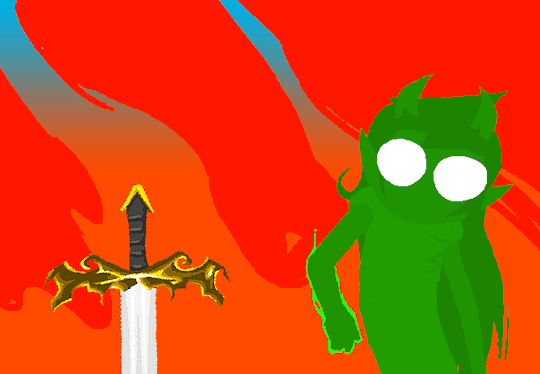
And encourages either Jade’s first great feat of magic as a Witch of Space. Immediately after this, Jade ascends, becoming one with Jadesprite and bringing the entire session under control--an action Davesprite bears witness to in it’s entirety. Soon after, Jade and Davesprite start dating during the three year’s boat trip. But…

It doesn’t work out. Why?

Well, there’s two reasons. The first is that Dave is an abuse victim, and that isn’t really the kind of trauma Jade could easily relate to--she’s been exposed to neglect and isolation, but the experience of being subjugated under an overbearing guardian would be alien to her-- and she never takes it particularly seriously growing up.

Grimbark Jade clues us in on the second. Davesprite also feels set apart from the kids, distanced by his Sprite status. He considers himself auxiliary to Alpha Dave, the same way Hal does with Dirk. John even rubs it in a couple of times, and openly wonders about Davesprite’s importance relative to Alpha Dave himself. And of course, Davesprite himself admits it.
This is something Jade can relate to to some extent--she was solely a Sprite for a time, and distanced and set apart from all society besides that. But the game fixed both of those for Jade, through bringing her closer to her friends and God Tiering. Not so for Davesprite.

Note what these issues have in common, though: Neither abuse trauma nor existential marginalization are problems that come with practical, tidy solutions--which are Jade’s instinctive method of dealing with things.
Jade wants to look for something to Do about everything, but there’s nothing to really Do for Davesprite. So Jade bottles her feelings of frustration up, only to have them come out when she goes Grimbark. But even while evil, brainwashed, and pissed off about Davesprite breaking up with her...

She still sticks up for Davesprite’s validity and personhood. Now, let’s move on to the retcon.
Davepeta happens, obviously--Nepeta acting as a Rogue to “Steal” Dave’s Heart for his own benefit. Davesprite transcends both his issues with his Bro and his tortured sense of auxiliary identity. Nepeta benefits from this arrangement, too--but we’re talking about Jade, so let’s see how the retcon treats her.
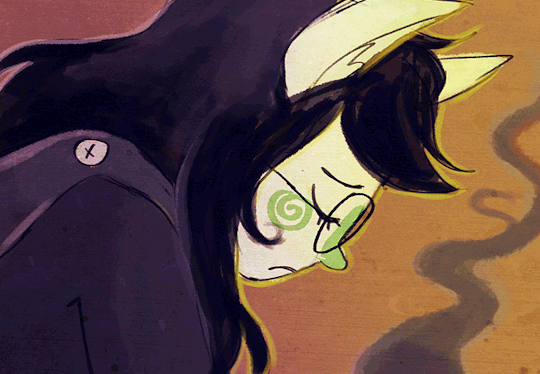

In the Post-Retcon version of the three years trip, Jade ends up completely alone and isolated. Fans usually hate this about her arc, but hear me out, because this is where I make my case for the first point I laid out at the beginning of this:
This isn’t just about tormenting or “shafting” Jade. It isn’t Hussie being lazy or not caring about her. Jade is struggling with her Aspect, the same way Dirk is tormented by his Splinters, Terezi by her Choices, and so on. And as she struggles with Space, she also struggles with the Game--and the label it seemingly “assigns” her. Space.
She dreams about and meets Alt!Calliope, who tells her the Game has ordained this tragic reality for her, and as a result Jade feels distanced and set apart from her friends--just as Davesprite once did. When she meets Alt!Calliope again, she reinforces this notion, seemingly telling Jade that it is in a Space player’s nature to be alone.

But that’s not all she tells her. As she’s exposed to the fully-fledged Muse of Space the longest, Jade is also uniquely privy to the deepest secret of the nature of all of the entire Homestuck multiverse. A secret implied and built up to literally from the moment John first bites Sburb’s apple and enters the game(citation pending--I’ve got that video recorded already):
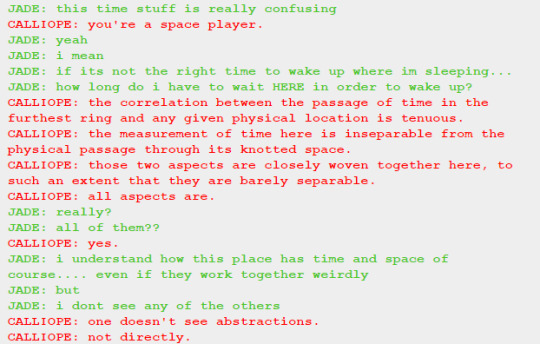
That Paradox Space is composed out of the abstractions of thought called the Aspects. This is the root of my second point, that Jade’s narrative is important both for herself and the wider Homestuck story--not to mention our understanding of it’s Multiverse.

The implications of this stunning revelation are enormous. Calliope literally states that ideas are made up of the Aspects, and what the Alchemy system does is make physical objects out of ideas. All of Paradox Space grows outwards from these twelve tiny elements of thought, and so reality is literally something created by those perceiving it. In Homestuck, existence is created by thought--and so too is all physical matter.
This is why I argue all depictions of Light in Homestuck symbolically contain the Light Aspect’s fundamental ideas--because Light as a physical presence is simply a concentrated enough amount of Light aspect abstractions to be visible in physical reality. The same is true of every Aspect--in this same sense, you can argue all food is made out of Life, and all absence out of Void.
Imagine being granted the key to understanding the entire universe. That’s what is happening here. Jade doesn’t understand all of it right away, but the core idea gets across. And understanding the true nature of reality this way could take Jade’s interest in science to an entire other level. There’s practically no limit to what she could do with this information, I mean--if all of reality is created by thought, then what are the real limits of what’s possible for anyone?
Having delivered this information, Calliope leaves--leaving Jade as close to the biggest symbol of Space in the comic--the Green Sun--as she could get. Jade lingers, waiting, under the impression she is inherently meant to simply comply with the will of her Aspect and Paradox Space, when along comes…
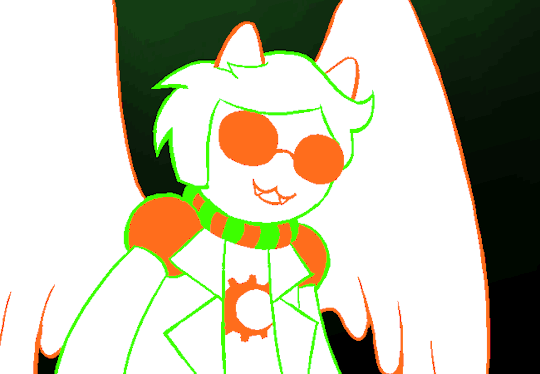
Davesprite, freed of all the issues that made their relationship originally unworkable. Only now it’s Davepeta, and Davepeta is a wholly new entity, completely and utterly defined by their relationship to the Game that functions as one of Jade’s primary domains of power and influence. It would be literally impossible for Jade to have met any version of any person even remotely like Davepeta elsewhere. It had to be here. It had to be through Sburb.
Davepeta also has unique insight into the nature of the Player’s ultimate reality, and is one of the few characters with more insight into that reality than Jade herself.
In keeping with the Light motif with Homestuck’s romantic relationships, Jade lingers in the dark Void of her loneliness, not knowing whether she should Do anything, by a hyper-incandescent 2xSprite, an entity literally created to provide aid and information as well as giving off Light physically.
As if that weren’t enough, Davepeta is also a twice over Passive player--a Knight who serves their friends Time, or serves them through Time, and a Rogue who can Steal Hearts for the benefit of others.
And Davepeta is also coded as a cat and a bird, simultaneously--the two animals most commonly associated with Witches.
Do you see where I’m going with this? Now that Jade is a fully ascended Witch who has mastered Space, along comes Davepeta, framed perfectly to act as the Witch’s Familiar. A Familiar whose existence reflects not just dominion over Physical Space, but mastery over both Sburb and the nature of Paradox Space.
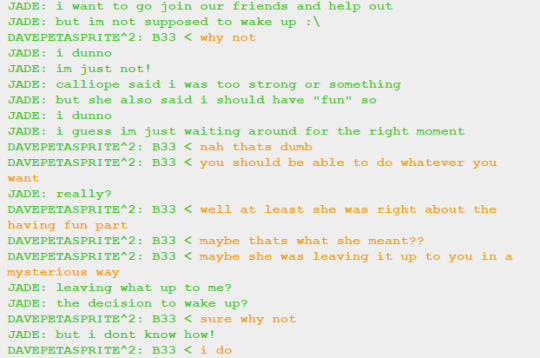
And what does Davepeta do when it’s, for once, Jade at a loss for what to do next, trapped in a circular spiral of logic on whether to even move forward? Davepeta says that’s dumb, and that Jade should do whatever she wants to, and offers her a practical solution to help her do it. Making it clear that Davepeta is capable of being a partner and aid to Jade’s desires and ambitions.

Jade then wakes up, and decides to follow Davepeta’s (and Calliope’s) advice: She has fun.
In Collide, Jade chooses not to fight, but rather to use her space powers to play with Bec Noir and PM, distracting them and keeping them busy. Doing this leads her to Changing the game in the most powerful way possible.
The two First Guardians are completely equalized by Bec’s influence on them, making them equal in power...but also giving them equally powerful feelings of love for Jade.
This gives PM the advantage. PM is the one able to control her own emotions, find nuance in her situation, and take a middle solution between really hurting Jade and complete inaction--which Jack is unable to do.
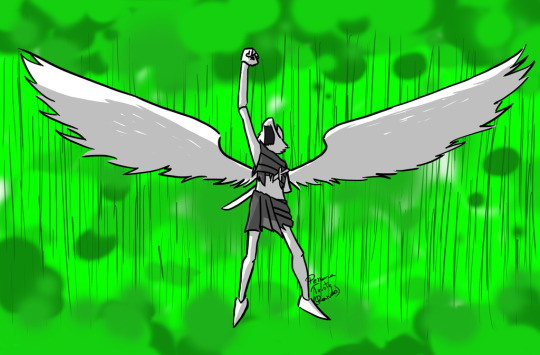
By setting up this situation, Jade turns the core fatalism of Sburb on it’s head--setting up a scenario where White can do the impossible and defeat Black itself. That’s about as “Changing” the nature of “Space” as it gets--a Witch of Space, fully realized.
And now Jade is hanging out, happy with her friends and not lonely or isolated at all. Jade is having fun and enjoying herself on Earth C. That’s a pretty satisfying narrative, as far as I’m concerned.
Jade struggled, but she also gained unique insight and knowledge entirely in keeping with her Aspect. At the very least, considering the importance of the information Jade got from her journey and all the thematic imagery surrounding it, I think it’s likely that approach was intentional and not a byproduct of Hussie “not caring about Jade” or “shafting” her.
Whether you guys do or don’t like where he took Jade’s arc is another conversation, albeit one I’m willing to have--I’m just arguing there was intent behind the chaos.
That said, now I’m going to do something I don’t usually like to do, and speculate about Jade’s future a little.
I personally think Jade’s “arc” is complete enough as it stands now--Davepeta’s a compelling romantic partner, but it’s not like Jade necessarily needs a romance in the first place. I won’t be upset if I end up wrong about this stuff--
I just think the nature of all this build up between Jade and Davepeta makes it more likely than any alternatives I can think of.
So here’s some thoughts about the Epilogue you may want to consider:
Whether Davepeta will survive to meet up with her again is, admittedly, an open question...but considering all this narrative buildup, the fact that we already know Sprites exist past the end of the Game, and that Davepeta already fought Lord English and survived, I have a hard time believing they’re going to be killed off at this point.
Especially considering [S] Credits is clearly setting up the Masterpiece, and if we see the Beta kids get sucked into that Juju it’s likely we’ll also see them pop out the other end...in the Void, where Davepeta is.
And one last thing:
We already saw Roxy steal something from nothing, so it’s not impossible to think Davepeta could reach across the Timelines they already see, and steal the Heart or Time Game Over Jade spent with John and Davesprite in the original timeline back from the Game that took those experiences from her--fitting into Jade’s motif of Cheating the game to suit her desires.
This is the nature of my third and final point--that on top of everything else Davepeta adds to Jade’s narrative, they could subvert the lasting pain and suffering the Game inflicted on Jade across those three years, enabling her to remember her relationship with Davesprite, and also potentially giving John and Roxy another person who remembers the old timeline.
No idea if that’s gonna happen, or be shown in detail if it is. I just think that given the sheer depth in which Davepeta’s and Jade’s arcs are interwoven, it’s not impossible. If it doesn’t, I’m personally pretty happy with Davepeta giving Jade some good advice and helping her out at the end. Feel free to let me know what you think! :)
Alright, that’s all I got on Jade for now, guys. Hoping to write one post about Jane soon, but I’m going to be refocusing back towards video editing and job hunting, so these written posts may slow while I devote more energy to making videos. This has essentially been a side project to my Homestuck, Explained series as I gathered my thoughts on the endgame enough that I thought it warranted posting some more of them.
If you’re interested in enabling me to write more of these posts and making more videos, it’d be cool of you to check out my Patreon. We’ve got a neat little Discord community of Homestuck aficionados thinking and talking about a bunch of different Homestuck analysis topics, and doing so can also get you perks like previews of my video scripts and previews of the videos themselves.
That’s all for now, peeps. As always, thanks a ton for reading.
See you again soon, everyone.
Until then, Keep Rising.
#Homestuck#Jade Harley#Davepeta#davepetasprite^2#Classpects#Witch/Heir#Sylph/Maid#Witch of Space#My MSPA Analysis
795 notes
·
View notes
Text
When the writer makes me care
Okay so I just now finished Season 2 Episode 3 of Bungou Stray Dogs and man oh man the raw emotional turmoil hit me like a truck delivering bricks on a Monday. Basically, something tragic happens to a character(no spoilers! It happens in every episode;) and this time, it was a double tragedy. My first instinct was to immediately load the next episode to release the angst.
But then I thought, how did I get here in the first place? You see, I had my doubts about the second season when I saw that they had switched around all but three of the cast with an entirely new one for an extended flashback. I already had trouble keeping up or caring for the first season’s cast, considering that a number of them were a bit generic. I was worried that I would lose interest like I did with the show Fargo. The new characters were just strangers after hours spent investing on the earlier characters, and as a person who focuses a bit more on character development than plot, I just lost interest.
Looking at the second season, there was a new protagonist, Oda Sakunosoke. I almost groaned at the first sight of him. His appearance screamed “I keep a stiff ten foot pole where my sense of humour is supposed to be...”
He just looked like a rehash of kunikida kun, or a typical jaded, burdened with a tragic backstory, too cool for school, loner kind of guy...
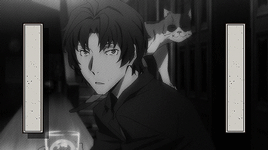
Then Dazai shows up. Now, we already know Dazai. And we like him(I assume) or at least care enough to want to know his backstory. So based on how he acts towards Oda kun, we know how to feel about him. If he’s a friend or foe, if it’s someone we can trust...But that isn’t much. And then oh great another character we don’t know shows up. This is gonna be like Fargo, isn’t it? But then, something happened. They have a conversation and apart from the usual exposition, it also tells us that their three close friends sharing a drink and trading work stories.

What’s striking is that it was so naturally structured, that you could just as easily imagine Sherlock, John and Lestrade, or even yourself and your two pals in the same situation. It’s not one of those...
*spouts exposition* *Spouts more exposition* *states source of conflict* *they disagree* *calms everyone down somewhat* *denounces enemies* *spouts more exposition* *everyone agrees* *states goals* *leave in a cool and manly fashion*
Dazai even calms down a bit and takes on an uncharacteristically somber and nostalgic tone. It immediately humanizes all three characters and grounds them in reality amidst the paranormal chaos that permeates their world. And I loved it. It was the hook that, together with the mystery surrounding these characters, got me to click on the next episode.
Still not enough? Well later on we see Oda kun visiting some orphans at a diner where he always orders chilli. It turns out that he cares for them after their parents were killed in a mafia conflict, and he took on the role of their caretaker and somewhat big brother.
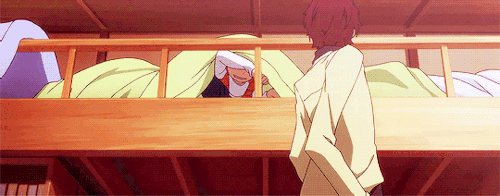
And then we also learn that he’s the only member of the mafia who doesn’t kill for some mysterious reason, which is why he is still of a low rank despite being highly skilled and powerful. Later on he states that he doesn’t kill because SPOILER BEGINS HERE he wants to become a writer someday to finish the missing third chapter of a book he loved to read as a kid, and he wouldn’t be able to write about the lives of people when he has taken the lives of others SPOILER ENDS HERE.
So what’s the point of all this? Who cares if he goes to the bar with friends or takes care of some children? Well it’s because he becomes real. He slowly turns from an imaginary vapour to liquid to solid, something you can almost touch. He has normal, everyday goals and motivations, normal, everyday problems scattered among the supernatural. He is also vulnerable,and feels the normal, everyday pain that we each struggle with. Just like Nathan Drake or John Watson, it feels like he’s just a phone call away. Eventually, his aspirations become your aspirations, his troubles burden you as if they were your own.
And it doesn’t have to be THE FATE OF THE ENTIRE HUMAN RACE AND THE UNIVERSE AS A WHOLE which, by the way, this anime could have easily fallen back on to create tension. It could be as simple as a family or even a basketball team.

He also isn’t your typical jaded, burdened with a tragic backstory, too cool for school, loner kind of guy. After all, no two real people are the same. So when a character is too similar to any other you’ve experienced before, they become generic, because the human brain can’t be so easily tricked, and writes them off as a lie. Like how Kirito in SAO is just a sub standard rehash of the anime protagonist, only without the indicative protagonist hairstyle. If his head got cut off I’d be like...*cue monotone* Oh no...poor what’s his face...sword...guy...*sigh* Why am I still watching this...
Anyway...yeah...motive...quirks and little things... I’ve lost my train of thought XD I’m surprised that you’ve read all the way till here bravo you beautiful soul have a potato...

18 notes
·
View notes
Note
As a John fan, I feel deflated. So we still know nothing of John Watson's past or his family, we still haven't met any of his family, Harry will never make an appearance but I am expected to be excited about a third Holmes sibling and more Holmes background? And another person gets to manipulate John, nice. :(
(same anon as before) Also, how do we get around John being so physically violent? So many people have been hating on him, now they feel justified that he’s nothing but an “abuser.” Ugh
*hugs you tight*
Good evening, fellow John lover!
I somehow share your disappointment - though, personally, I hit it after TST last week. Disappointment because I was really hoping this series would revolve around John Watson and his past, in a direct and obvious way. However, I believe TST (and parts of TLD) tackled Sherlock’s past and his own problems and self-loathing.
However… I have hope.
Because I truly believe Moftiss are addressing John Watson’s issues and past. TLD is actually very much about John, and the way he deals with his guilt and self-hatred. Please bear in mind that we saw John cry in front of Sherlock, pour his heart out, try to set up the man he loves with The Woman, only to break down in Sherlock’s arms. I mean… Character development much?! :o
Interestingly, Sherlock’s “sister” is all about John Watson at the beginning of series 4. She played a woman whom “he texted” (like Sherlock’s Irene?), who flirted with him, she played John’s therapist. She played Faith, who was an obvious mirror for John: Sherlock walking around at night with Faith was about John, about how he misses his presence and his admiration. At the end of TLD, she’s about to shoot John.
So. The sister they introduced is about John Watson (potential mirror for John himself or how Sherlock feels guilty about failing the people he loves?). I am actually eager to see what Moftiss will do with her. If she’s real or belongs to Sherlock’s MP/drugged mind. I’m curious what this new character will bring out in John & Sherlock, and what she will mean for their relationship.
And I’m eager to see her potential connections with Harry. Cause… the association has been done from the first episode, apparently? There are many possibilities with great potential.
I love the end of TLD: this, to me, looks very promising. I can’t wait to learn more about how Sherlock’s sister is associated with John and Harry and their past. I can’t wait to see what she’ll actually do. Shoot him? Taunt him? Talk to him? She played John’s therapist, John’s mirror, I mean! Isn’t she basically John’s psyche turning against him?
***
We don’t know what is real: Gatiss told us so in TST. We don’t have the whole story, only unexplained bits of it. We don’t know what happened when, or what is in Sherlock’s head. We, the audience, are faced with a completely unreliable narrator. Sherlock himself doesn’t know what is real, and many things feel off or OOC.
Mary’s death, for one thing? Until proven wrong, I’ll still believe John was the one who shot her. That he feels utterly guilty and hates himself about it.
Btw, my opinion is that Culverton Smith is John’s dark mirror (an ugly mirror he can’t bear to look at, basically the madness inside him?). Smith taunts John so hard, it’s unbearable. Moments before John flips out, Smith yells at him “Are you actually a doctor?! Please, stop this charade! Are you joking?! You’re a doctor?!”, which is not innocent. A doctor is meant to save people, not kill them. Not kill his wife. Are you a doctor or a cereal killer, John Watson?!
Culverton Smith messes with people’s sense of reality and the ugly truth within themselves. He uses medical knowledge to do so (drugs). John and Sherlock are in his “favourite room”, in front of him and his “daughter” when they both completely lose their sh*t. Coincidence? Methinks not.
Tbh, I strongly believe drugs were used on John & Sherlock. But Culverton Smith uses mental manipulation/torture too.
Smith messes with them right there, in this room. He taunts them both, uses their respective fears against themselves and each other. Sherlock’s sense of reality is completely chaotic, and he’s obviously dangerous. John knows Sherlock doesn’t kill/harm people, but he knows he’s drugged and I believe he tries to protect Sherlock from himself and Smith.
John has been taunted with by Smith, he is obviously distressed in the scene (the entire episode, really). He’s dealing with his own self-hatred, his own guilt, and Smith stabs the open wound. John cannot count on Sherlock, he has to be the reasonable one/protect him. He tries to keep his cool the entire scene.
Until Sherlock becomes a danger to everyone, and John completely flips out. At first, though, John is trying to calm Sherlock. Then he slaps him, pushes him against the wall and commands him to wake up:
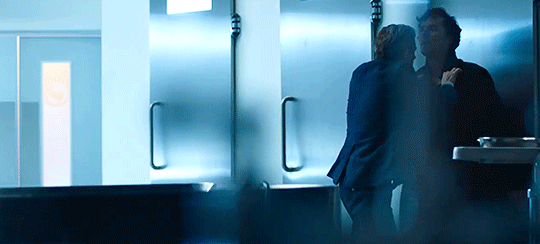
This is a doctor trying to revive a person (you know, with a defibrillator?), shocking them back to life.
But it doesn’t work, John’s judgement is impaired (drugs), Sherlock doesn’t react, and John is afraid, bewildered, furious, panicked. Where does John Watson goes when he’s overwhelmed? Anger and violence.
Tbh, I am not entirely sure this scene actually happened IRL, the way it was shown? It seems every time “Faith” appears, we’re in Sherlock’s MP where weird things happen, and John lashing out on Sherlock like that was very unsettling. I don’t know, but… the beginning of TLD makes a point in explaining that Sherlock’s mind cannot be trusted, so his narrative neither? And John telling him he killed his wife really looked like Sherlock’s guilt.
To me, it looked like Sherlock was telling himself he deserves everything he gets from John, violence included, because John is “entitled” and Sherlock just hates himself. And I can’t imagine John being all “damn straight” at Sherlock’s “you’re entitled to any act of violence you may deem necessary against me”, like… ????? No matter how John is drugged or grieving or his mind slipping… he wouldn’t let Sherlock do that?
My personal opinion is that John is trying to wake up Sherlock from his violent trance, and Sherlock is misinterpreting it and thinking John is giving him the abuse he “deserves”. The scene is shown from Sherlock’s point of view, and ends in his MP, where he claims John is entitled, and his MP!guilt!John confirms his fears. I believe this scene and its issues will be tackled later in the series, one way or another.
***
I don’t know. I don’t 100% know what is real or what is not in the episode right now. To me, John claiming Sherlock to live his happy heterosexual romance with The Woman before breaking down and needing Sherlock’s presence and comfort felt very real. Perhaps I need the Johnlock hug right now? I need my boys to be comforted after all the hurt.
I am quite eager to see how everything will be unravelled. What is real? Who is “ME”? What will be her link(s) to the Watsons? What is going to happen? What about Mary?
Next week cannot arrive too quickly…
***
I hope I’ve addressed your anxieties and disappointment properly, lovely? Please do not hesitate to write back :) In the meantime… We have to wait and keep our hopes high.
I have faith in Moftiss, especially after tonight. The episode is great, tmo, and offers promising points. Series 4, series 4?
#bbc sherlock#sherlock spoilers#series 4 spoilers#tld#johnlock#tjlc#tjlc meta#sherlock series 4#john watson#who is ME#john is amazing#sherlock meta#the lying detective#mary is evil#john shoots mary#mary is moriarty#believe in moftiss#moftiss are geniuses
39 notes
·
View notes
Text
Trump, Clinton, and Authenticity
Spontaneity and Extraverted Sensation as a Voter PreferenceAt this moment when the Brett Kavanaugh confirmation hearings are in full swing, it is more critical than ever to be able to recognize authenticity—in ourselves as well as in others. Inauthenticity seems to be easier to identify than authenticity, and Jung tells us much about the inauthentic person. In Jung’s writings, projection is a criterion that signals inauthenticity: it is an effort to push something inside oneself onto another. “We always see our own unavowed mistakes in our opponent” (1948/1969, ¶ 507). One sign of projection is ascribing motive to another, since we can never know another’s motives as well as our own, and we know very little indeed about our own. We can say without projecting that “x did such-and-such” or “y happened,” but to say “x did y because of [greed, corruption, revenge, etc.]” is to speculate and most likely to project. Jung said that “paranoia … plays a prominent role in projection” (1921/1971, ¶ 784). Another indicator of projection is the presence of strong affect, which often signals a complex. Complexes form a part of everyone’s psyche, but if we are unconscious of a complex, it can blind us to the truth about ourselves or others. Jung said that uncontrolled emotion can render us “singularly incapable of moral judgment” (Jung, 1951/1968, ¶ 15). Unfortunately, an expression of strong affect is sometimes viewed as a gauge of authenticity. The heightened emotion of a complex can be mistaken for sincerity because it erupts compulsively and spontaneously, and the public tends to conflate spontaneity with authenticity, as the 2016 presidential election demonstrated. The Planning Candidate and the Improvising Candidate Authenticity was a critical factor in the last presidential election, according to a Pew poll (Pew, 2016, pp. 2-3). The reasons that Donald Trump’s supporters gave for voting for him mostly concerned his candor—”honest,” said one; “outside of the political corruption,” said another; and “not a LIAR” said yet another in capital letters. Conversely, Trump’s supporters viewed Hillary Clinton as deceitful—”belongs behind bars,” “cannot be trusted,” and “nothing but lies.” Even Clinton’s own supporters viewed her as untrustworthy (Pew, p. 7). A Time Magazine report found the same thing: most voters tended to trust Trump more than Clinton (Chan, 2016). The question is: How did the voters gauge authenticity? Since taking office, a preponderance of President Trump’s statements have been found to be factually inaccurate by a variety of fact-checking organizations, e.g., AP Fact Check, PolitiFact, and FactCheck.org. According to PolitiFact, at present, 26% of Clinton’s recorded statements are false whereas 69% of Trump’s statements are false. Recently, on his 601st day in office, the number of President Trump’s statements that were “either totally false or partially untrue” reached 5,000 according to The Washington Post Fact Checker (Cilizza, 2018). Nevertheless, a recent CBS News poll found that Trump’s supporters trusted him more than members of their own families (Shugerman, 2018). After the election, Jungian analyst John Beebe (2016) posed a question that can help make sense of such apparent inconsistencies: “How is it that the most prepared candidate in history lost to the least prepared candidate?” Evidence suggests that the American voting public likes spontaneous personalities more than planful personalities. Extraverted sensation (Se) is the most spontaneous of the eight Jungian functions, and individuals who like to be spontaneous often have opposite types from those who like to plan and prepare. President Donald Trump appears to be a dominant extraverted sensing type with ESTP preferences (although some have suggested that he is an extraverted thinking type because of his tendency to be directive and hierarchical). Former Secretary of State Hillary Clinton appears to have INTJ preferences (although ENTJ has also been suggested [1]). While ESTPs are quick to react and their speech patterns tend to be uninhibited, INTJs are the opposite, deliberate and methodical. This factor gives ESTPs an advantage in presentations because the immediate responsiveness of the dominant-Se type resembles what many consider genuine-ness. Extraverted sensors have the capacity to be spontaneous and completely in the moment. The Se-dominant types, ESTPs and ESFPs, tend not to worry about the future (Ni, Ne), nor do they normally regret past actions (Si), as is predicted by the fact that these functions are low in the ESTP function hierarchy. Of course, individuals can develop their lower functions, but the function hierarchy suggests what comes natural to the type. The dominant function (Se) of ESTP is the inferior function of INTJ, and the dominant function of INTJ, introverted intuition (Ni), is the inferior function of ESTP, which suggests that Trump’s strength is Clinton’s weakness and vice versa. Because some individuals may show their shadow functions more than their preferred functions, Trump’s and Clinton’s true types may diverge from their public personas. As Jung (1921/1971) explained, “Only too often a man’s unconscious makes a far stronger impression on an observer than his consciousness does” (¶ 602). Nonetheless, while it is impossible to ever be entirely certain of someone’s type, it is possible to ascertain which functions are most prominent at any given moment. Clinton’s public persona shows preferences for introverted intuition (Ni) and extraverted thinking (Te), while Trump’s most salient function at present appears to be extraverted sensation (Se), and it appears that his voters particularly appreciate that aspect of his personality. Individual’s of Trump’s putative type are often popular in adolescence because of their disregard of consequences and their joking, laughing enjoyment of social and physical interaction. As Jung (1921/1971) observed, this type “is by no means unlovable” because he has “a charming and lively capacity for enjoyment” (¶ 607). Extraverted sensation shows in President Trump’s quick reactions to his immediate environment, his fondness for Twitter, and his enjoyment of extraverted sensing activities like athletic events—in 2014 he tried to buy the Buffalo Bills, a professional football team. Extraverted sensing types often seek interaction with the broadest possible audience and enjoy seeing their strong impact on an audience, and these qualities are evident in Trump’s career in entertainment and ability to connect with a crowd. The president also has the extraverted sensing type’s resistance to constraints, tangible or social. Marc Fisher (2016), a senior editor at The Washington Post, wrote that Trump won the election by breaking the rules. Trump’s own words reveal the love of crisis and quick wins that Cash Keahey says characterize the Se type: “I’m all about the hunt and the chase. When I get something I really wanted, I sometimes lose interest in it.” Fisher attributed Trump’s win to his down-to-earth pragmatism: “He … spoke to Americans in plain … everyday language, without massaging his words through the data-driven machinery of consultants.” Trump’s speech patterns reflect the extraverted sensing type’s preference for contemporary reality over archives of past performance—the province of introverted sensation (Si)—and its preference for the concrete (S) over the abstract (N). Trump epitomizes the extraverted sensor’s ability to read and to ride current trends in the population: “The shift in how people relate to one another online dovetailed almost perfectly with Trump’s personal style—his impulsiveness, his quickness to hit back,” and “his intemperate comments” (Fisher, 2016). According to Fisher, Trump appeared “so unpredictable that he could be trusted to act without regard to the powers that be.” A key asset of the INTJ personality is strategic planning, attributable to the farsightedness of introverted intuition (Ni) combined with the organizing feature of extraverted thinking (Te). Secretary Clinton’s campaign exemplified this asset, being built around long-range policies that showed the future orientation of introverted intuition. An article on Clinton’s personality in Psychology Today criticized her as ranking “low” on two Se qualities that often correlate with extraverted sensation—”colorful” and “excitable” (Sherman, 2016). INTJs always come prepared and therefore they tend to present with formality and gravitas. Clinton practiced for the presidential debates, which showcased her intensive preparation and long-range vision. In fact, according to New York Times journalist Jim Tankersley, she began work on a highly detailed long-range economic program a full two years before the election (Tankersley, 2016). However, as a Washington Post reporter observed, “A politician who studies too hard comes off as too rehearsed, too stiff, not authentic” (Paquette, 2016). Thus, the planfulness of INTJs could cause some to view them as inherently calculated and devious, although deception is not an attribute of psychological type. The Conflation of Authenticity with Spontaneity The remarks by reporters and supporters about Trump and Clinton reveal how authenticity and spontaneity are frequently conflated in political discourse, and how extraverted sensing (Se) leaders can be viewed as more authentic than leaders who prefer the opposite function of introverted intuition (Ni). We use the extraverted sensing function to perceive color, taste, texture, and sound, and to interact with the physical environment; it helps us navigate fast-occurring events by noticing the spatial context of those events. However, the speed and present-moment orientation of extraverted sensation should not be confused with authenticity. Conversely, planning and caution do not signal inauthenticity, although Clinton’s critics called her “overly cautious and artificial” (Shesol, 2016), illustrating the public’s tendency to conflate caution with artifice. Historian David Greenberg (2016) acknowledged how dubious public perceptions can be when he labeled Clinton’s persona “lawyerly,” describing it as “a guarded, defensive and hedging style that inhibits her from explaining herself in the relaxed, ‘authentic’ manner voters like to see.” Greenberg seems to recognize that for voters, authenticity is a matter of “manner,” not substance. Personality type is like a set of clothes we put on in order to interact with the world, and it may or may not reflect the person’s true self. We don’t judge a person’s authenticity by his or her clothes. We might paraphrase the Declaration of Independence and say, “All personality types are created equal.” Individuals of any type can be authentic or inauthentic. A personality type implies assets and weaknesses, but it does not dictate integrity or character, and certainly not authenticity. Personality type is something “innate,” according to Jung (1921/1971, ¶¶ 896-897), whereas character is something we build. John Beebe described the relationship between integrity and character as follows: “Integrity enables us to take responsibility for our character by enabling us to become conscious of it” (personal communication, June 11, 2018). Knowledge of personality type grows our consciousness, helping us distinguish the mask of personality from the core of character, and therefore may help us become more authentic. Lack of knowledge of personality type can lead us to view one or more of Jung’s eight functions as inherently superior to others and to confuse personality type with character. Jung provided his system of types to guide us in the quest for the authentic self by outlining the most likely parameters that delineate the psyche, the polarities between which we oscillate. True Type or False? Appearance vs. Reality Even if we are not seeing the true type of either Trump or Clinton, their election campaigns illustrated the opposition between extraverted sensation (Se) and introverted intuition (Ni), the dominant functions of ESTP and INTJ. President Trump’s campaign was fast, colorful, and exciting, as is characteristic of extraverted sensation, while Clinton’s campaign was more policy-laden and thus slower and heavier: In July of 2016, Trump’s website listed seven items under “positions” whereas Clinton’s website listed 37 issues (Tankersley, 2016). It is clear that the voting public often viewed Trump’s spontaneity and lack of reflection before speaking as evidence of authenticity. In response to the polling question, What is the main reason you support Trump, a substantial number said, “He tells it like it is” (Pew, 2016, p. 1). This phrase resonates with the description of the extraverted sensing type in the original Baynes translation of Psychological Types: “He is conspicuously adjusted to positive reality—conspicuously, because his adjustment is always visible. His ideal is the actual” (Jung, 1921/1923, p. 459). The extraverted sensor’s public presentation is then one of ‘what you see is what you get’— precisely the reason cited by the Trump supporters polled by Pew. But one of the key lessons of psychological type is that appearance is not reality: no personality is ever entirely perceptible and transparent. Jung (1954/1968) understood how easy it is to mistake the personality for the person when he wrote, “The persona is that which in reality one is not, but which oneself as well as others think one is” (¶ 221). Clarifying this distinction is a theme of his book, Psychological Types. The presentation of the types rarely reflects reality. ESTPs like to practice a skill until it becomes second-nature so that they can use that skill spontaneously. In other words, their spontaneity does not preclude preparation and discipline, just the contrary. President Trump’s favorite soundbites—”no collusion,” “fake news,” “build a wall”—sound as rote and mechanical as any of Secretary Clinton’s speeches, but they are prompt and concise, and they reflect the concrete practicality of the extraverted sensing mindset. By the same token, President Trump’s critics tend to see only his devil-may-care presentation style and not his planning, although he has a set of detailed plans for the future (Amadeo, 2018). Conversely, INTJs like Clinton may appear calculating but are capable of off-the-cuff wit on the spur of the moment and sharp observations of the environment. According to English journalist Edward Luce of the Financial Times, “Clinton’s wit … is famously brilliant when she is out of public earshot” (Luce, 2018). America’s Favorite Function, Extraverted Sensation The tendency to view extraverted sensing types as more authentic than more reflective, systematic types may be due to a type preference within American culture. As Marie-Louise Von Franz (1971/2013) observed, “the American nation has a very great number of extraverted sensation types” (loc. 446), and research indicates that voters tend to vote for those most like themselves (Boozer, 2009). Whatever the modal type of the country may be, most of the heroes of popular American culture seem to have an extraverted sensing preference, in either the dominant or auxiliary position. The Se hero loves a fast ride and a physical engagement, and he demonstrates superior reflexes vis a vis his attackers. Indiana Jones, Han Solo of Star Wars, Bruce Willis’s character in the Die Hard series, Johnny Depp in Pirates of the Caribbean, and Jax Teller in the Sons of Anarchy series all revel in the physicality and the insouciance of the extraverted sensing hero, his disdain for social conventions and ability to escape from any constraint against all odds. President Trump illustrates some aspects of the Se media hero in his disregard for tradition and propriety and in his enjoyment of the sensory side of life. Culture-based type bias, while sometimes favoring extraverted sensing leaders, may at other times victimize those same leaders, judging them irresponsible and undisciplined on account of their taste for taking risks and their penchant for “winging it.” Extraverted sensors are even critiqued for being popular, as if that in itself were a character flaw. It is no more sensible to criticize an Se type like President Trump for improvising than to critique an Ni type like Secretary Clinton for planning for the future. Both attributes are valuable in leaders. We would all be worse off if we had no extraverted sensing risk-takers among us capable of making snap decisions when piloting a fighter jet or while performing emergency surgery. Yet type bias often prevails when we enter the voting booth, where we tend to seek either clones of ourselves on the one hand or iconic images of pop culture heroes on the other. Robert Boozer’s research (Boozer & Forte, 2007) showed that sensing types tend to vote for conservatives, and intuitive types tend to vote for liberals, demonstrating the extent of type bias in elections. The broad appeal of extraverted sensation may simply be due to the nature of the Se function itself. The speech and behavior of extraverted sensing types appear to be uncalculated because of the immediacy of their responses to the environment or situation. Donald Trump’s speech patterns seem artless and unpremeditated, which probably contributes to his reputation for personal charm. In excess, extraverted sensation can manifest as impulsiveness, and Donald Trump has been called “the impulsive president” (Walsh, 2017). Impulses are not products of artifice. No one needs to fake an impulse. However, it would be a mistake to view impulsiveness as a sign of authenticity or to consider impetuousness more genuine than caution, discipline, or preparation. On the contrary, a pattern of precipitous behavior in an extraverted sensing type may indicate immaturity due to a poorly developed auxiliary function. A Failure of Judgment While personality type does not dictate authenticity, the failure to develop one’s personality does correlate with character and authenticity. An Se type who lacks the balance of an auxiliary judging function can appear to be non-judgmental, always a welcome quality in a companion, but lack of a developed judging function actually makes the individual more judgmental, not less, and eventually leads to the opposite of authenticity: duplicity. A developed personality, according to Jung, has access to both a judging function and a perceiving function; if either is missing, the individual is maladapted. Jung specifically warned of this problem in the extraverted sensing type; it renders the individual incapable of making a reasoned decision, such that he or she is at the mercy of fate, “accept[ing] indiscriminately everything that happens” (1921/1971, ¶ 609). In that case, the Se type’s impulsiveness becomes “compulsiveness” (¶ 609). Then, the lack of a judging function leads to an enantiodromia where the individual becomes the opposite of himself/herself, such that this most realistic of types then becomes the most delusional of types, prey to “pathological contents of a markedly unreal character” (¶ 608). Such a fate guarantees that the Se individual will become “judgmental,” i.e., the opposite of impartial, projecting every shadowy impulse upon others, seeing himself as the victim of circumstance and external enemies. The American film depiction of a Mafia don epitomizes the way in which an Se type without judgment can project his or her own evil onto others and then attack them for it. Like any Se type, the mob boss loves the good life—cooking, copulating, and celebrating—and speaks his mind with no restraints. But the lack of restraint suggests that he has neither a moral compass honed by feeling (F) nor the logical yardstick that thinking (T) provides for guidance, and hence the mob boss makes bizarre decisions that no one can anticipate. That unpredictability of the extraverted sensing type then becomes a weapon of intimidation that enhances his power. When an extraverted sensing type fails to develop a judging function, Jung (1921/1971) said, a second personality develops: “The whole structure of thought and feeling seems, in this second personality, to be twisted into a pathological parody; reason turns into hair-splitting pedantry—morality into dreary moralizing and blatant Pharisaism” (¶ 608). On the one hand, the moralizing sophistry of an immature judging function can be expressed in simplistic platitudes like the catechisms of The Godfather’s Vito Corleone—”Don’t ever take sides against the family” and “A man that doesn’t spend time with his family can never be a real man” (Coppola, 1972). On the other hand, the hypocrisy Jung alluded to (“Pharisaism”) is expressed in the way the Mafia don doesn’t hesitate to break his own rules. Mob boss Tony Soprano of the HBO series The Sopranos is charmingly attentive to his family members and playful with his employees, but when his second personality erupts, he kills the people he loves the most. Like Vito Corleone, Tony can appear authentic because of the extraordinary transparency of his self-interestedness, but unmitigated self-interest propagates deceitfulness, the opposite of authenticity. When the cracks in his facade show, his second personality erupts in a rage at being discovered. When Tony is asked to pay back money he has borrowed from a loan shark, he squirms with discomfort, and his buddies worriedly suggest a remedy for his discomfort: “Just don’t pay it back!” To that suggestion, Tony retorts: “Not pay my debts? As head of the family? How’s that gonna look?” (Chase, 2007). The only thing that matters is the perception of propriety because the perceiving function, extraverted sensation, is Tony Soprano’s only developed function. More importantly, the Se type like any other has an inferior function and an unconscious, and the less he is aware of these aspects of his personality, the more he is governed by them. Although the Se type tends not to worry about the future, a suppressed inferior Ni can create unconscious paranoia. Jung’s protégé Marie-Louise von Franz (1971/2013) said that Se types who suppress their Ni function can acquire “persecution ideas, … melancholy, suspicious premonitions” (loc. 429). She said further that “the prophetic contents that break through will be pessimistic and negative” (loc 546). Jung, referring to the Se type’s inferior Ni, said that this type is “unexpectedly credulous” (1921/1923, p. 459) with “a primitive superstitious and magical religiosity” (p. 460). Inferior Ni is depicted in Tony Soprano’s superstitious brand of Roman Catholicism, in his fear of his nightmares, and in his tendency to faint when memory takes him out of the present moment where Se types like to live. We see this gullibility of inferior introverted intuition in President Trump’s tendency to believe in conspiracy theories. If Tony Soprano represents a caricature of the ESTP type in excess, his INTJ counterpart might be Agent Smith of The Matrix. Agent Smith is the definitive control freak, a programmed individual who also programs others. Secretary Clinton during the campaign showed some signs of being too controlled, and the Democratic Party showed a tendency to overcontrol others in its treatment of Senator Bernie Sanders. Agent Smith illustrates the danger of this type in excess: he has the power of foresight, a hallmark feature of Ni, and he depicts how an INTJ’s suppressed inferior Se function may break out in physical combat and be used to control others and the whole environment. If an Se leader in excess like Tony Soprano can create a society that is chaotic and unpredictable, the Ni leader in excess can create a police state where citizens live in an orderly society ignorant of their true status, as in The Matrix. A historic example of Ni in excess is the Nazi vision of a one-thousand-year Reich, which blinded German civilians to the hellish underside of their society, and their leaders to the unsustainability of Hitler’s vision of total war. Many German citizens failed to recognize the evidence of their defeat even weeks before the end of the war. One-Sidedness Leads to Inauthenticity The one-sidedness that results from an overemphasis of a single function is the attribute that most leads to inauthenticity, because that function overpowers the parts of the individual’s personality that are incompatible with it. A kind of purification results that triggers a reversal, such that the personality becomes the opposite of itself. The types in excess show how suppression of a function results in an inadvertent intensification of the rejected function. The more Secretary Clinton strove to control the political dialogue, the more out of control it became. Similarly, the more President Trump gave vent to the impulsive side of his personality, the more rote and rehearsed his soundbites grew. Any function if taken to excess within an individual or a culture can lead to totalitarianism, but most individuals do not express their dominant and inferior functions as pathologically as the film examples above. Weakness in the inferior function is a natural consequence of narrowed expertise in the arena of the dominant function. We can’t have the strengths of our types without having the weaknesses too. It is natural to be reluctant to venture into the territory governed by the inferior function. If Trump shows his resistance to introverted intuition (Ni) by playing golf when the going gets tough, Clinton’s resistance to her extraverted sensing (Se) function showed in the way her communications grew even more controlled when she came under pressure—she gave fewer press conferences, which require answering questions on the spur of the moment. In the campaign, her determination to communicate her long-term plan came at the cost of responding to what was right under her nose: the public’s preoccupation with the here and now, i.e., contemporary reality as perceived by extraverted sensation. According to Jim Tankersley (2016), “She thought that voters would demand detailed plans from the candidates and reject what she called ‘easy answers’ on the big challenges facing the country.” That colossal miscalculation reflects the tunnel vision to which INTJs are prone. We cannot simultaneously anticipate the future (Ni) and experience the present (Se); if we can become conscious of our tendency to prefer one or the other, we can achieve some balance by alternating between one kind of perception and another. Nevertheless, a weak inferior function is not in itself a sign of pretense. In fact, only those who acknowledge their weaknesses can begin to approach authenticity. Neither Trump nor Clinton fully claimed responsibility for their failures during the campaign or afterward, but President Trump raised denial to a fine art, which economist Paul Krugman called “the doctrine of Trumpal infallibility” (Krugman, 2017a, 2017b), while Clinton at least took responsibility during the campaign for the policy failures of the past: We skewed the tax code toward the wealthy. We continued to undermine workers’ rights. We have blocked investments in our shared future. And I don’t think it’s just greed, as serious as that is. It seems we’ve lost a sense of shared responsibility and forgotten we’re all in this together. (Hillary Clinton, cited by Tankersley, 2016)Her use of the we pronoun indicated some willingness to acknowledge failure. Moreover, she declined to blame others when she said, “I don’t think it’s just greed.” With this comment Clinton deviated from the habit among politicians of assigning moral failings to others. Blame-seeking is a projection common in our public discourse, a sign of self-delusion and the antithesis of authenticity. Her book about the campaign, What Happened?, did castigate others and perhaps these were projections, but she did not abdicate ultimate responsibility for her loss of the election: I go back over my own shortcomings and the mistakes we made. I take responsibility for all of them. You can blame the data, blame the message, blame anything you want—but I was the candidate. It was my campaign. Those were my decisions. (Clinton, 2017, p. 391)None of us is completely authentic. We all tend to think ill of our opposite types and our political opponents. Both Clinton and Trump are guilty of vilifying one another and other political opponents, and both have shown paranoia in a tendency to believe in conspiracy theories. Nevertheless, because of her willingness to take responsibility for her failures, Clinton appears to be more genuine than Trump, not less. Clinton could profit by giving expression to some of the qualities of Donald Trump’s type—his spontaneity and emotional expressiveness—while Trump could benefit by becoming more like Clinton, more cautious and attuned to the consequences of his actions. And yet, merely moderating our excesses does not necessarily lead to authenticity. It may even signal the reverse—an effort to be something other than we are. Instead, we need to recognize that we all have an ESTP and an INTJ within, as well as many other personalities, and that when we demonize an aspect of another, we are demonizing a part of ourselves, suppressing a function that could revitalize our lives. True authenticity can only be approached by getting to know these suppressed parts of ourselves through the arduous project of self-exploration and the willingness to claim responsibility for both the wanted and the unwanted effects of our actions. Being True to What? Authenticity does not mean doing what you feel like or speaking your mind, although that is often the common definition. Often those who speak freely are only giving voice to the collective mind, not their own. Sometimes such a leader appears authentic but is given over completely to unconscious urges and impulses emerging from the collective unconscious. Such a leader radiates persuasiveness, which is often mistaken for authenticity, but Jung calls this phenomenon archetypal possession (1935/1980, ¶¶ 1330-1333.) Archetypes reside in the collective unconscious shared by all members of the species and constitute the most primitive source of psychological energy. When an individual allows himself to be fully identified with an archetype, he loses his individuality and appears larger than life, artificially inflating his personality with attributes of the archetype that he does not actually possess. An archetypally possessed leader can speak the unspeakable with no filters or inhibitions because he is giving voice to the unconscious contents of thousands of minds. For that reason, his speech is easily received and understood, and he appears utterly spontaneous and “authentic.” It is exhilarating to be liberated from one’s inhibitions, which ensures that demagogues—leaders who appeal to the public’s prejudices rather than its reason—find a wealth of enthusiastic supporters. Moreover, archetypal possession is often accompanied by strong affect, which indicates the opposite of authenticity; Hitler’s speeches exemplify the affect contamination that characterizes an archetypally possessed leader. Such a leader presents with authority, conviction, and heightened emotion, but is the epitome of internal inconsistency; his orders will be self-contradictory from moment to moment, and he will deny the contradiction. It was the foppish Polonius in Hamlet who said, “To thine own self be true.” That this line—spoken by one of Shakespeare’s most pathetic characters—is one of the most quoted lines in Shakespeare should give us pause. Shakespeare was emphasizing the futility of a persona-identified man like Polonius ever to know himself. Polonius was the kind of man who sacrifices his individuality to merge with the masses. How can Polonius be true to himself? He has no character to be true to. Those who have not individuated have no clear character of their own and only reflect back our own image. This is how a leader without character can appear to be quintessentially authentic: the lack of a well-developed character allows others to see whatever they want to see in his or her behavior and rhetoric. In his book The Path, Harvard professor Michael Puett observed how we in the west tend to “[build] our future on a very narrow sense of who we are, … taking a limited number of our emotional dispositions during a certain time and place and allowing those to define us forever” (2016, loc. 201). Puett suggested that “perhaps your personality is not your authentic self but rather ‘ruts’ or patterns of behavior–that you allowed to define who you thought you were” (loc. 206). This is precisely the discovery that Jung made, the concept of a “plural psyche,” to use Andrew Samuels’ (1989/2015) term, whose exploration takes a lifetime. Jung’s concept of the psyche suggests that authenticity cannot be willed by being consistent with some idea or image of oneself because the unconscious contains an opposite image that may manifest at any moment, like Tony Soprano’s second personality. Acknowledging this second personality within is a necessary but not sufficient condition for authenticity. Even with knowledge of our own type’s tendencies, authenticity may not be possible because we cannot know the mind’s shadow side. We can only notice the movement back and forth between the play of opposites. It is possible to be entirely sincere and yet utterly duplicitous if we do not know ourselves. It follows that we can only recognize authenticity in others to the extent that we have discovered our own hidden agendas. As Jung put it, “The psyche is still a foreign barely explored country of which we have only indirect knowledge, mediated by conscious functions that are open to almost endless possibilities of deception” (1921/1931, ¶ 916). To try to be authentic is by definition inauthentic because the trying makes it so. For this reason, authenticity may be the wrong goal, the one that leads us astray. The goal of individuation is wholeness, which can be approached only by experimenting with new and different modes of operation and consciousness. These will always feel uncomfortable, awkward, and yes—inauthentic. Therefore, bizarrely, we may be most authentically whole when we feel less than genuine and perhaps when we appear to be not our usual selves but incapacitated and vulnerable. [1] Psychology professors Trey Fitch and Jennifer Marshall (2008) assessed Hillary Clinton as ENTJ but INTJ seems a better fit for Clinton because, as Fitch and Marshall acknowledge, Clinton does not share many characteristics of extraverts (pp. 6-7), e.g, ENTJs are generally comfortable speaking extemporaneously. --- References: Altman, A. & Elliott, P. (2016, September 26). Inside the final hours of debate prep for Hillary Clinton and Donald Trump. Time Magazine. Amadeo, K. (2018, August 23). Donald Trump’s economic plan. The Balance. Beebe, J. (2016, November 11-12). Energies and patterns in psychological type: The reservoir of consciousness [workshop]. Jung Society of Houston, Texas. Boozer, R. & Forte, M. (2007). The relationship of psychological type to political self-perceptions, political opinions, and political party membership. Journal of Psychological Type, March, 3:18-30. Boozer, R. (2009). Psychological type in the political arena. Bulletin of Psychological Type, 32(3), 38-42. Chan, M. (2016, November 2). Donald Trump more trustworthy than Hillary Clinton, poll finds. Time Magazine. Chase, D. (2007). Chasing it. In The Sopranos [series]. HBO, Chase Films, and Brad Grey Television. Cilizza, C. (2018). Donald Trump’s absolutely mind-boggling assault on facts is actually picking up steam. The Point. CNN. Clinton, H. (2017). What happened? New York, NY: Simon and Schuster. Coppola, F. F. (1972). The Godfather. Albert Ruddy, producer. Based on the novel by Mario Puzo. Retrieved from: https://www.youtube.com/watch?v=woqQUxrxV90 Fisher, M. (2016, November 9). How Donald Trump broke the old rules of politics—and won the White House. The Washington Post. Fitch, T. & Marshall, J. (2008). A comparative psychobiography of Hillary Clinton and Condoleezza Rice [Poster session]. American Counseling Association’s 2008 National Conference, Oahu, HI. Greenberg, D. (2016, July/August). Are Clinton and Trump the biggest liars ever to run for president? Politico Magazine. Jung, C. G. (1971). Psychological types (R. F. C. Hull, Trans.) (H. Read et al., Eds.), The collected works of C. G. Jung (Vol. 6). Princeton, NJ: Princeton University Press. (Original work published 1921) Jung, C. G. (1923). Psychological types: Or, the psychology of individuation (H. G. Baynes, Trans.). New York, NY: Harcourt Brace. (Original work published 1921) Jung, C. G. (1931). A psychological theory of types (R. F. C. Hull, Trans.) (H. Read et al., Eds.), The collected works of C. G. Jung (Vol. 6), pp. 524-541. Princeton, NJ: Princeton University Press. (Original work published 1921) Jung, C. G. (1968). Aion: Researches into the phenomenology of the self (R. F. C. Hull, Trans.) (H. Read et al., Eds.), The collected works of C. G. Jung (Vol. 9ii, 2nd ed.), pp. 524-541. Princeton, NJ: Princeton University Press. Retrieved from http://www.proquest.com (Original work published 1951) Jung, C. G. (1968). Archetypes of the collective unconscious (R. F. C. Hull, Trans.). In H. Read et al. (Eds.), The collected works of C. G. Jung (Vol. 9i, 2nd ed.). Retrieved from http://www.proquest.com (Original work published 1954) Jung, C. G. (1969). General aspects of dream psychology (R. F. C. Hull, Trans.). In H. Read et al. (Eds.), The collected works of C. G. Jung (Vol. 8, 2nd ed.). Retrieved from http://www.proquest.com (Original work published 1948) Jung, C. G. (1980). The symbolic life (R. F. C. Hull, Trans.). In H. Read et al. (Eds.), The collected works of C. G. Jung (Vol. 18). Retrieved from http://www.proquest.com (Original work published 1935) Kristof, N. (2016, August 18). Clinton’s fibs vs. Trump’s huge lies. The New York Times. Krugman, P. (2017a, March 20). America’s epidemic of infallibility. The New York Times. Krugman, P. (2017b, October 23). The doctrine of Trumpal infallibility. The New York Times. Luce, E. (2018, April 24). Chasing Hillary: On the road with a cloistered would-be president. Financial Times. Paquette, D. (2016, September 27). What we mean when we say Hillary Clinton ‘overprepared’ for the debate. The Washington Post. Pew Research Center. (2016, September 21). In their own words: Why voters support—and have concerns about—Clinton and Trump [Complete report]. PolitiFact. (n.d.). Comparing Hillary Clinton, Donald Trump on the Truth-O-Meter. Puett, M. (2016). The Path: What Chinese philosophers can teach us about the good life. New York, NY: Simon & Shuster. Samuels, A. (2015). The plural psyche: Personality, morality, and the father. London, UK: Routledge. (Original work published 1989) Sherman, R. A. (2016, October 3). The personality of Hillary Clinton. Psychology Today. Shesol, J. (2016, June 7). Obama’s role on Clinton’s team. The New Yorker. Shugerman, E. (2018, July 31). Trump supporters trust the president more than their family and friends, poll finds. The Independent. Tankersley, J. (2016, July 29). Hillary Clinton has a very detailed plan for the economy—that may be a big problem. The Washington Post. von Franz, M.-L. (2013). The inferior function. In M.-L. von Franz & J. Hillman, Lectures on Jung’s typology [Kindle]. Dallas, TX: Spring Publications. (Original work published 1971) Walsh, K. T. (2017, February 3). The impulsive president. U. S. News. Weigel, D. (2017, July 18). Hillary Clinton is less popular than Donald Trump because nobody will let the 2016 election end. The Washington Post. Images: Donald Trump, stumping, March 19, 2016, Fountain Hills, AZ, by Gage Skidmore. Retrieved from commons.wikimedia.org Hillary Clinton speaking, February 1, 2013, US Department of State. Retrieved from commons.wikimedia.org Hillary Clinton, thoughtful, April 6, 2016, Pittsburg, PA, by Barbara Kinney. Retrieved from commons.wikimedia.org Donald Trump on parade, January 20, 2017, Washington, DC, by DHS Law Enforcement Personnel. Retrieved from commons.wikimedia.org Léger, F. (1950). The Album “Circus.” Retrieved from wikiart.org Ligabue, A. (1940). Tiger’s Head. Retrieved from wikiart.org Magritte, R. (1926). Wreckage of the Shadow. Retrieved from wikiart.org Milanev, I. (1926). King Marko. Retrieved from wikiart.org Perahim, J. (1939). Cabaret (visul lui omero). Retrieved from wikiart.org Yamamoto, K. (1940). Anxious Corridor. Retrieved from wikiart.org The post Trump, Clinton, and Authenticity appeared first on Personality Type in Depth. RSS Feed - Link To Personality Type In Depth Article https://www.typologycentral.com/forums/showthread.php?t=98129&goto=newpost&utm_source=dlvr.it&utm_medium=tumblr
0 notes
Text
15 thoughts after 30 NBA games
By: Philip Rolz
Dec 18, 2017
The season is still very young and some of the things we’ve seen so far may excite or worry some fans, but it’s merely a mirage (in some cases). If LeBron James has taught us anything, it’s that the regular season isn’t really that important (specially the first couple of months).
Having said that, It’s been a really exciting NBA Season so far and I’ve come across 30 facts, things, surprises, letdowns, doubts and treats that I’m gonna share in no particular order.

Serge Ibaka is just “Average”
This hasn’t been easy for me, since I’ve been rooting for him since his early days in OKC and have always thought he’s the future of the NBA. I mean a big athletic power forward/center that can dribble, pass, shoot mid range and long range who’s also is a rim protecting force of nature with great rebounding abilities. Sounds like someone with the talents of an Anthony Davis or a Kristaps Porzingis right? I thought so, too. And so did Sam Presti when he had to choose between James Harden and Serge Ibaka (well, he didn’t HAVE to choose between them but that’s another story) and wound up trading Harden for a bag of potato chips.
Since his OKC days he’s been traded twice in a very short time ending up in a Raptors team loaded with young big men. Ibaka at 28 years old is averaging 13.2 points per game, 5.5 rebounds per game, 1.4 blocks per game. While his scoring is not bad, his rebounding and shot blocking have severely dropped. But what’s most concerning is the fact that we haven’t even talked about him as an instrumental part of the Raptors success this year. And that’s because, sadly, Serge Ibaka is now an average NBA big man. Dang!
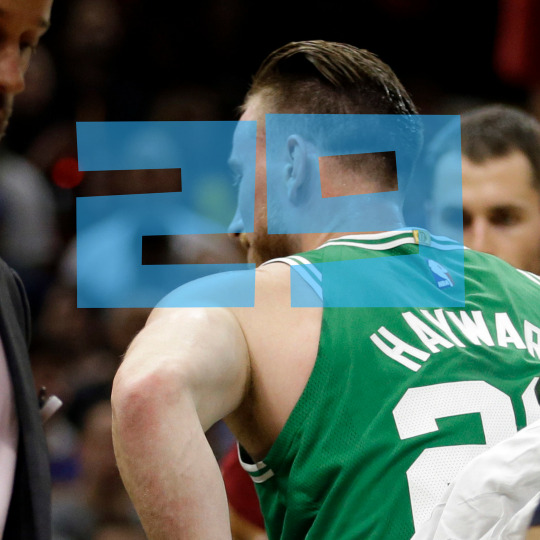
Injuries ☹️
Here we go again! Let’s debate whether the 82 game regular season is just too long. Personally, I’ve always thought it’s ridiculous to think that playing too many games is the actual reason players have these awful, gut-wrenching injuries that happen because of freak accidents.
But it’s been a season in which two of last year’s front runners for MVP (Kawhi Leonard and Isaiah Thomas) are not playing because of injury. Then there’s Gordon Hayward, Rudy Gobert, Mike Conley, Zach Lavine, Nikola Jokic and apparently the entire Clippers roster. So yeah, maybe 82 is too many.
We need all these players out there to keep the league competitive and entertaining. Let’s just pray to the basketball gods that nobody else goes down. I hate the “what if” after teams win or lose because of injuries.
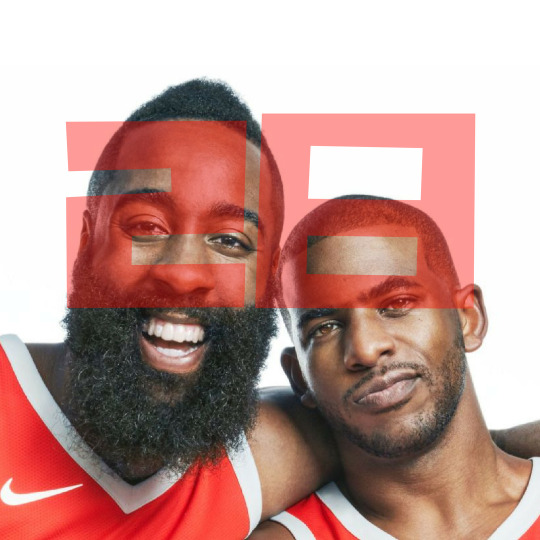
Houston, We Have a Problem Real Shot!
“James Harden and Chris Paul won’t be able to play together” said everyone back in July. Boy have they proved us wrong, though.
Houston has the best record in the league and these two superstars have clicked like nobody expected them to. James Harden thrived last year as he switched to the PG role averaging a league leading 11 assists per game and controlling the basketball most of the time, so bringing Chris Paul in the mix never really made sense, since he’s also a pass first point guard who usually has to have the ball in his hands. But everything’s possible in a D’Antoni offense that seems to be a very free spirited, free minded system that allows these talented dudes to just... play.
There’s some doubt, however. James Harden AND Chris Paul have a history of choking in the playoffs. And as much as D’Antoni’s offense always seems to be the recipe for success, he’s really never taken his high scoring teams very far in the playoffs. But hey, maybe this year, right? And there’s always the LeBron James to the Rockets rumor.
It seems hard to out-shoot the Warriors but this roster already beat them once this year. We’re all really looking forward to the next game in January 2018.
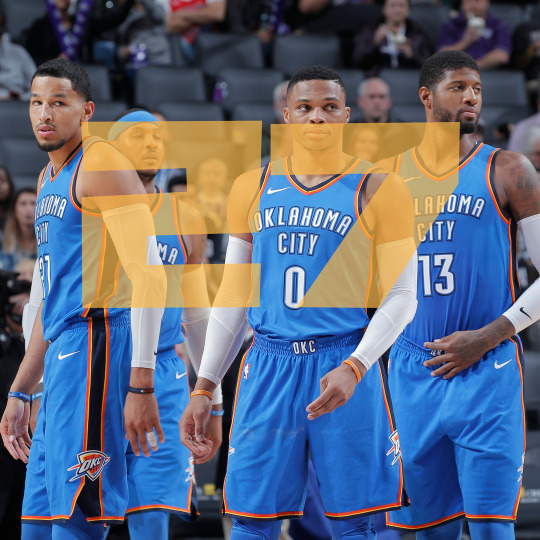
The Loaded Gun with the Faulty Trigger
Defensively they’re good. Offensively they’re at the bottom of the league. I certainly never expected that before the season started.
And let’s be clear, it really does take time for a team with new pieces to start building that chemistry. So I won’t panic just yet. But something seems a little off with this team.
Is it Carmelo Anthony? He’s no longer the superstar he once was, he’s now a really good NBA scorer. On paper he seems to be a good fit along two superstars such as Westbrook and George. It may be time to explore the idea of him coming off the bench. Playing the same amount of minutes and maybe even finishing games, but not starting.
Is it Billy Donovan? I’m not sure. I’d hate for him to lose his job after doing a really good job the last couple of seasons with the franchise and the outstanding defensive job he’s accomplished this year. Offensively he needs to work it out, and I think it must be the most difficult job in the world trying to coach a guy like Westbrook.
Is it Paul George? I’m pretty sure he’s not. He’s playing like the alpha dog both offensively and defensively and his overall attitude is A+.
Is it Westbrook? I hate to admit that this rough start might be all on the reigning MVP and face of the franchise. I want to make it clear that I LOVE this guy and that I find him the most entertaining player in the whole league. But this year has been different, mainly because it seems like he’s completely disengaged. Last season, his triple double averages were a reflection of his relentless passion to carry the whole team on his back and lead them to the playoffs. I get the feeling he’s settled down a bit with the addition of two unbelievable players and that desire to be the man seems to have dimmed a little. He needs to forget about triple doubles or numbers and averages, just give him the ball on every single possession and try to be more of a playmaker, because at the end of the day, what this team needs to click offensively is a floor general.
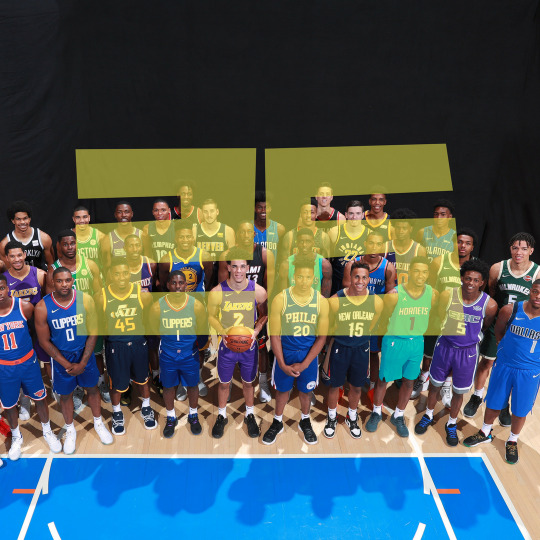
Rookie Game Strong
This class was compared to the rookie classes of 2003, 1996 and other greats, but in reality we really don’t know how good these kids will be.
After 30 games I’m really impressed with all the talent, potential and the
NBA-ready rooks that are already making a big impact.
Dennis Smith, Jr.
He’s the most explosive young PG in the league that’ll probably develop into NBA elite under the tutelage of the great and always underrated Rick Carlisle.
Lonzo Ball and Kyle Kuzma
Some players develop earlier than others, which seems to be the case with Kuzma and his stellar play. Lonzo will get there eventually, once his confidence gets stronger. Don’t call him a bust, you’ll bite your tongue in a couple of years.
Donovan Mitchell
Absolute steal of the draft! Go get them buckets young stud.
Jayson Tatum
Hats off to Danny Ainge for striking that draft day deal that gave them another draft pick next year AND a long, athletic, hard working player that’ll make this Celtic franchise good for a long long time.
Ben Simmons
Ok, I’m also a little iffy on the whole “he’s still a rookie, ‘cause he hasn’t played a game” thing, but if in fact Ben Simmons is considered part of this 2016-2017 rookie class, it might just become the best rookie class ever. Keep your eyes on this guy. Future face of the league, no doubt.
Markelle Fultz?
OK, we still haven’t seen if he’s gonna be the real deal just yet. Here’s to hoping.
Other rookies to keep an eye on: De’Aaron Fox, Frank Ntilikina, Jordan Bell, John Collins

Playoff Boogie?
It’s hard to believe DeMarcus Cousins has never been to the playoffs... ever. Yeah! I can’t believe a big man with his talents has never showcased his
skill-set in a playoff series or been tested given his personality, temper and overall attitude in such a tense and competitive environment.
That “basketball injustice” could come to an end this year (hopefully) as the New Orleans Pelicans sit on the 6th spot in a tough Western Conference. There’s still a very long road ahead, but the fact that health has not been an issue this year and having Rondo playing pretty decent basketball recently is a great sign. We deserve playoff Boogie, so let’s just hope it continues to go well for the Pels.
#PlayoffBoogie
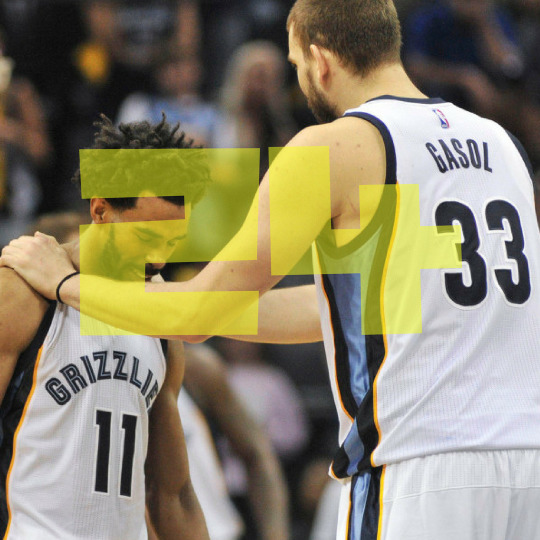
R.I.P. and Grind
All good things come to an end, so unfortunately it’s time to move on from that hard nosed, tough group of soldiers that made the Memphis franchise relevant. Grit-and-grind will always be a part of the league and will always be an example of how hard work and an established culture and style of play will make you successful.
Now what? Do you blow it up? Do you rebuild around Conley and Gasol? This franchise has a lot of questions they need to address. In the meantime this year will be a disaster, mainly because they need a new identity. There’s no way you can replace all the key “grit-and-grind” pieces they’ve lost.
Coach Fizzdale seemed like a great fit for the long road yet the real reasons for him getting fired are and will forever be unknown. Was it Gasol? Who knows? All we know is that it was fun to watch a team play their hearts out for so long. (Coach Fizz to OKC, maybe?)
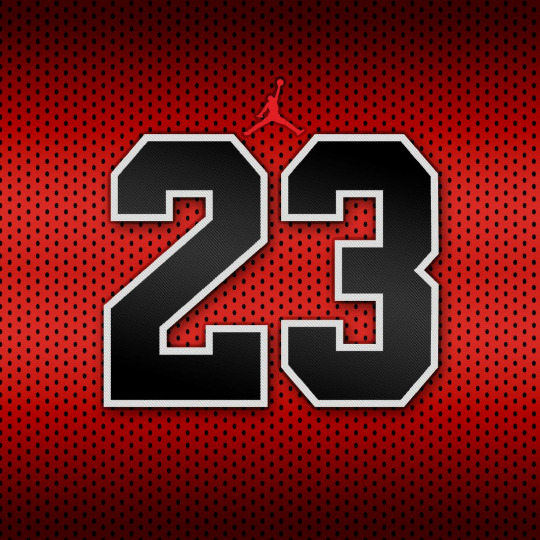
Can the NBA Universally Retire #23 already?
This is something I’ve thought about for years! I honestly think LeBron’s legacy might never surpass the greatest of Michael Jordan’s, mainly because he aspired to be like him by wearing his number and didn’t really created his own identity (might not be the case in Miami wearing #6).
But let’s not get into the whole debate on whether LeBron or Kobe or whoever is the G.O.A.T., let’s just focus on how MJ put basketball and more specifically the NBA on the map for every single person on planet earth. His style, his demeanor, his passion was otherworldly and changed the game forever. Was Kobe’s or LeBron’s impact better or worse? Not really important. The fact is Jordan was first. LeBron James would like to see any NBA player who wears No. 23 to choose another number as homage to Michael Jordan, stating he is willing to initiate the movement.
The NBA should be forever grateful for what Jordan did for the game of basketball and retiring his number is long overdue.

LeBron = MVP
I’m not the biggest fan of LeBron’s attitude towards the media, fans, rivals and the fact the we keep hearing how he might bounce and join another team full of superstars or that he constantly needs more support in his current team. But maybe this is just the way it works now with social media. Maybe the former greats were exactly the same or even worse but there wasn’t a quick and global platform for them to speak out. So maybe we’re being too hard on the best player in the world.
There shouldn’t be any debate on whether Durant, Curry, Harden or anyone else is better than the King. He really is on another level and (spoiler alert) will go to the Finals yet again this year. So love him or hate him, just enjoy his greatness while you can.
30 games in, he’s the MVP even if he (yet again) doesn’t get a trophy validating it at the end of the season.

Instagram Practice Videos
This was a huge thing in the offseason, making Marcus Smart look like Steph Curry hitting 50 feet jumpers like they were free throws and of course brought us the birth of “Hoodie Melo”, who seemed to be a better, more athletic version of New York Knicks’ Carmelo Anthony.
Just like everything on social media, it looks so much better than what it really is. So if you happen to catch a Raymond Felton Instagram practive video in the near future: he’s didn’t lose a bunch of pounds and he will not have a breakout season scoring 20+ PPG.
They’re pretty fun to watch, though.
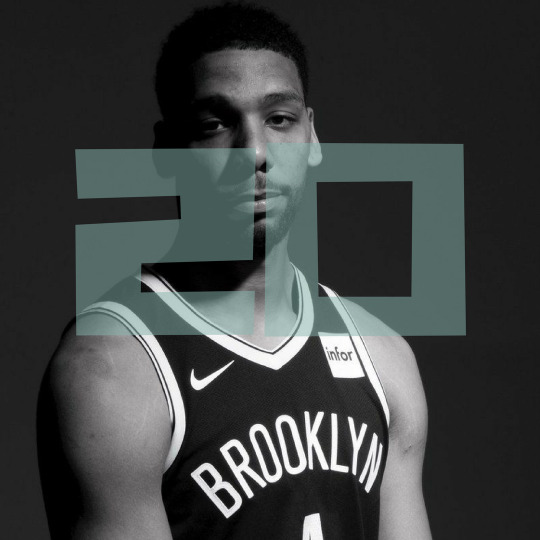
Brooklyn’s Lottery Picks
Everybody’s familiar with the Nets’ questionable trades that made them miss out on every draft in the past years. These very iffy decisions led to the Brooklyn Nets to become known as the worst team in the league. OK, maybe the Sixers were worse, but they’ve become a playoff team (or at least it seems that way) and the Nets are still the Nets.
The good thing about hitting rock bottom is there's no place to go but up. So GM Sean Marks has done a pretty good job at acquiring former lottery picks that somehow didn’t work out with other teams. D’Angelo Russell was the 2nd pick back in 2015, Nik Stauskas was the 8th pick back in 2014 and Jahlil Okafor was the 3rd pick back in 2015. Not a bad trio of draft picks to work around and try to develop along with a very interesting roster of other young talent and very underrated Kenny Atkinson as the head coach.
If they in fact find themselves playing for a playoff spot and having amazing individual performances, this would make them an unbelievable feel good story. Or it could just be a failed experiment like Anthony Bennett.
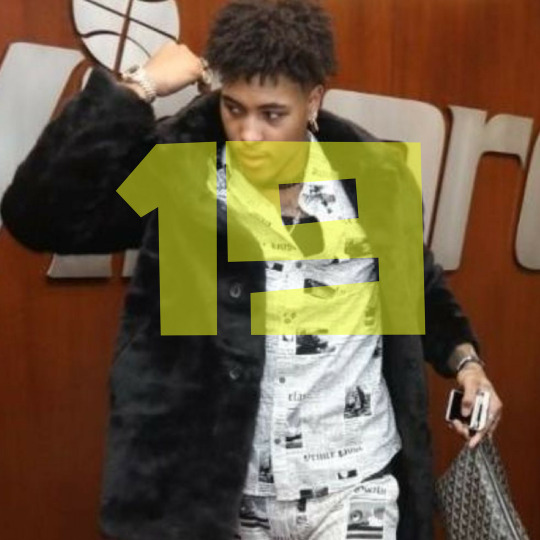
Dress Code? LOL
This might sound like an old man rant butwhat the heck is going on with these ridiculous outfits? I mean I remember when the NBA implemented a dress code because players (mainly Allen Iverson) where dressed too, hum, “hip-hop” I guess would be the term.
I always thought it was a stupid thing to impose on players but when you work in a multi-million dollar company there is such a thing as a dress code, and not abiding by it should result in a fine or you could just get fired.
So I’m pretty sure that everytime David Stern watches these “fashionista” players enter the arena he gets a bad case of diarrhea. Adam Silver seems much cooler about the dress code thing, so go ahead and keep wearing your man dresses and costumes while you can.
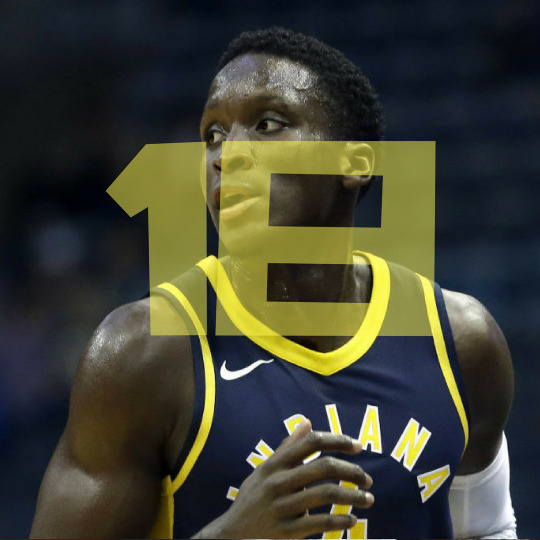
Victor Ol-Star-dipo
I hate to admit this as a Magic fan, but Victor Oladipo is a bonafied All-Star.
One of the most amazing stories this season is how good the Pacers have been, when everybody criticized the Pacers’ deal to send Paul George to OKC and getting the underachieving Oladipo and Sabonis for a legitimate superstar. My best guess is that this fueled them both into becoming key pieces in the great start the Pacers have had so far.
Oladipo is a Hoosier at heart so this feels like the ideal situation for him to thrive and surprise everybody in the NBA, by hopefully making the playoffs, after most experts had them at the bottom of the league fighting for a chance to get a top draft pick. Part of Oladipo’s success has to do with the great coaching of Nate McMillan, and maybe even those very sharp new uniforms they’re rocking this year.

Derrick Rose no more
One of the saddest stories this season is the same story we’ve heard many times and not really a surprising one, either.
Cleveland seemed like the ideal situation for D-Rose to have a limited role and contribute to a winning team along the best player in the NBA right now and a loaded bench. But very early on, Rose got injured yet again and has really taken a toll psychologically to the point his future in the NBA has been questioned not only by everybody in the league but by himself as well.
It’s still not over, but it certainly feels that way. Even if he gets healthy Isaiah Thomas should return relatively soon and with a team as deep as the Cavs, many wonder what D-Rose role would be. So if in fact this is the last we’ve seen of Derrick Rose, it was an absolute pleasure watching this one of a kind superstar that was forced to leave the game way too early.

Free Throws Matter
Fundamentals are boring, but they win games as good free throw shooting teams seem to prove again and again. Bad free throw shooters are liabilities at the end of games, going back to the Shaquille O’Neal days. Nowadays DeAndre Jordan, Andre Roberson, Dwight Howard and others have become historically bad at shooting free throws.
One of the most uplifting stories this season is the fact that the Pistons have become a pretty good team again (good job SVG) and that Andre Drummond, playing a key role in his team’s success, has become a much improved free throw shooter. The secret is a good shooting form and practice, practice, practice. So if Drummond was able to improve from being an embarrassing 38% shooter to a not that terrible 61% shooter, anyone can get better.
0 notes
Text
How to Become the Best in the World at What You Do
It can feel impossible to move toward your dreams. You know exactly what you want to do, but there are endless obstacles in your way.
There is so much competition — thousands or millions of people competing to do exactly what you want to do.
How do you get out of the rat race?
How do you advance quick enough to not have your dreams smashed into submission by society and imploded by “reality”?
How do you make the needed leaps to move beyond the masses vying for a similar position?
After all, you have bills to pay and tons of other responsibilities. You only have a limited amount of time each day. After work and everything else you’ve got going on, it’s easy to justify waiting until tomorrow. Even if you have the raw energy to do your work, you may feel guilty breaking from your relational obligations.
It truly can feel hopeless and overwhelming. There’s so much to learn. It can be easy to doubt our own abilities. Maybe we should just give up and accept reality for what it is?
The Truth Is…
Most of the competition are not hard to surpass. They’re dealing with the same existential and practical challenges you are. Their life isn’t structured for optimal creative expression. They are the primary obstacle in the path. Most will quit long before they ever really begin — always remaining mediocre at what they do.
With a few tweaks, you’ll quickly drop through a wormhole placing you in the top 5–10 percent in your field. The challenge then becomes to move from there to the top — which movement is the real contest. Getting to the top 5–10 percent merely requires a change in lifestyle. Getting to the top 1 percent requires a fundamental change in your being.
How To Boost Your Productivity In a Coworking Space
Coworking is much more than a physical configuration of an office or a workplace definition. While traditional office spaces make it difficult for you to get yourself out of things like office maintenance and huge costs, the most you would need at a coworking space would be your laptop, giving you the time and space to be more efficient and productive.
Be Disciplined
While discipline can be perceived as covering shifts, it certainly means quite the opposite. Discipline is coming to office regularly and spending a good number of productive hours – after all, your office should give you a sense of productivity the minute you step inside.
Know Your Space
Coworking spaces, due to their scale, offer their members access to a lot of facilities that they would not have otherwise – like a Huddle Area, Meeting Rooms, Video Conferencing and secretarial services. These things go a long way in saving you the trouble of spending innumerable resources, and most importantly, your time. At coworking, you can avail yourself of these services, anytime.
Know Your Co-Workers
The core idea of a coworking space is to build a community where people connect, collaborate and create. Build strong relationships with people you’re working with (your coworkers, not just your team). The person sitting right next to you might be your future investor, employee or co-founder!
Know Your Community – Beyond Your Co-Workers
This cannot be stressed enough. Coworking spaces invest a lot of time and resources in organizing high-value events for their community and enabling a community for their members to thrive in.
Attending those events is a great way to gain better access to the community your Coworking Space has to offer.
Personalize Your Space
Many people consider coworking as an interim solution for their office needs, although this perception is slowly losing its credence. Interim or not, it should definitely not stop you from personalizing your space. Being in an extremely social environment, it is at times very crucial to disconnect from what surrounds you, and focus.
At Metspace, Coworking Boutique in Montreal, our mission is to build the premier Collaborative Coworking Community in Montreal for Entrepreneurs, Solopreneurs and Professionals in Development. We believe in providing our Members with the tools necessary to grow, give, and achieve. Coworking Montreal
Curious to see what Met Space Solutions is all about simply book at tour at 514-667-6891 or 1-855-814-2402 to see our see our beautiful co-working offices in Montreal.
Met Space Coworking Space Mongreal offers its members quality amenities and services to create a positive environment to conduct their business. This includes:
Receptionist
Audio / Video
Mail service, with mailing address
Maintenance and cleaning
Café MetSpace “Hub”
A copy of “The 21 Irrefutable Laws of Leadership” by John C. Maxwell
Private offices
Dedicated desk
Conference rooms
Cold calling rooms
Event space rental
Parking
Private phone booth
SO YOU CAN…
• Grow your business
• Develop your leadership skills
• Attend various events designed to propel you and your business
• Thrive in a supportive community
• Connect with peers
• Give back to the community through Breakfast Club of Canada
This post is a framework to quickly get you into the top 5–10 percent of your field so you can begin the real quest of becoming the best at what you do.
Phase One will get you to the top 5–10 percent of your field. Once you’re at this level, you are getting paid enough for your art to live on. This is key, as Paul Graham has said, “Once you cross the threshold of profitability, however low, your runway becomes infinite.” He calls the lowest tier of profitability, “Ramen Profitable,” which means a startup (or business of any sort) makes just enough to pay the founders’ living expenses.
Infinite runway means you can now dedicate all your “work” time to your work. You are no longer moonlighting or squeezing time in the margins of your life. You can pay your bills and eat Ramen. This is where Phase Two begins, and is really the beginning of your artistic journey — becoming the best in the world at what you do.
Let’s begin:
Phase One: Getting To Ramen Profitable (Or Sustainable)
1. Start As An Amateur
Kenzie and Harris were recently married. They had both dropped out of Brigham Young University and were working at the Apple store in downtown Salt Lake City. On the side, they were recording music covers and posting them on YouTube and Vine.
They had enough money in savings to live on a year, so they quit at Apple to make a run at becoming professional musicians. Every day, they would post Vines. For several months, their work went mostly unnoticed. They had a few thousand followers tops.
Then, everything changed. They posted a Vine that immediately went viral. The next day, they were contacted by some of the top Viners as well as agents who gave them contracts. They were now Ramen Profitable, had amazing connections, and on their way to making an amazing career as musicians.
Kenzie and Harris wouldn’t have had their breakthrough if they didn’t start as amateurs. They had some raw talent. But more than anything, they were willing to put themselves out there over and over and over. Quantity became quality. And then they put something out that people loved.
Very few people have the humility to start as amateurs. They procrastinate doing the work they want in the name of perfectionism. You know these people. The one’s who have been saying for years that they’re going to do something but never do. Yet inwardly, they’re terrified of what other people will think of them.
They’re caught in a state of paralysis by analysis — too busy calculating and never reaching a state of flow. Rather than doing work their own way, they do what they think will be well-received — being merely imitators of what is already popular.
2. Get Coaching/Education
Take your dreams seriously. Most people don’t. Take them serious enough to become amazing and move beyond mediocre. Get education and coaching.
“When the student is ready the teacher will appear.” — Buddha
Ever since returning from a two-year mission trip, I’ve always known I wanted to be a writer. However, my dream remained a figment of my imagination until I became serious enough to get a mentor.
I’ve had two mentors that have changed how I write. One of my mentors was a young professor who taught me more in three months than I had learned in the previous four years.
Actually, he taught me more about academic writing and research in three months than most people learn through an entire PhD. With his help, I was easily able to get into the graduate school of my choice.
I started blogging about 21 months ago. Knowing this is something I’m serious about, I decided to get coaching. However, this time, I did it in the form of a virtual online course.
Within a month of taking the course, I wrote a blog post that was read over five million times across multiple outlets and in several languages. This online course was not the reason for my success; but it was an important part of the progression I would inevitably get one way or another.
You’ll know when you’re ready for the next level when you attract the right teacher to help you get there.
3. Stop Living The Broken Rules Everyone Else Is Living
If it’s popular it’s wrong. Most people are mediocre at what they do for a reason. They’re playing by rules that halt optimal performance. They are climbing traditional ladders intended to slow them down and keep them average.
When everyone else is zigging, that’s when you zag. Darren Hardy says you should run “toward the thing everyone else is running from” in order to stand out from the crowd.
As Peter Diamandis says, “The day before something is a breakthrough, it’s a crazy idea.” If what you’re doing doesn’t seem slightly crazy to you, and very crazy to other people, you’re probably following the safe path.
Instead of following the rules set by society, create your own rules. Restructure the game to automate your success. Dismiss the haters, convention, and conformity. Follow your heart and the voice inside you encouraging faith and forward movement. In order to be happy, you must build a lifestyle around being true to yourself. If you’re true to yourself, good things will follow.
4. Be Consistent Until You Have A Break Through Patience.
If you haven’t had your big break yet, keep going. Consistency is the most fundamental virtue to becoming the person you want to be. Almost everyone can sprint for a while. But most burn-out and quit. Everything meaningful in life is a marathon — meant to test your commitment and will.
If this is what you love doing, you’ll do it regardless of the outcome. In fact, obsession with a particular outcome will keep you from attaining your desired results. Your work will be forced rather than organically lived.
There is a natural law known as the compound effect. If you invest a small amount of money consistently, eventually compound interest takes over and growth becomes exponential. The same holds true for any habit, whether good or bad. If you do something long enough, compounding will take effect, momentum will surge, and you’ll begin to experience exponential results.
If you want it bad enough, you will do whatever it takes to make it happen. If you don’t, you won’t. You’ll be willing to reduce time with friends and hobbies, forego sleep, make big asks, take risks, find a mentor, get educated, and look foolish. You’ll be surprised how quickly you become Ramen Profitable when you take your work seriously.
Phase Two: Becoming The Best In The World At What You Do
The person who succumbs to temptation knows far less about its power than the person who resists it. Experience is key. Knowledge only becomes wisdom when it’s properly and consistently applied. Thus, the importance of learning from people who have actually been there, as opposed to sideline spectators. Never take advice from someone you wouldn’t want to switch places with.
Getting to the top 5–10 percent in your field can be done by following principles taught by other people. However, in order to become the best at what you do, at some point you leave it all behind. You become an innovator. A pioneer. An artist.
In order to get to the top 1 percent of performers, you must come up to the razor’s edge — the brink of disaster — where probability of failure is high. At this point, everything you’ve been taught is opposed by what you feel you should do. But your intuition is operating at a higher level.
5. Structure Your Entire Life To Optimize Your Performance
Entering the realm of the best in the world requires becoming holistic about your art. Everything you do matters. Every moment of your life either contributes to or takes away from what you’re trying to accomplish — the food you eat — activities you do — people you spend time with — and how you spend your mornings and evenings.
Most people’s lives are structured in a reactive way. The first thing they do in the morning is check their email or social media. They may even read a good book. But all of these things are highly addictive inputs.
In order to become a creative master, you must focus your efforts on outputsby leveraging your subconscious mind. While you’re away from your work, like sleeping, spending time with friends, or other activities, your subconscious is working through and mulling over the problems you’re trying to solve.
The first thing to do when you wake up is output. This may be in the form of writing in a journal to capture all the work your subconscious has been doing while you were sleeping.
Or immediately getting to the project you’re working on. When you get out of a meeting or finish any form of activity, rather than going directly to your email or other input, maximize your subconscious by going directly to output — your work. Creative and insightful eruptions of intellectual inspiration will flow.
Being healthy and free from physical pain is also crucial for enhanced performance. In his book, The Great Pain Deception, Stephen Ozanich wrote:
“Pain and other chronic symptoms are physical manifestations of unresolved internal conflict. Symptoms surface as the instinctual mechanism for self-survival. They are messages from the inner self wanting to be heard, but ego takes center-stage, and hides the truth within the shadows of the unconscious mind: which is the body.”
In the 1990’s neuroscientist Candice Pert, Ph.D., shared her discovery that the body, not the brain, is the subconscious mind which communicates via neuropeptides. Indeed, human beings are holistic. Our body and mind work in unison.
When we have unresolved tension in our lives, this tension is generally manifest in physical illness. When we clear ourselves of this tension, we allow our body to naturally and organically heal. When our bodies are healthy, we’re far more prone to inspiration.
6. Allow Time For Recovery
Less is more. When you focus on results, rather than being busy, you’re 100 percent ON when you’re working and 100 percent OFF when you’re not. This not only allows you to be present in the moment, but allows you the needed time to rest and recover.
The science if very compelling. Psychological-detachment from work is essential for being engaged while you’re working! Here are other benefits of psychological detachment from work:
If you don’t detach from work, you’re more likely to procrastinate and get fatigued on the job.
Although this is obvious, if you don’t detach from work, you’re less likely to have marital satisfaction.
Your ability to work at a high level is like fitness. If you never took a break between sets, you wouldn’t be able to build strength, stamina, and endurance. However, not all “rest” produces recovery. Certain things are more soothing than others.
Recovering from my work generally consists of writing in my journal, listening to music, spending time with my wife and kids, preparing and eating delicious food, or serving other people.
These things rejuvenate me. They make my work possible, but also meaningful.
7. Have A Pre-Performance Routine That Gets You In Flow
Josh Waitzkin is a genius when it comes to learning and optimal human performance. He was a Chess prodigy as a child — he won five National Championship titles in Tai Chi Chuan — and is now focusing on becoming world-class at Brazilian Jiu Jitsu. He takes the fundamental principles of learning from the ground up and applies them laterally to different disciplines.
In order to “get in the zone,” Josh recommends a Pre-Performance routine. The goal is to reduce stress and anxiety so you can be present. These routines often take 20–60 minutes to put you in the zone. However, Josh recommends incrementally reducing the routine time to the point where simply thinking about it clicks you into the zone.
The purpose of the pre-performance routine is to alter your emotional state. Most people experience emotional resistance before engaging in a task, like say, writing.
That resistance could be a number of negative and suppressed emotions such as fear, uncertainty, and feelings of inadequacy. You don’t want these emotions to influence you while you work. They will negatively influence how you perform.
The pre-performance routine is intended to alter your emotional state to one of courage, peace, acceptance, and love. From these emotional states, your work will be far superior. Without question, how you feel in the moment you do you work determines how well you do.
8. Embrace Fear And Suffering
“The hero and the coward both feel the same thing, but the hero uses his fear, projects it onto his opponent, while the coward runs. It’s the same thing, fear, but it’s what you do with it that matters.” — Cus D’Amato
The idea of fearlessness is a false concept that is imposed by spectators. True performers feel fear and experience suffering. However, they learned to settle-into it like a yoga stretch.
Cycling is a sport notorious for the amount of suffering required. As Tyler Hamilton has said, “I discovered when I went all out, when I put 100 percent of my energy into some intense, impossible task — when my heart was jack-hammering, when lactic acid was sizzling through my muscles — that’s when I felt good, normal, balanced.”
Cyclists often refer to “the pain cave,” which is a mental place they go deeper and deeper into as they’re competing. “I went deeper than I thought I would.” “I was at the limit.” “I was totally pinned.” You often hear phrases like these in interviews after a cycling race.
“Mental resilience is arguably the most critical trait of a world-class performer, and it should be nurtured continuously. Left to my own devices, I am always looking for ways to become more and more psychologically impregnable. When uncomfortable, my instinct is not to avoid the discomfort but to become at peace with it. My instinct is always to seek out challenges asopposed to avoiding them.” — Josh Waitzkin
When you begin feeling uncomfortable, that’s when you start feeling good. That’s when you’re growing. No pain no gain. That’s your happy place. That’s where most people stop. But not you.
9. Do It Because Of Love
In the end, there’s nothing more important than deep connection with humanity. The love you feel for other people is an experience that eclipses all others in life.
So much of training and personal progress is introspective — focused on the self. However, moving outward and focusing on the needs of others provides new meaning for your work. Become the best at what you do, not because of the legacy you’ll leave, but because of the lives you’ll bless.
There is a four stage hierarchy of motivations in psychology.
At stage one, you are motivated by fear. Everything you do is to avoid punishment or negative outcomes. According to decision theory, this form of motivation is prevention focused.
At stage two, you are motivated by reward. Everything you do is to get what you want. If you are religious, you follow the commandments solely for the blessings it provides. If you are in business, you do only that which you believe will get you ahead. Thus, you are promotion focused.
Both stage one and stage two demonstrate extrinsic motivation, which is far less powerful than intrinsic motivation.
At stage three, you are motivated by duty. You’re going to do what you believe you should whether you receive a reward or not. You have no fear of punishment. You are intrinsically motivated. But there’s a lack of passion. There’s a lack of life that will take you beyond human ability and reasoning.
At stage four, you are motivated by love. You have moved beyond worry for your own needs. Your aim is to bring as much joy to each individual as you possibly can. Your love transcends human reasoning. It drives you to do things most would consider crazy. You no longer live by conventional rules or wisdom. You are directed by the highest and purest power in existence.
By Benjamin P. Hardy, Shared from: Medium.com
The post How to Become the Best in the World at What You Do appeared first on metspacesolutions.
from metspacesolutions http://ift.tt/2kA2ff6
0 notes